#user365
Text
Action January II: Captain Blood (1935)

Part One: By the Sword
Fun fact about me: I am a non-classically trained fencer.
By which I mean I went through formal training as a child (starting at 6 or 7), then continued it sporadically through my youth and college. Kept up with it a little after college, but I'm no longer a fencer. Still, it was a pretty prominent part of my life, and one of the more bougie facts about me (of which there are admittedly many; I am, for example, struggling to not type bourgeoisie). I look back on it fondly, but it's not for modern-day me.
Still, I've always had a soft spot for swashbucklers, especially in film. Sure, traditional épée fencing doesn't resemble your typical swashbuckling film fight, even a little bit. Usually, épée with the fencing gear is put in a movie or TV show to demonstrate that the character or establishment practicing it is high-class or rich. Instead, I suppose cinematic swashbuckling is more similar to sabre fencing, which has a larger target zone than épée fencing, and usually involves grander movements...but even then, I've never seen any sabre fencer swing from ropes and rafters like, well...
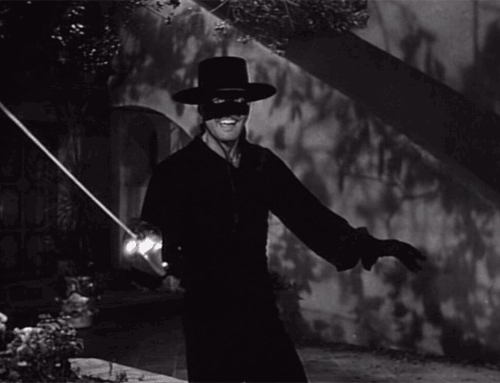
Zorro is a character that I've talked about before on this blog. I've also covered the swashbuckler briefly in that post, but let's get a little more comprehensive this time, shall we? Zorro is maybe the prototypical swashbuckler character, starting with Douglas Fairbanks' epic film The Mark of Zorro in 1920! Yeah, old as hell. He was daring, dashing, and debonair; dressed in black and fighting for justice to get the girl and save the day, armed with only a sword and his wit! The prototypical action hero! Throw in some great choreography and epic music, and voila! A swashbuckler! To put one together properly, we need:
A dashing hero, with devil-may-care attitude that fights for the moral right. If we're talking in DnD terms, you can call this person chaotic good alignment, usually. Swinging from the rafters, a sword in hand and often a smile on their face. And, of course, a romantic aim and goal.
Swordfighting. Kind of critical to the genre. Swashbucklers are films that use swordfights as the driver for the plot. While not every action sequence may involve a sword fight, the main hero is always either armed with their sword or looking for it. And then it's time for the climax, you better believe we've got a big-ass swordfight on our hands. The villain of the piece, at least one of them, should also have a sword in hand.
A sweeping score is a very typical piece of these films. Whether in the past or present, swashbuckling can't be done without an iconic leitmotif for the hero, and battle music times to the clashes of steel. Usually throw some brass or strings in there, and you have a swashbuckling score.
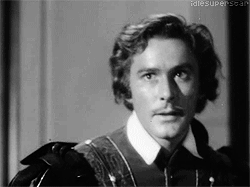
Now, of course, there are a lot of swashbucklers out there based on those definitions, and...yeah, there are a lot of swashbuckler films! While The Mark of Zorro is typically called the first swashbuckler, it's not the first film to involve narrative swordplay by any means. The Count of Monte Cristo (1908) is probably the first of those, but there are others like The Prisoner of Zenda or Kidnapped. You may also notice that some of the classic swashbucklers are based on classic literature, like those above, and like Cyrano de Bergerac, The Scarlet Pimpernel, The Man in the Iron Mask, and the most prominent of these...
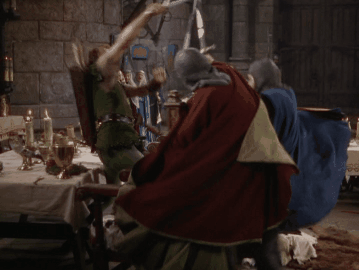
It's funny, for a character best known for his archery skills, Robin Hood gets into a lot of swordfights. Some of the most iconic filmed swordfights come from the emerald archer from Sherwood, and for good reason! There have been countless adaptations of the original stories, which are crazy cinematic, and they all take place in medieval England, during a time period where swords were predominant weaponry. Combine that with the fact that Robin Hood is, in many retellings, a nobleman who would've been trained in fencing, and you have a natural swashbuckler setup!
And honestly, Robin Hood is sort of the perfect swashbuckler. A morally good hero fighting against the evil establishment, for his friends, contrymen, and the woman he loves. Epic music, daring setpieces, classic fights, a lot of swingin' rafters...yeah, it's perfect. And again, one day, I'll talk about The Adventures of Robin Hood from 1938; one of my favorite action films, and my favorite adaptation of Robin Hood for sure.
But there's another type of swashbuckler that's just as iconic as those listed above, also involving a setting conducive to sword-based action, but often with heroes that are...a little more morally grey.
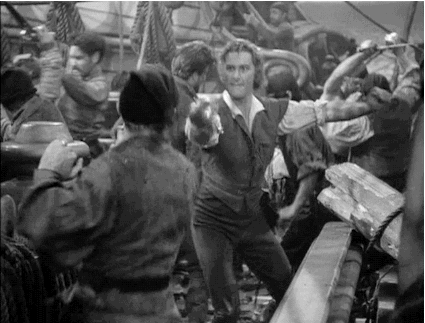
Pirate films are essentially a subgenre of the swashbuckler (yes, a subgenre of a subgenre of a subgenre), focusing on high-seas action rather than fighting in a hall or castle. The pirate film is a curious beast, appearing in film history in sporadic bursts, with no real period to call its own. They were popular from the '30s through the mid-'60s, had a tiny boom in the '80s, got badly nuked in the '90s, and then had another tiny boom in the '00s with the Pirates of the Caribbean franchise. They're always around, but never the first genre you'd think of when you think of action films.
Still, pirate films have an iconic feel to them all their own. The wind in your hair, the daring sword fights against a surly knave or an overzealous government stooge, depending on the nature of your morally dubious hero. Hell, maybe the hero has resorted to piracy after being wronged or lost at sea, and we're rooting for him and his lost honor. Either way, he's got an open shirt and a sword in his hand, and his crew are there to back him up (or betray him; again, depends on the narrative). You know a pirate film when you see one. And that's where I'm headed today: to the open seas with Captain Blood, starring an iconic action star of the 1930s and '40s. In fact, he's so iconic, almost every one of the above GIFs includes him.
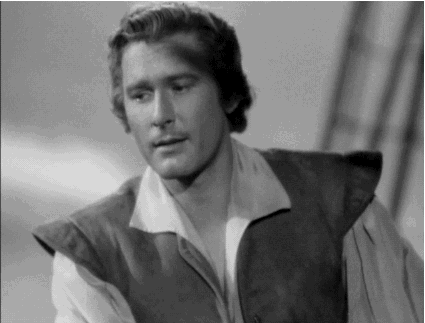
Errol Flynn is undoubtedly a major film figure of his day. He's also got a fascinating and...sometimes troubling personal history, putting him up there with some of the great Australian film actors in cinema. But as much as I'd like to talk about Errol Flynn (and I probably will later), I'd like to finally jump into the film that made him famous: Captain Blood, a 1935 film directed by Michael Curtiz, another interesting figure with some...interesting history with Flynn. Again, more later.
Flynn was an unknown before this role, and immediately became an audience and studio favorite, essentially succeeding Douglas Fairbanks as a films and action star. Only 26 at time this film came out, Captain Blood was the beginning of an often turbulent career for Flynn, who would die at only 50 years old. Again, more on him later. And so, without further ado...SPOILERS AHEAD!!!
Recap

It's 1685 in England, and there's a rebellion happening! Known as the Monmouth Rebellion, it involved the deposition of James II, after succeeding his brother as king of England, which was contested by Parliament and Protestants, as James II was a Catholic king. Anyway, during the rebellion, Doctor Peter Blood (Errol Flynn) is summoned to aid a friend injured in a skirmish. A retired adventurer and swashbuckler in his own right, Blood is determined not to re-enter the...fight...
Is this Commando? Like, where a retired hero is forced to come back to fight for his country, and won't come back until a personal tragedy or offense is done to him? You know, like Commando? Just calling it now, before it happens.
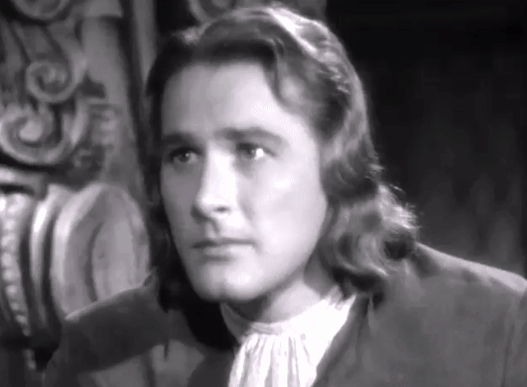
As Blood is helping his friend, he's taken away and sentenced by Judge George Jeffreys (Leonard Mudie), who accuses him of being a liar and traitor to the crown, despite his complete innocence. Imprisoned and set amongst a group of similar prisoners for months, he attempts to defend himself on the stand, only to condemn himself even further beneath a biased kangaroo court. And for the record, Flynn immediately proves why he's so beloved at this time. He's an excellent actor in this scene, and I immediately sympathize with Peter Blood.
Meanwhile, King James II (Vernon Steele) is convinced by his advisor to send the convicts to the West Indies as slaves, as actual slaves are too expensive, and these guys are free of cost. So, yeah, British monarchy not looking too great. In any case, we set to sea for the first time, in the belly of an unrealistically humane slave ship. In Blood's words, the King was "granted their lives in exchange of an uncertain death". And with that, Blood and the convicts are sent o Port Royal, in Jamaica.
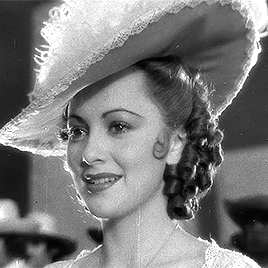
The convicts are set for sale (hate it), and most of them are sold to Colonel Bishop (Lionel Atwill) and his niece, Arabella (Olivia de Havilland). When she observes Blood's rebellious nature at being inspected like cattle, she decides to keep him from working in the mines on her own spoiled whims. Blood's not a fan, and the two immediately clash. Which, obviously, means they're gonna fall in love by the end. Come on, we know how this goes.
Blood's sent to work on the plantation with Bishop's other slaves, on a grinding mill that loves like it's ripped out of Conan the Barbarian. We see the indignity of slavery through...white slaves. Yeah, trying not to think about it, since this is a thing that happened, but it's tough. Anyway, our traitors are taught a lesson about treason, as an escapee is branded on his fucking face, and the prisoners all say how much they hate the fucking King. Great job, James, really fanning the flames of patriotism there.
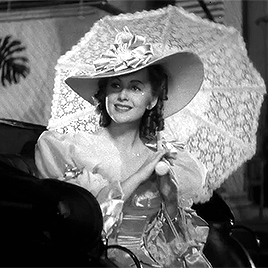
Meanwhile, the uncaring and selfish governor, Steed (George Hassell) is complaining of gout, and is in need of a physician. Knowing of Blood's former profession, Arabella recommends him as Steed's physician, and is mostly elevated from the role of slavery, which seems...insanely easy. Irritatingly easy, even. But whatever; at least he hasn't forgotten his friends, his actual station, or the fact that Arabella bought him for 10 goddamn shillings! He's still understandably bitter about that.
However, he's in very good favor with the governor for relieving his gout, unlike the previous doctors Bronson (Hobart Cavanaugh) and Whacker (Donald Meek), who attempt to plot to get rid of the much more competent Blood. He puts them in their place, but begins a plot of his own. With the other slaves arrested for treason, he plans an escape attempt from Port Royal, with the help of friend (and the guy who got him in this mess to begin with, Jeremy Pitt (Ross Alexander). However, in the process, Colonel Bishop suspects some kind of plan, which is only circumvented with the help of Arabella. In the process, however, Pitt is captured and flogged for questioning.
While his friend is getting horribly whipped by the Colonel on the stockades, Blood and Arabella flirt (as expected), although a kiss from Blood is received poorly due to his status, leaving the encounter on a sour note. Peter goes back to care for the Governor before their escape that night, then finds Jeremy at the stockades and cares for him as well. He's caught by the Colonel showing mercy, and is about to share Jeremy's fate when a ship attacks the port.
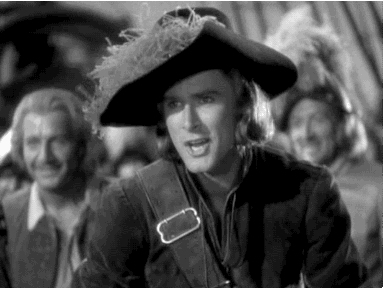
This ship belongs to the Spanish, and the sailors aboard lay waste to the port. It's at this point that the slaves see an opportunity, and make their way to the ships. They take over the Spaniard's ship, and wait until the morning to take out the returning Spaniard captain and soldiers. With navigator Pitt and new gunner Henry Hagthorpe (Guy Kibbee), the new crew sets sale and escapes, under the purview of the new Captain Blood.
Colonel Bishop, like...like a fucking idiot, sails out on a rowboat to thank the men, not realizing it's his own slaves. And then, when he finds out, he still intends to keep them as slaves. THEY HAVE A SHIP, DUDE! You're fucked. Instead of killing him, which they consider, they toss him overboard, and Blood's crew sets sail for the Caribbean Sea, leaving Arabella behind. They abandon their citizenship, and officially become pirates.
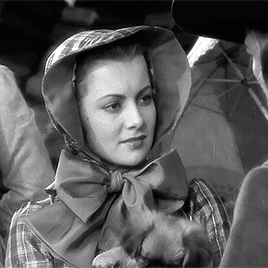
The crew of Blood becomes famed and infamous across the seas, to the irritation of King James II himself. With Governor Steed having lost both money from the Spaniard assault, and being unable to reign in Blood in the first place, his appointment as Governor is given to Colonel Bishop, who swears to take care of Blood once and for all. Arabella is conflicted about this, but she's shipped off to England along with Governor Steed.
On Tortuga, Blood signs a deal with another captain, the French Levasseur (Basil Rathbone), and the two become partner pirates. Later on, Arabella finishes her extended holiday in England, traveling alongside Lord Willoughby (Henry Stephenson), who has been tasked to take out Captain Blood. On their journey, they see Levasseur's ship, which attacks them and takes the passengers hostage on a nearby island. They are soon joined by a surprised Peter Blood and his crew, who pretends not to know her.
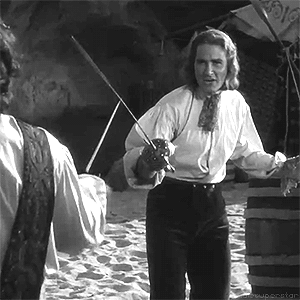
Blood and Levasseur engage in an argument, as one of the articles of their contract was that no female prisoners would be taken. As a compromise, Blood pays for her ransom, both to save her and as payback for his purchase of her many years ago. This still enrages Levasseur, who wanted Arabella for himself, and he forgoes his honor to challenge Blood to a fencing duel. Fun fact, by the way: Basil Rathbone was an actual fencer, classically trained, and far better than anyone he ever fenced with on-screen, Flynn included. But, since he always played the role of a villain and cad, he was always forced to lose. And this fight is no exception.
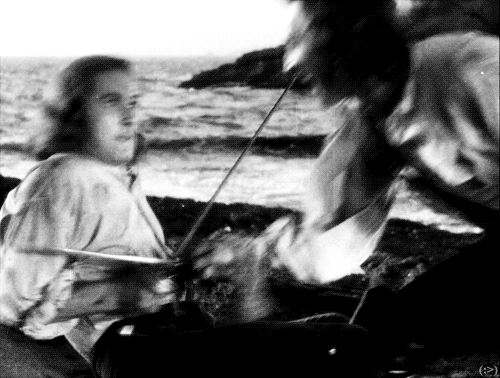
Levasseur is killed by Blood...which is crazy, since he's Basil fucking Rathbone, and he was in this movie for maybe 5 minutes altogether as essentially a cameo, but...c'est la vie, et la mort. Arabella and Willoughby are brought on board, only for Arabella to angrily reject him. And yes, she's absolutely a goddamn hypocrite, but she's not fully unjustified. She puts Blood down as a beast like any other pirate (unfairly, of course), and Blood angrily rebukes her in turn. Even then, he plans to bring the two hostages back to Port Royal, where they are certain to die.
Willoughby and Arabella speak, where he convinces her that Blood's genuinely not a dick, and tells her that they're headed to Port Royal. At the same time, Blood's crew refuses to sail to Port Royal, officially acting in mutiny against Blood. And Blood...gracefully surrenders his command of the ship, admitting his affections for Arabella to be driving him against logic. And that ironically turns the crew back to Blood's command. I can't tell if that was a sign of their actual bond, or some straight gatekeeping-girlbossing-gaslighting from Blood, but...yeah, they're still going to Jamaica.
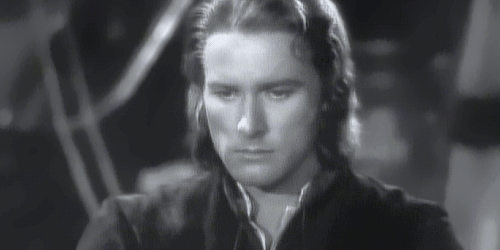
As they approach Port Royal, though, they find it being attacked by two French ships. Willoughby, finally being able to speak with Blood, informs him that France and England are at war. To their surprise, though, Governor Bishop isn't present, nor is the English fleet, since they're out chasing pirates. And so, the only ship to defend Port Royal against the French, is...well, Blood's.
It's then that Willoughby finally reveals his purpose for seeking Blood and his crew: the King has pardoned him. Obviously, they're not a fan of King James II given what he'd done to them, and refuse the offer. But then, Willoughby reveals the other political change: James II is out as King. With that knowledge, Blood and his men decide to fight for the English Navy, and for the new King William III.
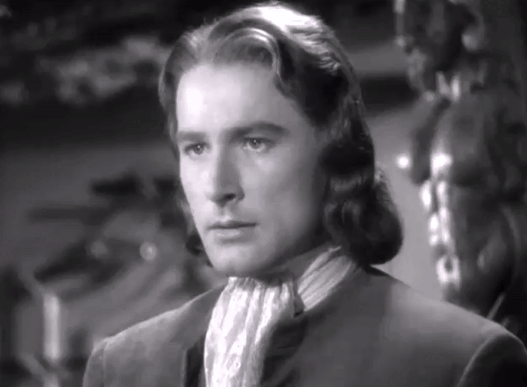
Arabella is shuttled ashore, while the ship sails under a French flag to disguise themselves. They easily ambush the French ships attacking the Port, wrecking one and causing it to fucking explode. Honestly, it's pretty sick. The other ship mounts a harsher assault, and Blood's crew is forced to abandon ship. Instead, they simply take the French ship for themselves. And as the Captain swings over, you realize something: this is the prototypical pirate movie.
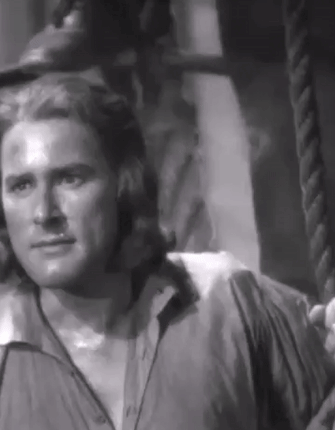
Yeah, OK, earlier films like The Black Pirate, as well as later ones like The Sea Hawk and Treasure Island, would be a major framework for pirate films in the future. But good goddamn, if this doesn't feel like a pirate movie, I don't know what does. The score is sweeping, the action is epic, and it's honestly just fun. And the most ironic thing is, this is happening at the point in the film when they aren't technically pirates anymore! Hilarious.
Anyway, Blood's crew wins the day for England, only for the Governor to finally return from his futile journey. Arabella, seeing Blood return and knowing her uncle's hatred of him, tries to warn him away while admitting her love to him. But to the surprise of her and her uncle, Bishop is officially deposed as Governor for abandoning his post in times of war to pursue his vendetta, even though he knew Willoughby was coming. He's at the mercy of the new Governor: Doctor Peter Blood. Honestly, it's funny as fuck. Blood bids him "Good morning, Uncle.", and the film comes to a close.
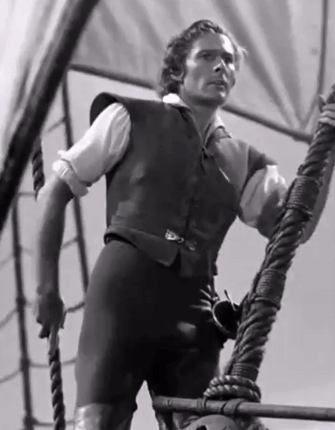
That's it for Captain Blood! Gonna do an old-fashioned review set-up and have a separate post for the Review! And that's because, while the review won't be terribly long...I would really like to talk about the man, the myth, the alcoholic legend himself, Errol Flynn.
See you in the Review!
#user365#365 days 365 movies#365 movies 365 days#365days365movies#365 movie challenge#365 movies a year#action january#action#action movie#swashbuckling#pirate movie#pirates#captain blood#michael curtiz#errol flynn#olivia de havilland#basil rathbone#action genre
8 notes
·
View notes
Text
Romance February: Omnibus

As I prepare for the future of this blog (and there is a future, if anybody's wondering), I find myself looking back at the good times, when I had the time to watch a movie a day and write a blog about it, which...yeah, wasn't even sustainable for me in 2021, so make of that what you will. ANYWAY, I decided that I would bring all of these posts together in an omnibus of sorts, so anybody that wanted to read these posts could find them all easily in one place. This, alongside other archives, are going to be pinned to the top of my page, and will serve as a long index of the films in the appropriate genres. The goal? To extend these archives as I go along, and have this running index for my blog. And again...there will be additions...
SO! With that, feel free to check out these films in the romance genre, which is somewhat...difficult to define, honestly. Romance overlaps with a bunch of other genres, so even films that put the love story at the center of the narrative have more to them by necessity. So, just figure these as films whose narrative is driven primarily by romantic tension and motivation. Any films you'd like to see in this list? Comment, reblog, message me, whatever! I'm always open to suggestions to add to my ever-building master list of romance films. And check out the other indices to come!

Dirty Dancing (1987; dir. Emile Ardolino) (Recap | Review)
Pretty Woman (1990; dir. Garry Marshall) (Recap | Review)
Sleepless in Seattle (1993; dir. Nora Ephron) (Recap | Review)
You’ve Got Mail (1998; dir. Nora Ephron) (Part 1 | Part 2 | Review)
The Notebook (2004; dir. Nick Cassavetes) (Part 1 | Part 2 | Review)
Romeo + Juliet (1996; dir. Baz Luhrmann) (Recap | Review)
Emma. (2020; dir. Autumn de Wilde) (Recap | Review)
The English Patient (1996; dir. Anthony Minghella) (Part 1 | Part 2 | Review)

Doctor Zhivago (1965; dir. David Lean) (Part 1 | Part 2 | Part 3 | Review)
In the Mood for Love (2000; dir. Wong Kar-wai) (Part 1 | Part 2 | Review)
The Bridges of Madison County (1995; dir. Clint Eastwood) (Part 1 | Part 2)
If Beale Street Could Talk (2018; dir. Barry Jenkins) (Part 1 | Part 2 | Review)
Before Sunrise (1995; dir. Richard Linklater) (Part 1 | Part 2 | Review)
Brokeback Mountain (2005; dir. Ang Lee) (Part 1 | Part 2 | Review)
Call Me By Your Name (2017; dir. Luca Guadagnino) (Part 1 | Part 2 | Review)
Carol (2015; dir. Todd Haynes) (Part 1 | Part 2 | Review)
Desert Hearts (1985; dir. Donna Dietch) (Part 1 | Part 2 | Review)
The Danish Girl (2015; dir. Tom Hooper) (Part 1 | Part 2 | Review)
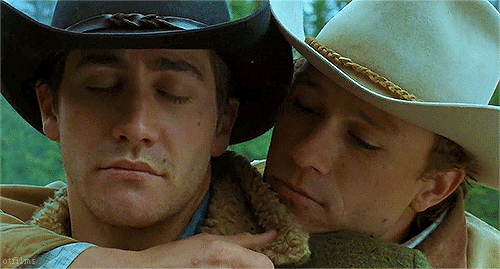
The Phantom of the Opera (2004; dir. Joel Schumacher) (Part 1 | Part 2 | Review)
An Affair to Remember (1957; dir. Leo McCarey) (Part 1 | Part 2 | Review)
The African Queen (1951; dir. John Huston) (Part 1 | Part 2 | Review)
Pillow Talk (1959; dir. Michael Gordon) (Part 1 | Part 2 | Review)
My Girl Friday (1940; dir. Howard Hawks) (Part 1 | Part 2 | Review)
Annie Hall (1977; dir. Woody Allen) (Part 1 | Part 2 | Review)Amélie (2001; dir. Jean-Pierre Jeunet) (Part 1 | Part 2 | Review)
Love Story (1970; dir. Arthur Hiller) (Part 1 | Part 2)
Love, Actually (2003; dir. Richard Curtis) (Part 1 | Part 2)
West Side Story (1961; dir. Robert Wise and Jerome Robbins) (Part 1 | Part 2)
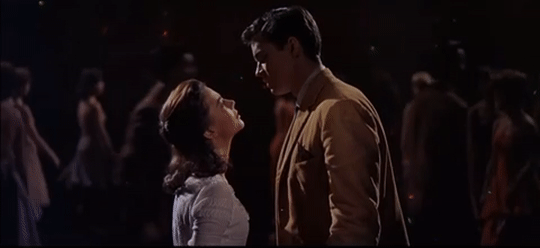
Omnibus: Film Reviews
#user365#365 days 365 movies#365 movie challenge#365 movies a year#365 movies 365 days#romance movies#historical romance#romance#romance genre#love story#romance films#romance february#movie recap#movie review#post archive#west side story#dirty dancing#brokeback mountain#lgbt films
4 notes
·
View notes
Text
Action January: Omnibus
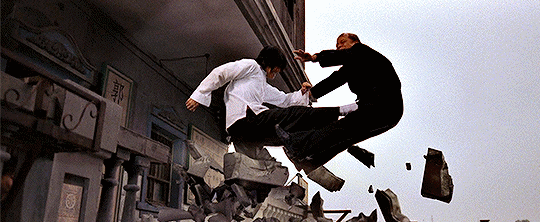
As I prepare for the future of this blog (and there is a future, if anybody's wondering), I find myself looking back at the good times, when I had the time to watch a movie a day and write a blog about it, which...yeah, wasn't even sustainable for me in 2021, so make of that what you will. ANYWAY, I decided that I would bring all of these posts together in an omnibus of sorts, so anybody that wanted to read these posts could find them all easily in one place. This, alongside other archives, are going to be pinned to the top of my page, and will serve as a long index of the films in the appropriate genres. The goal? To extend these archives as I go along, and have this running index for my blog. And again...there will be additions...
SO! With that, feel free to check out these films in the action genre, which remains one of my favorites! Any films you'd like to see in this list? Comment, reblog, message me, whatever! I'm always open to suggestions to add to my ever-building master list. And check out the other indices to come!
Introduction to Action (2021)

Top Gun (1986; dir. Tony Scott) (Part I | Part II | Review)
Mission Impossible (1996; dir. Brian De Palma) (Part I | Part II | Review)
Cliffhanger (1993; dir. Renny Harlin) (Recap | Review)
First Blood (1982; dir. Ted Kotcheff) (Part I | Part II | Review)
The Running Man (1987; dir. Paul Michael Glaser) (Part I | Part II | Review)
Last Action Hero (1993; dir. John McTiernan) (Part I | Part II | Review)
The Nice Guys (2016; dir. Shane Black) (Part I | Part II | Review)
R.E.D. (2010; dir. Robert Schwentke) (Recap | Review)
Kung Fu Hustle (2004; dir. Stephen Chow) (Part I | Part II | Review)
Enter the Dragon (1973; dir. Robert Clouse) (Recap | Review)

Come Drink with Me (1966; dir. King Hu) (Recap | Review)
Crouching Tiger, Hidden Dragon (2000; dir. Ang Lee) (Part I | Part II | Review)
House of Flying Daggers (2004; dir. Zhang Yimou) (Recap | Review)
GoldenEye (1995; dir. Martin Campbell) (Part I | Part II | Review)
Casino Royale (2006; dir. Martin Campbell) (Part I | Part II | Review)
Kingsman: The Secret Service (2014; dir. Matthew Vaughn) (Recap | Review)
Atomic Blonde (2017; dir. David Leitch) (Part I | Part II | Review)
The Mask of Zorro (1998; dir. Johnston McCulley) (Recap | Review)
Léon: The Professional (1994; dir. Luc Besson) (Part I | Part II | Review)
Taken (2006; dir. Luc Besson) (Recap | Review)

The Wages of Fear (1953; dir. Henri-Georges Clouzot) (Recap | Review)
Drive (2011; dir. Nicholas Winding Refn) (Recap | Review)
The Fast and the Furious (2001; dir. Rob Cohen) (Recap | Review)
Speed Racer (2008; dir. The Wachowskis) (Part I | Part II | Review)
The Poseidon Adventure (1972; dir. Ronald Neame) (Recap | Review)
The Expendables (2010; dir. Sylvester Stallone) (Recap | Review)
The Raid: Redemption (2011; dir. Gareth Evans) (Recap | Review)
The Fugitive (1993; dir. Andrew Davis) (Part I | Part II | Review)
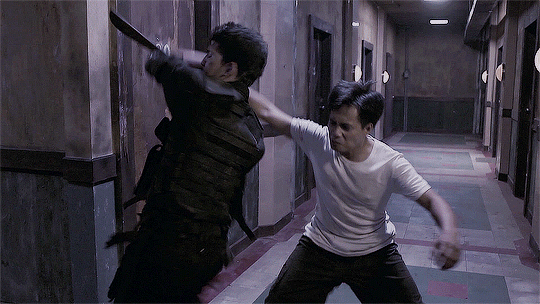
Mad Max (1979; dir. George Miller) (Recap)
Mad Max 2: The Road Warrior (1981; dir. George Miller) (Recap)
Mad Mad Beyond the Thunderdome (1985; dir. George Miller and George Ogilvie) (Recap)
The Mad Max Franchise (Reviews)
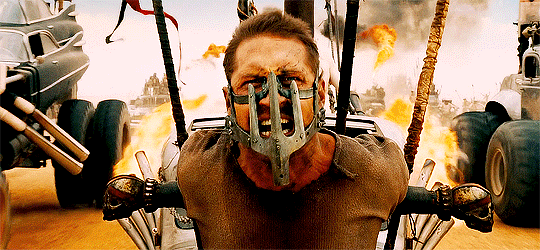
Action January: Summary (2021)
#user365#365 days 365 novies#365days365movies#365 movie challenge#action january#action films#action movies#action genre#action#movie review#movie recap#post archive#top gun#mad max#crouching tiger hidden dragon#drive#the fast and the furious#wuxia
3 notes
·
View notes
Text
Action January II: Captain Blood (1935)
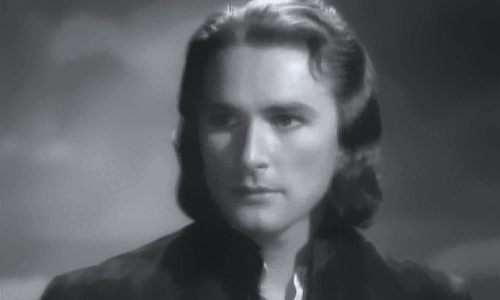
Part Two: A Colorful Fragment in a Drab World
When you think of the Golden Age of Hollywood, it's hard to get more notable than Errol Leslie Thomson Flynn at the height of his career. One of the most prominent leading men of the time period, succeeding Douglas Fairbanks and alongside Clark Gable, he was a mountebank of talent and action. At least...that was a public image of his. The actual Errol Flynn? Genuinely a drunken disease-ridden criminal who maybe exemplifies the idea of dividing the art from the artist. 'Cause, uh...wow. Not a good person, was Flynn.
If you do not care about Errol Flynn, skip to the break; I'll put my five-point review down there so time isn't wasted. I just really want to talk about Errol Flynn. Ready? OK.

Born in Hobart, Tasmania on June 20, 1909, Errol Flynn grew up in a middle class household. His father was a biology professor, while his mother was...well, in his autobiography, Flynn would say that she had "an itch to live - perhaps too much like my own." And given what we know about Errol's "itches", that's saying something. There's some speculation that she was sleeping with a local movie theater manager,leading to Flynn hanging out there often and watching a lot of movies. Is that true? Well, Flynn is a...somewhat unreliable narrator, so take his statements with a grain of salt. He also claimed that he and his mother were descended from some of the soldiers that participated in the famous mutiny on The Bounty, but that's probably not true. However, keep that factoid in mind for later.
Early life was complicated for Flynn, and bad habits emerged early. By the time he was 17, he'd been expelled from 4 schools for inappropriate acts (of violent and sexual natures); he'd joined a local gang; he'd already started his collection of sexually-transmitted diseases with gonorrhea (and he was, uh, quite the collector); and he was working in New Guinea. In New Guinea, he...um...

OK, look here's what you gotta know about Flynn: dude is nasty, in a lot of ways. Most of those ways are, unfortunately, sexual in nature. Since I'd like to be sensitive to the sensibilities of readers, I won't go into every nitty gritty detail. So, starting with his New Guinea adventures, let's just say that he killed a number of native people during colonization efforts, and then did that other classic thing that colonizers have done, historically. You know, that thing that goes with pillaging?
And to be clear, Flynn wasn't ashamed of this. In his autobiography, My Wicked, Wicked Ways, he describes one of the native New Guineans he encounters in...very unfortunate detail. Flynn was a nasty kid, before and after his acting career began. Speaking of which, while he was working in Australia (after fleeing from New Guinea for murder, etc.), he was spotted by director Charles Chauvel, and was offered to be in a film about the mutiny on the Bounty. Crazy coincidence, huh? Errol accepted, and that was his first film, In the Wake of the Bounty, in 1933. It's now disappeared into obscurity, but that was the beginning.

Flynn's career began mostly in the UK, where he acted as extras while getting professional training. Then he threw a stage manager down a flight of stairs and was fired from his repertory company. Because that's Errol Flynn, apparently. He worked on a few more films, married actress Lili Damita, and eventually got the attention of Hollywood. After a couple of small roles, Michael Curtiz tapped him as a 4th choice for his new movie, Captain Blood. Not only was this the first film with Curtiz and Olivia de Havilland (19 at the time), but it was a smash hit. Flynn was a star, the new Douglas Fairbanks!
1936: he works with Curtiz and Olivia again in The Charge of the Light Brigade. 1937: A dramatic role in Green Light, then another swashbuckler in The Prince and the Pauper, a melodrama in Another Dawn, and a comedy in The Perfect Specimen (with Curtiz again), all before acting as a war correspondent during the Spanish Civil War. And then, finally, in 1938, he reunites with Curtiz, Havilland, and Basil Rathbone in my favorite of his films: The Adventures of Robin Hood. And if Flynn was famous before, then that movie really did it.

In the meantime, he gets married to actress Lili Damita in 1935, and this would be the first of 3 marriages. And lemme tell you, it would end tragically for Flynn, hilariously for everybody else. From 1935 to 1939, Flynn's career would take off, and he would work with Curtiz and Havilland a few more times, but things would start to change at this point. See, starting all the way back in The Charge of the Light Brigade, Curtiz and Flynn had regular disagreements. In that film, 25 horses actually died under Curtiz' direction, and the animal-loving Flynn got into a legit fist-fight with his director. And this was the second of seven collaborations together. The two hated each other, but they knew good filmmaking when they saw it. Curtiz' career, by the way, includes Casablanca, just so you know what caliber of director we're talking about.
Flynn's career continued, as did his contentious nature. The Sea Hawk in 1940 continued his career climb, as World War II was in full swing. At the same time, he got badly slapped by co-star Bette Davis (yes, THAT Bette Davis) in the face in The Privates Lives of Elizabeth and Essex during an argument in a scene, which he wrote off as "unrequited romantic interest" (ugh); he had more arguments with Curtiz on Virginia City in 1940, and tried to get him off his own picture; and he co-starred with no-name actor Ronald Reagan in Santa Fe Trail, which is probably the only notable thing that dude ever did.
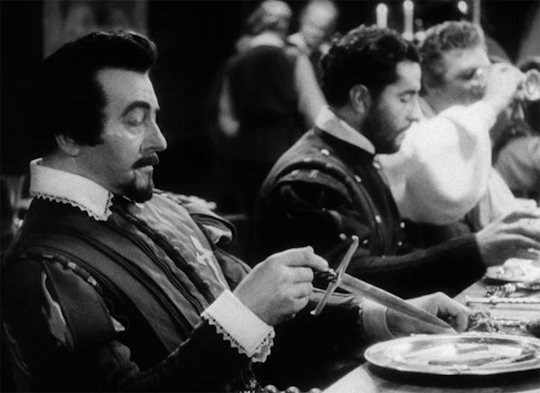
And this, of course, is when the health problems and drinking started. He'd contracted malaria when he was younger in New Guinea, which damaged his heart significantly. And oh, God, the drinking. Flynn was a notorious womanizing, chain-smoking drunk, especially throughout the 1940s. He'd had affairs with everybody (a habit so famous, it's the origin for the phrase "in like Flynn"), and would regularly get into physical fights with everyone else. In the process, he would greatly expand his collection of diseases. By 1942, he had chronic tuberculosis, recurrent malaria, gonorrhea, syphillis, and a host of unrecorded STDs. This, combined with heart damage and back pain, made him ineligible for service during World War II, which had many believing he was a draft dodger (since studios didn't want word of their big star having that many STDs). And that's not all!
See, Lili's getting sick of the whole "constant cheating and STD" thing, so she files for divorce. Said divorce had insane conditions by today's standards, and would essentially had Lili rolling in Errol's money FOR LIFE, while leaving Errol with far less money for the rest of his days. How could this get worse? Easy; he was being sued for statutory r*pe that year as well, and nearly resulted in a 25-year prison sentence. He was acquitted, because Hollywood's always been bullshit, but his reputation was...well, frankly, it was fucked. And at this point, Flynn was only 33 years old. Jesus Christ.

After this, Flynn would never fully recover. Oh, he was still in movies, but his drinking and partying continued, and his reputation somehow got even worse. He would show up blasted to sets, ending his relationships with many directors. His appearance started taking a nosedive due to his health and behaviors. He got married again, in 1943 to Nora Eddington, somehow, but Nora later regretted that marriage. Scandals continued, like the time newspapers found out he'd installed one-way mirrors in his mansion's bathrooms in order to look at his female guests secretly (ew. EW.), and he added hepatitis to his collection of diseases.
Marriage #3 comes along in 1950, and Flynn moves to Europe in 1954 for his films. He's there for a few years, until finally getting a call back in 1957 to star in an adaptation of Hemingway's The Sun Also Rises. Flynn idolized Hemingway, and actually wanted to be an author just like him. Might have accomplished it, if not for the EVERYTHING ELSE he was doing. Still, he accepted the role, which cast him as a pathetic drunk has-been, past his years and prime. What I'm trying to say is, he crushed it. Hard.
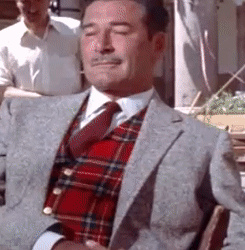
Flynn's back, baby! And now, he's being typecast as a drunk. Which, again, is what he was at this point. Also, I should clarify, alcoholism is absolutely a disease, and my issues with Flynn have nothing to do with the fact that he was an alcoholic. However, he was constantly drunk, that's just a fact. His success in The Sun Also Rises revitalized his career in the late 1950s, and things were looking good. He even started up his old journalism ambitions when he traveled to Cuba during Castro's revolution, and was the only journalist there when Castro won.
In 1959, though, Flynn's financial difficulties had become too much, even with his career rebirth. He went to Canada to sell a yacht to a guy, then flew back to Los Angeles on October 14. In the process, his back and legs started acting up. Not unusual for him. The doctor in LA noted that Flynn could barely walk up the stairs, then gave him some Demerol, a massage, and good conversation. Flynn said he "felt ever so much better", and the doctor left. A 17-year-old girl that had been traveling with him (yeah, that sounds horrible) went in to check on him 20 minutes later.

Errol Flynn died on October 14, 1959, at the age of 50. His cause of death was found as a heart attack from coronary thrombosis, atherosclerosis, and severe cirrhosis of the liver, amongst the STDs that plagued him his entire life. Flynn was buried with six bottles of his favorite whiskey at Forest Lawn Memorial Park Cemetery in Glendale, California. He had once said he hated this place, and never wanted to be buried there, so you gotta imagine that his current marriage wasn't going great either. Jesus.
But even after he died, Flynn's legacy continued to degrade. His autobiography came out, which didn't really help him image much. His work as a war correspondent was put into question as illegitimate, and thought to be used only to promote his films. That 17 year old that discovered his death revealed that yes, that sentence was as creepy as it sounded, and Flynn never learned his FUCKING LESSION. He was also possibly outed as bisexual, which is obviously fine (assuming the bisexual community wants to claim this asshole at all), and I only point this out to say that he was described as "super-straight" by Iron Eyes Cody. And who's Iron Eyes Cody? Trust me. Look him up. You don't wanna trust a goddamn word that dude said.

So, with all of that bullshit said and finally done...Errol Flynn was still an excellent actor. Yeah, I honestly mean that. IN fact, I'll elaborate in a minute here in the review below. So, read on if you're interested in that. And if not, honestly, watch Captain Blood and The Adventures of Robin Hood yourself, and make your own opinions. Just saying, he could act. Separate the art from the artist, people.
Review
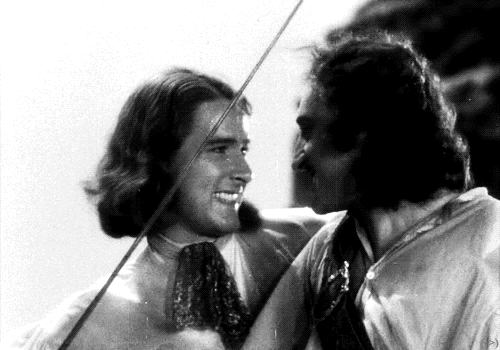
Cast and Acting: 9/10
Just to get our leading man out of the way, Errol Flynn is fantastic in this movie. I mean it; for a guy who'd barely been in movies, and for this being his first leading role, he knocks it out of the park. Suave and debonair, defiant and headstrong when he needs to be, and someone you're charmed by as much as the characters on screen are. Plus, the swashbuckling is fun to watch, and credit should go to Flynn for some of that. Genuinely a star in the making; just forget all that other stuff from above, OK?
And everybody else? Olivia de Havilland, who's only 18 during filming, by the way, is also great in this movie. And again, this is one of her first films. Crazy, huh? Her role is uncomplicated, but she plays it very well! Basil Rathbone isn't in here for long, but he's a scene-stealer...partially because his French accent feels forced, and he's maybe a little over the top. Still, extremely fun to watch. Same could be said for Lionel Atwill, although he sort-of just drops off in the middle of the picture, when he could've been a real commanding antagonist. Missed opportunity, that one. As for the pirate crew, like Ross Alexander and Guy Kibbee, they're not bad! Meant in some cases to be comic relief, which is done well, but also portrayed as a loyal and faithful crew. Throw all of these performances together, and you get my final score. Solid all around, with a little scenery-chewing here and there.
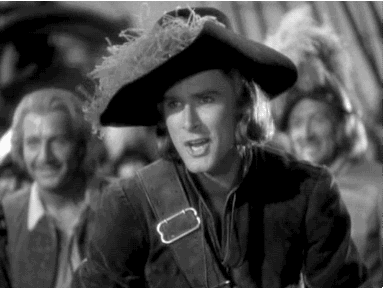
Plot and Writing: 8/10
Honestly, this is both a standard swashbuckling plot (man of high-standing gets plunged into low-standing, then fights his way back to prowess via sword and fisticuffs), but also very different in some ways. It's based off of a novel by Rafael Sabatini, and certainly has a memorable and easy to describe story. However...and this is a soft however...Blood's gonna win. It's not the least predictable plot in the world, since you know Blood's gonna win and get the girl in the end. It also has a surprisingly bloodless ending, all things considered. Yeah, I know there's the battle with the French in the end there, but only one named cast member (Basil Rathbone) actually dies. It's fun to watch and easy to recall, but...kinda toothless in the end. Also, Blood is a bit of a Gary Stu most of the time, which isn't the best character work you can do.
Writing by Casey Robinson, though, is still fantastic. This is a SOLID adaptation of the book, from what I can tell, and Robinson manages to spice up a standard plot with some entertaining and engaging writing throughout. Honestly, this is a fun movie, and the writing helps with that quite a bit. Even got the Oscar nomination that year for Best Screenplay, but lost to The Informer. In fact, it technically wasn't officially nominated by the committee, but was instead nominated by write-in. That is how popular this film's writing was.
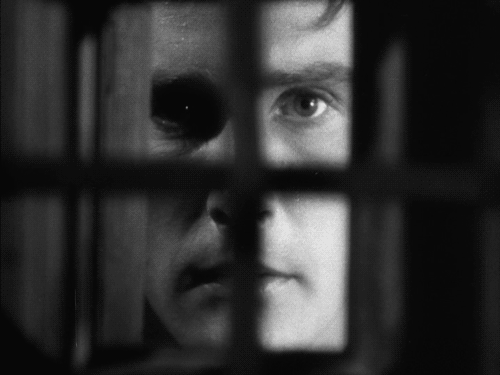
Direction and Cinematography: 9/10
Michael Curtiz, frankly, is a legend. And sure, I can't say this is a groundbreaking film in terms of direction in some ways, but good goddamn, does Curtiz still do an excellent job. This is especially notable when looking at the action scenes, like the beach swordfight, or the siege on the French ships (as seen in the GIF below). Seriously, though, this is a great-looking film, both due to legendary director and legendary cinematographers Ernest Haller and Hal Mohr. The former is best known for Gone With the Wind (I hate that movie, but it's admittedly gorgeously shot), while the latter is known for The Phantom of the Opera and...The Jazz Singer. Ooh. Yikes. Moving on!

Production and Set Design: 9/10
Again, kind of standard fare for the time period in some ways, but still a great looking production! You feel like you're on a ship or tropical island for most of the film, despite the entire film being made in California. That ending scene with the French ships? 2,500 extras were in that sequence, making it one of the biggest films ever made at that time. This is impressive production, including the prop work and...well, OK, one problem. The costumes are mildly anachronistic. It's nothing crazy, but keep in mind that this film is meant to take place in the 1650s. With that in mind, this feels far more like a film from the 1800s instead. This is a minor nitpick, but a nitpick nonetheless. Frankly, I've really had to try and find flaws with some of this stuff, because this film is genuinely great.
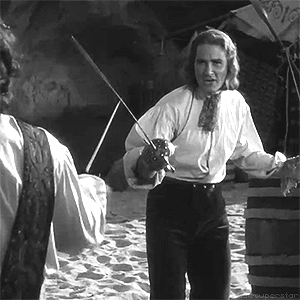
Music and Editing: 9/10
Music here is by Erich Wolfgang Korngold, another film legend and notable composer. His career very much followed Errol Flynn, as this was his first huge picture (not counting 1933's A Midsummer Night's Dream), and he would also score for The Adventures of Robin Hood, The Sea Hawk, and The Private Lives of Elizabeth and Essex. This booming brass score is your stereotypical swashbuckler tune, meaning that Korngold helped create that stereotype in the first place. It's iconic, it's memorable, and it makes for solid background in a action scene. Even did that thing where the sword-clashes are timed with music sometimes! Again, classic.
George Amy is our editor for this picture, and he's a legend in his own right. A powerhouse for Warner Brothers, Amy was a favorite of Michael Curtiz, and ended up editing the majority of his films (but not Casablanca, funnily enough). He definitely does well here, although I felt like one or two sequences could use a little trim here and there. Nothing really felt unnecessary, but there could have been a little something different in the near-mutiny sequence, for example. That sequence is maybe the weirdest in the film for me, as Blood sort-of gaslights the crew into following him into certain fucking death. Again, kind of a nitpick for me, but it did affect how I saw Blood, and maybe could've been changed to adjust the pacing of the scene.
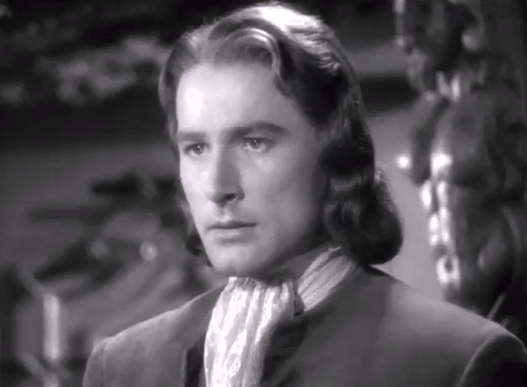
Verdict: 88%
Pretty sure I've hurt some critic's feelings with that number, so I feel the need to clarify something: this movie's goddamn great. It's the progenitor of the swashbuckling genre for a reason, after all. This is a crazy fun film, but I won't give it an excuse because it's a classic. But would I watch this movie again? Absolutely. Like I said, a hell of a lot of fun.
Time for another classic action-adventure movie to continue the classics train, but let's jump forward a decade for this one, huh? Post World War II, classic director, and a precursor to the true action genre. And as always, one that's been on my list for a long time.

Next: The Treasure of the Sierra Madre (1948);
dir. John Huston
#user365#365 days 365 movies#365 movie challenge#365 movies 365 days#365 movies a year#365days365movies#action january#action#swashbuckling#action movie#pirate movie#errol flynn#captain blood#michael curtiz#olivia de havilland#basil rathbone#biography#action genre
3 notes
·
View notes
Text
January 1, 2024: The Great Train Robbery (1903)
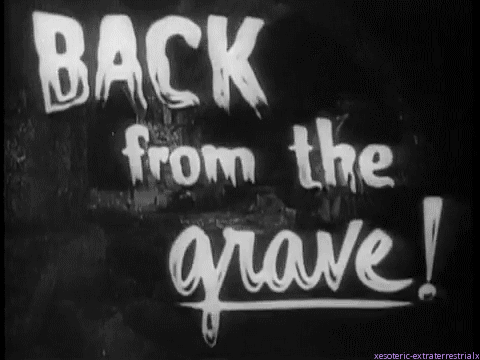
I LIIIIIIIIIIIIIIIVE
So. It's been a while. Life has been busy for the last couple of years, lemme tell you. I love this blog and I love movies, but writing can be...time-consuming for me. Anyway, I figure, why not start this whole thing over again, huh? Well, mostly. Am I gonna get to 365 movies this year? Frankly, that's unlikely, for a number of reasons. BUT! I can at least start small. And, since doing action films in January is a bit of a blast from the past...why not go all the way back this time? Plus, hey - it's a good way for me to get back into the swing of things.
Film history time!
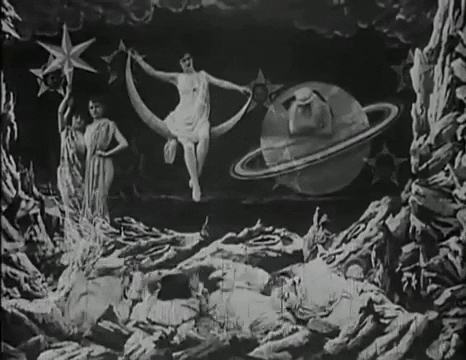
Without going too far into it, the modern film industry began in the 1890s. The first moving pictures were mostly short documentaries, showing live as captured through multiple successive images. L'arrivée d'un train en gare de La Ciotat is often called the first film publicly shown, but that's a misconception. What is true, however, is that the film was made by two luminaries in film history: the Lumiere brothers. Their invention, the cinématographe, was essentially an early film camera, and the brothers used it to document real life.
However, for every good 19th century inventor, there's got to be a rival. And honestly, when you're talking about the 1890s, there's only one real rival to speak of for a given inventor: the Wizard of Menlo Park.
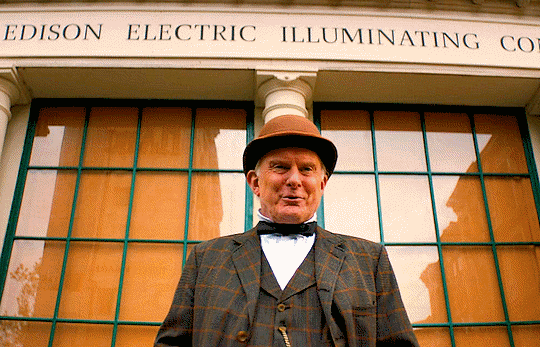
Edison, of course, is legendarily one of the biggest assholes in American history. However, to his credit, the man was genuinely brilliant. Coming up with or perfecting various contraptions and inventions, Edison was a dynamo. In 1889, he had the idea for a device that could capture and display visuals to accompany sounds from the phonograph (which he'd, of course, invented). He had a member of his think tank, William Kennedy Dickson, develop the device, and they created their own early video camera of sorts. With the combination of these two teams, amongst others here and there, the first films began distribution around 1893.
However, again, these were mostly capturing real-life footage. The first narrative films began around 1896, likely with La Fée aux Choux in that year. A minute-long film, this is arguably the first non-documentary to be produced, and would be the first of a new industry. And, fun fact, the first film to be directed by a woman, Alice Guy! After this, the Edison Manufacturing Company released the first commercially available film, The Kiss, and made buckets of cash. The film industry is born.
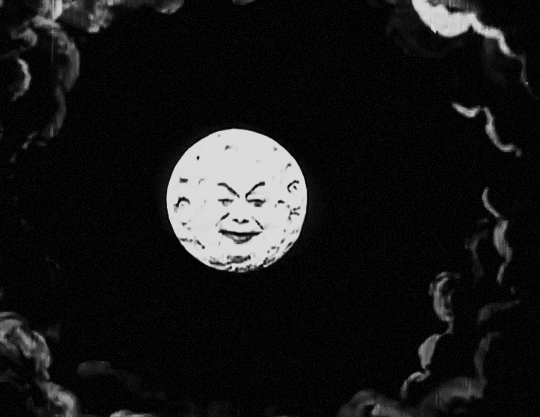
But to really hit the head on narrative film, you have to go back to France. There, illusionist Marie-Georges-Jean Méliès expanded the genre with creative sets and productions that took film into the realm of the fantastic. Inventing a number of basic tricks like dissolves and multiple exposures, Georges is the true pioneer of early film. His 1902 film, Le Voyage Dans La Lune (you know, the one where they land a ship in the Moon's eye) is considered a classic to this day, amongst other Méliès staples like Cendrillon and Le Manoir du Diable.
However, Georges isn't alone. The UK has a slew of filmakers entering the scene with their own efforts, while in the US, Edison's company is continuing their work as well. Most prominently for this story, perhaps, is the work of one of Edison's early cameramen, and therefore one of his first directors, Edwin S. Porter. Porter started with Edison in 1901, and was one of the first real film scholars. Taking from the other prominent directors of the day, he injected craft into the films he worked on for the company. At this point, one of the big things in American cinema was the brand new Western genre.
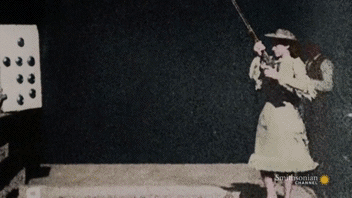
This is the point to clear up a bit of a misconception about Western films: The Great Train Robbery was in no way the first one. OK, so, the Western has its origins in Wild West shows, like Buffalo Bill's Wild West, which would travel around the world to show off the adventure and action of the American West. In fact, that GIF up above is Annie Oakley, who was filmed by Edison's Kinetoscope as an early film doing her sharpshooting act, which was a part of the show! Anyway, these exhibitions also traveled to the UK, where they made a massive impact. America was the land of the Wild West, and it arguably wouldn't shake that image until around World War II.
Because of this, the first Western films were actually filmed in England, not the United States! The first was Kidnapping by Indians in 1899, followed by A Daring Daylight Burglary in 1903. That film in particular inspired Potter, alongside an 1896 play called The Great Train Robbery, to make...well, you read the title of the review. That film is sometimes called the first Western film by mistake, but is usually forgotten in favor of Porter's film. In any case, though, the Western genre was born in the silent film era.
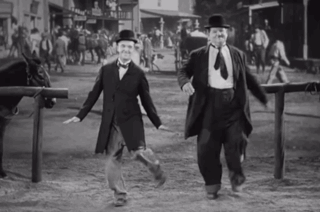
From that point, of course, history is made. Stars like Tom Mix, John Wayne, and Jay Silverheels make their way into the public zeitgeist. Characters like Bronco Billy, or the Lone Ranger and Tonto become household names. Classic films like Stagecoach and more bring the genre to new heights, while even comedians like Laurel and Hardy (above) get into the game with Way Out West. Even actual Western figures like Wyatt Earp became a part of the industry briefly, consulting on how things were in those wild days. It was a new dawn for film, and a unique era.
Of course, I've talked about Westerns before. Didn't get to cover much that month, but I covered a few films like Stagecoach. I even got some facts wrong in that recap about the first Western! Go figure. Anyway, that's a brief history of the Western film genre up to this point. But why cover this now? Well, this is also, for all intents and purposes, one of the first action films in cinema history. Ironically, the idea of action on screen would kick off an entirely different genre. Rather than spinning off into the Western, which became its own thing, the first iteration of the action genre was the adventure film, and guns were supplanted by another weapon.
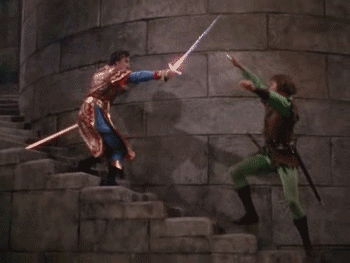
...I really wanna talk about this film on this blog, because I adore it so much. Anyway, the swashbuckler was the next real action film genre to emerge, but that's a question for the next review, I think. In the meantime, let's get to The Great Train Robbery! This post is a little bit of a return to form for me, writing a recap and review with my 5 categories of criticism. This format might not be maintained with every film I talk about this year (however many that'll be), but I'll play it by ear depending on the film! And, so, without further ado...
SPOILERS AHEAD!!!
Recap
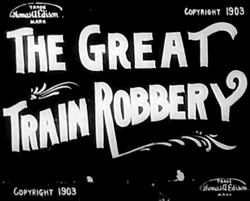
This recap is gonna be kinda weird, since as far as I can tell...there are no dialogue cards in this movie. A lot of what I'm writing here is a combination of inference and observation, as well as coordinating it with other synopses online after I'm done writing. So, yeah, this is an interesting one. Completely silent, as well.
A pair of bandits enter the room of a telegraph office, holding the clerk at gunpoint, and ordering him to write a missive of some kind before tying him up. The entire team of four bandits wait outside of the water tower used to refuel this old steam train, then sneak aboard. They immediately enter a firefight with a mail clerk on the train (who's apparently packing, damn), and kill him, then use a stick of dynamite to open a box that I assume contains valuables.
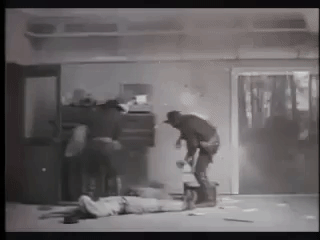
Two of the bandits climb to the top of the train, where one has a fist-fight with the fireman and...throws him off the train, damn! It's a dramatic throw, too. Anyway, once this happens, the train stops, and the bandits hold the passengers hostage aboard the train as the engine car is disconnected. The passengers are held up for their belongings, and...Jesus, guys, there are a LOT more of you than there are of the gunmen! Somebody just jump one of 'em!
Well, as if to answer my question, one of the passengers tries to run away, and gets shot in the back for his trouble. So, yeah, OK, I see the risk, but...I dunno, they only have so many bullets, I think you guys could take 'em. Anyway, the bandits escape, and the passengers immediately tend to the one who was shot. The bandits board the engine car and take off with their loot.
The party escapes into the woods a-ways down the train tracks, and meets up with their waiting horses. Meanwhile, the operator back at the station manages to get up and send out a message. His young daughter walks in and VERY smartly cuts her dad loose, making her the official hero of the film. She wakes him up, and we cut back to a dance party attended by some local lawmen. We get that Western trope where the lawmen shoot at a guy's feet to get him to dance, leading me to wonder if this is where that trope comes from?
The operator bursts in and tells the group of the trouble. They ride out to confront the bandits on horseback, but one of them gets shot in the process. Eventually, this leads to an all-out brawl in the woods, where the bandits are cut down as they count their loot. Good guys win, and the entire film ends with this classic shot of one of the bandits.
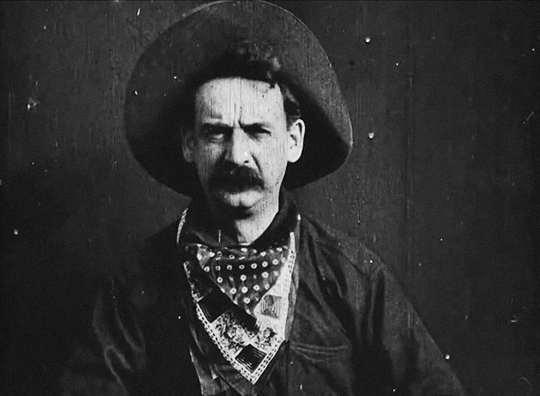
Review
So! Can I even review this one the way I would normally? I mean, probably; short films and silent films are still both films, after all, so it's not like it doesn't qualify. But there are some things obviously missing, or that need to be taken into context here. So, to go through it via bullet point method:
Cast and Acting - 7/10: Well, the actors are mostly forgotten, sorry to say; and while we know their names, none of them were actually credited in the film. The main character is arguably the bandit leader, as played by Justus Barnes, and possibly Gilbert Anderson as a few characters (including the dancer in the dance hall and the shot passenger), and Robert Milasch as the tied-up clerk (I think). Plus, it has arguably the first child actor in the form of Marie Snow, but that may need to be fact-checked. Still, they were all fine, especially for the time. Acting for no audience was sort of a new thing, after all. Hard to judge, this one.
Plot and Writing - 8/10: Hey, there is a plot, even if there's not really writing beyond a screenplay. Our writers here are director Edwin S. Porter and Scott Marble, who wrote the play this was based on. And for what it's worth, it's a simple plot. Men rob train, men get stopped. That's it. Not exactly Primer, this one.
Directing and Cinematography - 8/10: For what it's worth, I think Edwin S. Porter did a decent job in this outing. Again, this is a new doctrine entirely, so it's not like we're gonna find much creativity in either category here. Hell, according to some angles, Porter technically invented the concept of direction, but that's a very nuanced take on his role. At this point, directing just meant pointing the camera. Cinematographer (and yes, there was one) J. Blair Smith also did fine, as far as I'm concerned. Plus, hey...that last shot is iconic.
Production and Set Design - 9/10: Honestly, felt like I was watching a train robbery. So, it may feel a little Party City in terms of the bandit and lawmen costumes, but it also was authentic, so...yeah, high marks for this one.
Editing - 9/10: Normally, of course, I'd put music in this category, but...well, there's no music. So, it falls to editor...uh...oh. Shit. Wait, there's no actual editor for this one? I guess the closest I can get is Edwin S. Porter, who really carried this film. And there is editing, there has to be. After all, it managed to tell a story with literally no dialogue. No cards, no mouthed word, no music, nothin'. And yeah, I really wish that first or last one was in here at least, but the film still works without it.
So, yeah, in the end, that's an 84% for me! Which is probably causing some elderly film critic's tenderly cared-for stress-rage aneurysm to finally pop, but hey - it's how I feel. Great piece of history, completely free, and required cinephile viewing! Just go to Wikipedia or the Library of Congress.
OK, with that short-fill warm-up finally done, let's proceed through action film history! Good to be back!
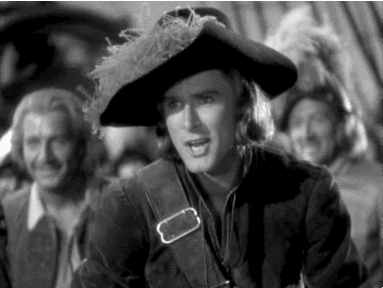
Next: Captain Blood (1935); dir. Michael Curtiz
#user365#365 days 365 movies#365 movies 365 days#365 movie challenge#action january#action#action movie#western#western film#action film#action genre#edwin s porter#edwin s. porter#the great train robbery#the great train robbery 1903#365days365movies#silent film
5 notes
·
View notes
Text
31 (Films) to Life: End of Year Round-Up I

Well, here we are: the start of another year of movies!
Geez, 2022 was interesting. Changed up the format from doing daily films and monthly genres, and focused mostly on films in one genre: crime. Aimed for 31 films, and out of that goal hit...24. Which, honestly, not too shabby. Didn't get as many reviews out as intended, but that is honestly OK. Was a busy-as-hell year for me, so I'm pretty well satisfied.
So, what did I see last year, exactly? Well, this post is about to be a round-up, which includes the films I wrote about, and the ones I didn't get the chance to. And at the end, I'll get into my plans for 2023. So, before I hit the "Keep Reading" button, here's the full list of crime films I saw in 2022.
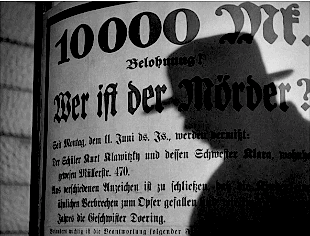
M (1931); directed by Fritz Lang
The Maltese Falcon (1941); directed by John Huston
The Third Man (1949); directed by Carol Reed
Rashomon (1950); directed by Akira Kurosawa
The Killing (1956); directed by Stanley Kubrick
Cool Hand Luke (1967); directed by Stuart Rosenberg
The Italian Job (1969); directed by Peter Collinson
The Godfather (1972); directed by Francis Ford Coppola
Chinatown (1974); directed by Roman Polanski)
Dog Day Afternoon (1975); directed by Sidney Lumet
Taxi Driver (1976); directed by Martin Scorcese
Scarface (1983); directed by Brian de Palma
Once Upon a Time in America (1984); directed by Martin Scorcese
Thelma and Louise (1991); directed by Ridley Scott
Reservoir Dogs (1992); directed by Quentin Tarantino
Casino (1995); directed by Martin Scorcese
Heat (1995); directed by Michael Mann
The Usual Suspects (1995); directed by Bryan Singer
L.A. Confidential (1997); directed by Curtis Hanson
American Psycho (2000); directed by Mary Harron
Catch Me if You Can (2002); directed by Stephen Spielberg
Monster (2003); directed by Patty Jenkins
The Departed (2006); directed by Martin Scorcese
Zodiac (2007); directed by David Fincher
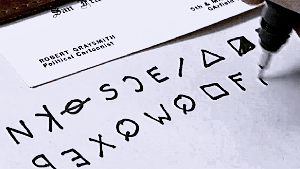
And there you have it! Now, this upcoming short set of summaries (behind the Keep Reading wall) may be a little too long for one post, so we'll split it up a little bit. But in any case, let's get this started!
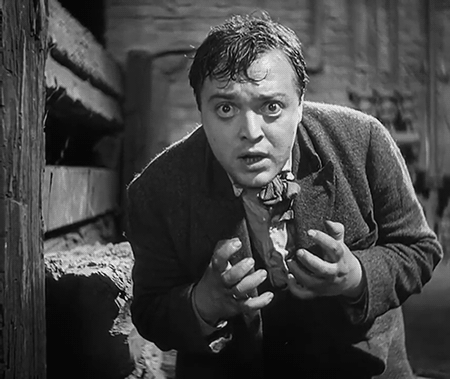
M (1931), dir. Fritz Lang - 92%
This one, you can check out my full recap and essay about if you're curious, but here's the summary: I loved this movie. Lorre's brilliant as the titular killer, the simple story is well-constructed and effective, the ending is beautiful, and the film as a whole is so impactful. Direction and shot composition is top-notch, the sound and music usage is genuinely revolutionary (having essentially invented the leitmotif), and while it's not the most iconic-looking film, it's still brilliant. PLEASE check this movie out if you haven't already.
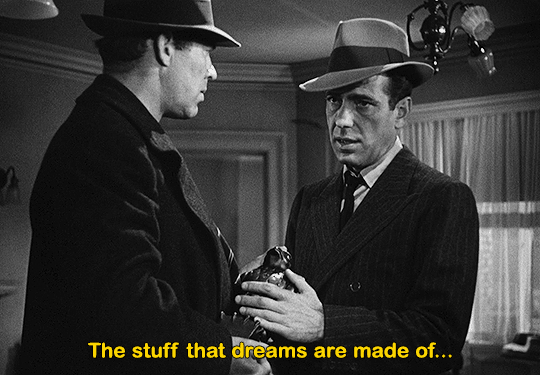
The Maltese Falcon (1941), dir. John Huston - 92%
Holy shit, I forgot I tried writing that whole review in noir-speak. Anyway, here's another classic film that I really like! Haven't seen many noir films, especially prior to this year, but this was a great one to start with. Definitely the prototypical noir detective movie, complete with Bogart's private eye, Astor's dangerous love interest, and the twists and turns that come with the genre. Beautifully shot, excellent plot and writing, wonderful music, and great acting. No complaints; check this one out.
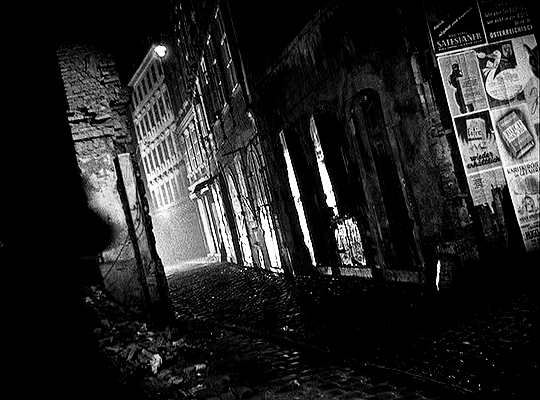
The Third Man (1949); dir. Carol Reed - 96%
Holy shit, this movie! Absolutely my favorite Orson Welles performance, and that very much includes Citizen Kane. He's extremely good in this movie, which is a sort of non-traditional noir in a number of ways. The cast is perfect, from Cotten to Valli to Howard to Welles (especially the last one). Plot is perfect, and contains more twists than I know what to do with. Directing is great, if a little overly-tilted at times. Production and art design is beautiful. Music is...a lot of zither music. It's...it's a LOT of zither music. As I'm typing this, the score is BACK IN MY HEAD, and I haven't seen this film in 10 months. Let that shit sink in. And yeah, watch this movie, ASAP, please. You won't regret it, I promise you that.
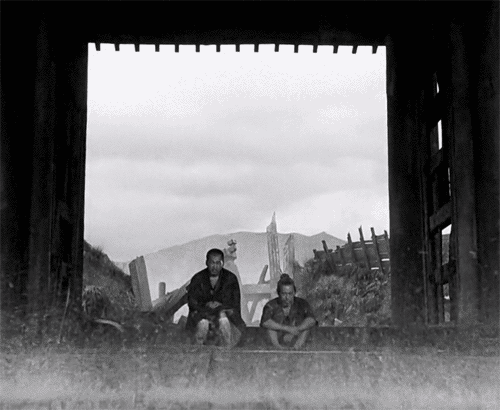
Rashomon (1950); dir. Akira Kurosawa - 100%
It's a perfect movie. A trope-maker, and revolutionary film in its own right, this movie...dear shit, this fuckin' movie. No words. Nothing needed. Just trust me when I say watch this film immediately. It's stellar. Man, I hit a lot of bangers early on this year.
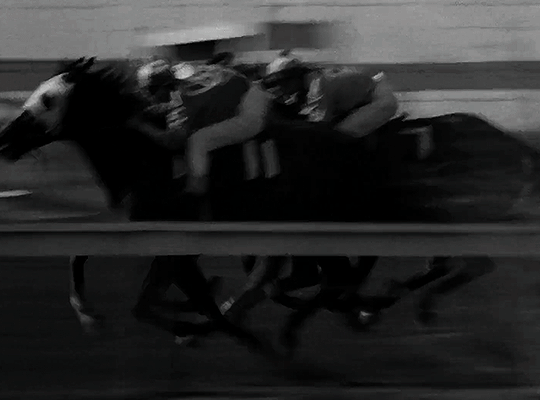
The Killing (1956); dir. Stanley Kubrick - 90%
First of all, before anything else...fuck Sherry. And secondly, this movie is a great one, too. Still have more Kubrick movies to watch, but this one was absolutely worth it. Nail-biting and anxiety-inducing, yes, but also with one of the strongest plots I've seen thus far this year. A fantastic heist movie, it's only real weak points are a kinda normal production and art design, and sorta forgettable music. Other than that, it's an amazing film that people don't talk about. And, honestly, they really should. Check this one out if you're into heist movies and classic films!

Cool Hand Luke (1967); dir. Stuart Rosenberg - 90%
First one of these I didn't post a review on! And honestly...yeah, I'm OK with that. This Paul Newman vehicle is complicated to describe. On one hand, it's an interesting character study full of interesting characters. Newman's Luke is a great example of a rebellious character forced to face consequences for his actions, only to revert to his original nature, Frog and the Scorpion style. It's technically a trope-originator in that way, or at least a major trope-definer. And with a number of interesting supporting characters, especially George Kennedy's Dragline and Struther Martin's Captain, this is a surprisingly memorable movie...in some ways.
But it also...isn't that memorable? Don't get me wrong, there are a number of moments that come to mind in my head, as well as some shots and compositions that are great (the sunglasses of the Captain come to mind immediately), but it's also not exactly Lawrence of Arabia. Rosenberg and Hall are fantastic as director and cinematographer, for sure, but not always the most memorable and iconic. Also...there's the car wash scene. Like, I get the point of that scene, but it definitely cuts through the tone in a way that puts a weird taste in my mouth. Is it an effective scene for what it's trying to do? Um...yeah. Very, very much so. Possibly TOO much, in fact. And I realize that this is a huge nitpick that shouldn't make me give points off for editing, but it speaks to a weirdly inconsistent tone in some places. That scene isn't the only example of that, is all I'm saying. Still, excellent film, check it out if you're into prison movies.
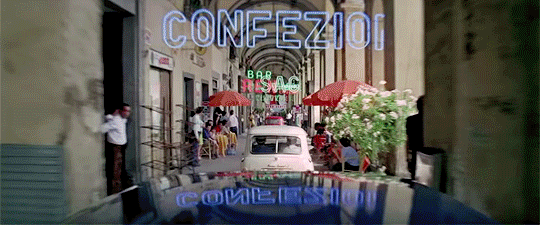
The Italian Job (1969); dir. Peter Collinson - 92%
Holy shit, this movie is fun! I genuinely love this film so much, even if it has its flaws here and there. Other than being a movie that was absolutely made at the cusp of the 1970s, it's one of the most British heist films I've ever seen. And that's not a bad thing in the slightest, believe me. But, it may be an acquired taste for some. But that said, here are the main things to know. This is a British heist film that stars Michael Caine and features a lot of car tricks, as well as one of the most iconic film endings of all time. And that about covers it. Michael Caine is the most Michael Caine you'll ever see him, and if you ever wondered why he was cast as Austin Powers' father in Goldmember, this movie will make you understand why. Supporting cast is also very good, but everyone takes a passenger seat to the car stunts, which are some of the best care stunts I've ever seen on film. If you want Ocean's Eleven with cars, this is the movie for you. Love this one.
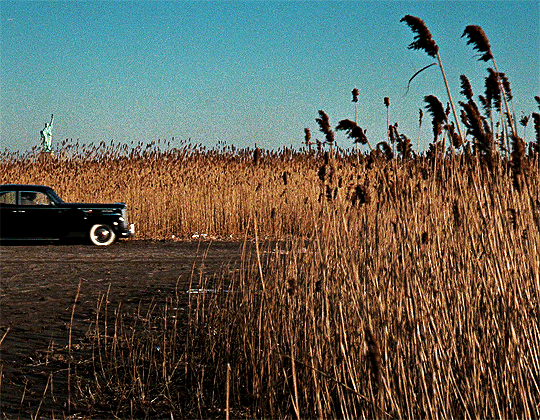
The Godfather (1972); dir. F. F. Coppola - 100%
Cliché? Absolutely. The obvious choice to praise universally? For sure. The most mainstream, boring, dull, basic bitch film I could possibly like? Yeah. Yeah. BUT I DON'T GIVE A SHIT, BECAUSE IT'S FLAWLESS. Even if I didn't think this movie was essentially perfect, there isn't really anything I can say was wrong with this movie, in my inexperienced opinion. Cast and acting? Perfect. Plot and writing? Twisted and perfect. Direction? Iconic and perfect. Production design? Immersive and perfect. Music and editing? I CAN HEAR THE THEME SONG RIGHT FUCKING NOW, THIS MOVIE IS PERFECT. And you gotta understand, I put off watching this movie for YEARS because I thought it was gonna be boring. And then, I watched it. And post watching it? It's amazing. Watch. This. Movie. NOW.
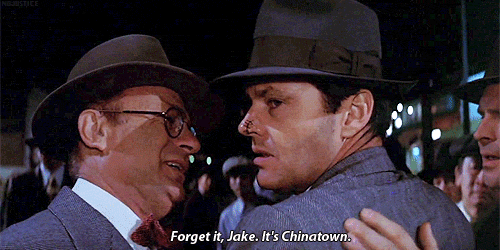
Chinatown (1974); dir. Roman Polanski - 96%
...I saw a lot of good movies this year, OK? Look, this is also an excellent film, despite its reprehensible director. Just divorce the art from the artist and all that, and go into this movie completely blind if you haven't seen it. Taking it from me, it's essentially perfect. Only issues I had were that the Production Design wasn't particularly distinctive, and the music was mostly forgettable after the fact. And those were nitpicks. Watch this movie!
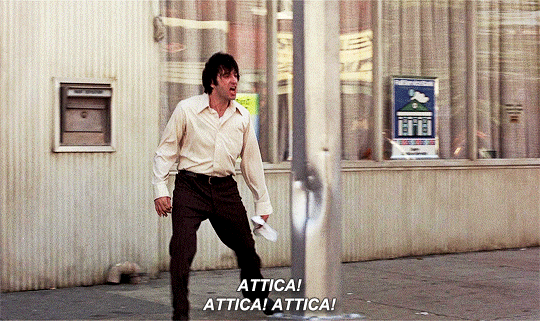
Dog Day Afternoon (1975); dir. Sidney Lumet - 90%
Did...did I watch a bad movie this year? I mean...yeah, I did. Black Adam sucked. And, like...Violent Night was...well, no, I liked Violent Night. Ooh, I was forced to watch Minions 2: The Rise of Gru, which was mediocre at best! I...OK, OK, look, you've heard this before at this point, but...watch this movie, OK? Another heist film, based on a true story this time, as well as being a benchmark in LGBTQ film representation, this film is a great one. Maybe I didn't like an acting performance, maybe the plot wasn't perfectly accurate to real life, maybe the cinematography wasn't always iconic, and maybe it could've used literally any music...but it's a great movie. Watch it.
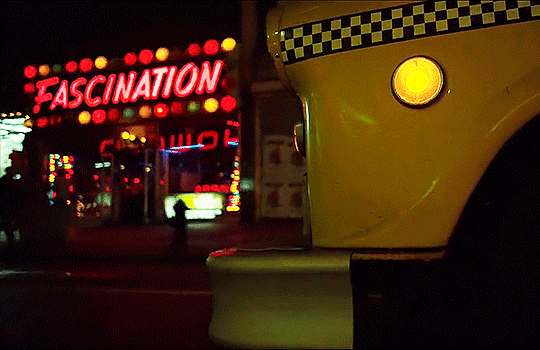
Taxi Driver (1976); dir. Martin Scorcese - 90%
The "good movie" train keeps chugging forward with this one, because yeah...Taxi Driver is also fantastic. Truly one of the best character dissections I've ever seen, as well as a fascinating look at one of the most dangerous and crime-ridden environments in American history, Scorcese makes a really morally complicated film with...well, frankly, troubling consequences and implications. I didn't put out a review on this one (sorry, got stuck in the wasteland that is my Drafts page), but this film was partially responsible for Reagan getting shot, fun fact. And that may be because the shooter partially identified with Travis Bickle, who is a troubled and fascinating character. And for the record, the rest of this is fantastic as well, but De Niro's Bickle and Scorcese's NYC are the most prominent and most important parts of this movie. Love this one, too. Watch this film if you like character dissections!
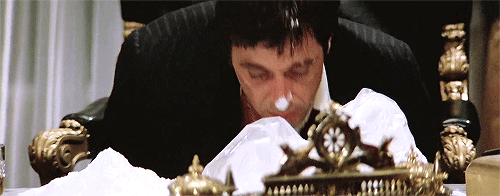
Scarface (1983); dir. Brian de Palma - 90%
OK, so...is this the most stereotypical college-age dumb jock poster-in-the-dorm-room movie in the fucking world? Yeah. Yeah, it really is. But is it a great movie despite that? I mean...holy shit, yeah, it's a very good movie. Sure, Italian actor Al Pacino playing a Cuban immigrant is a weird casting choice that's aged poorly in today's sociopolitical landscape...but he's also really fucking good at it. Seriously. Over the top, absolutely, but an extremely enjoyable watch all the same. Watching him slide into depravity and chaos when he already started there is fascinating, and Pacino just EATS the movie with how hard he chews the scenery. Look...it's a fun fucking movie to watch, and that's not even talking about the iconic lines, the supporting cast, the well-structured plot and story, the iconic costumes, and every other enjoyable part of this ride of a movie. I resisted watching Scarface for a LONG time, because I associated it with college-age fuckbois, but...shit, it's a good movie. Watch it if you haven't seen it.

OK, lemme pause here. Part Two coming next!
#user365#31 to life#crime films#crime genre#365days365movies#365 days 365 movies#m 1931#the maltese falcon#the third man#rashomon#the killing#cool hand luke#the italian job#the godfather#chinatown#dog day afternoon#taxi draiver#scarface#films i watched#watchlist#films i saw in 2022
10 notes
·
View notes
Text
31 (Films) to Life: End of Year Round-Up II

Before I wrap up last year and begin anew, here's the rest of the round up of the crime films I saw in 2022! Here's the first part of this post if you want a catch-up. These post is gonna cover these films:
Once Upon a Time in America (1984); directed by Martin Scorcese
Thelma and Louise (1991); directed by Ridley Scott
Reservoir Dogs (1992); directed by Quentin Tarantino
Casino (1995); directed by Martin Scorcese
Heat (1995); directed by Michael Mann
The Usual Suspects (1995); directed by Bryan Singer
L.A. Confidential (1997); directed by Curtis Hanson
American Psycho (2000); directed by Mary Harron
Catch Me if You Can (2002); directed by Stephen Spielberg
Monster (2003); directed by Patty Jenkins
The Departed (2006); directed by Martin Scorcese
Zodiac (2007); directed by David Fincher
OK, let's jump back into this recap!
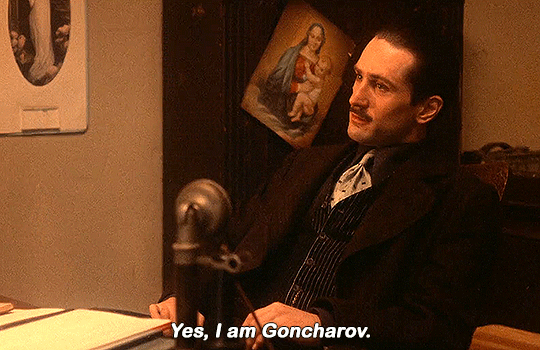
Goncharov (1973); dir. Martin Scorsese - 82%
Look, I realize that this, as a recently recovered film, this has gotten a sort of cult-following, as it were. But after finally getting ahold of a copy of it and watching it, I dunno...seems somewhat overrated to me? Sure, Scorsese's choice to focus on Italy during the end of the Cold War is an interesting premise, and the cast is genuinely excellent, but...again, I thought it was only OK compared to some of the other movies on this list. Although, I will say, John Cazale was a stand-out character for me, in sort of a spiritual successor to his role in Dog Day Afternoon, playing the unhinged assassin with a very complex backstory. I read somewhere that there was a planned spin-off for Ice Pick Joe at some point, and I would love to know more about that. Plus, Scorsese's choice to follow up on Midnight Cowboy and Dog Day Afternoon by injecting homoerotic tones, especially in a film from this time period, was...
...Yeah, I'm WAY too late to hop on this meme. I'll stop now. It's a very funny meme, though. Love the fact that Scorsese himself admitted to making it; that's shit's hilarious. Anyway, on to the actual list.

Once Upon a Time in America (1984); dir. Martin Scorsese - 94%
This is a complicated movie to describe and to recap, and I actually never posted the last part of my review for this one, but...man. This is an excellent movie. Granted, exactly what you'd expect when I say it's a Martin Scorsese-directed period piece set in NYC and starring Robert de Niro...but, it still manages to surprise here and there. A couple of these surprises are, in my opinion, a tiny piece contrived, and it also manages to make its main character thoroughly unlikable in many ways, but it's still a great story with a lot of character packed in a...3 hour and 50 minute runtime, JESUS CHRIST. OK, yeah, this is a really long movie, but it's also hard to see a good place to trim it without harming the story and character work as a whole.
In terms of my normal breakdown, acting is nearly perfect all around; plot is convoluted and takes place in multiple time periods, but is still very good; directing and cinematography is beautiful; production and art design is perfectly immersive throughout all time periods represented; and if I hear pan-pipe music one more time I'M GONNA FUCKING LOSE IT. But the editing is still solid, despite an insane runtime. Look, if you're the kind of person who doesn't like uncomfortable moments in film or unlikely characters, or if you'd rather not strap in for a lot of atmosphere and silent character moments over the course of a nearly four-hour movie...maybe skip this. But otherwise, this movie is entirely worth it, and a genuine masterpiece. A must-watch for crime movie and Scorsese fans.

Thelma and Louise (1991); dir. Ridley Scott - 84%
A good Ridley Scott movie (and one that I only published half of my review for, whoops)! So, Thelma and Louise has a pretty good plot and acting, and does everything else pretty well. Plus, its titular relationship is compelling for a lot of reasons, whether or not you take it as romantic (which there are arguments for and against). As well as being a good source for an essay on justice within a patriarchal culture that has issues with female self-autonomy and sexual consent (yes, really, I'm not even reading into that super hard), it's an interesting movie. But if I'm gonna be honest, while I thought this was a good movie...it's not necessarily one I'd go out of my way to watch again, and I may turn away from it when it comes on TV. Y'know what I mean? Like, I'd tell people it's a good movie, but I wouldn't recommend it, necessarily. It's a good movie to watch at least once, though.
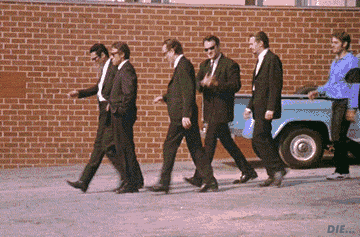
Reservoir Dogs (1992); dir. Quentin Tarantino - 89%
Reservoir Dogs, on the other hand, is a movie that I absolutely recommend. Now, is this a movie that, like Scarface, every college fuckboi in the world has seen, recommended, and quoted. I mean, yeah, absolutely. Is it gratuitously gory and violent? Again, yeah, absolutely it is. But it has a banger of a cast (Harvey Keitel, Steve Buscemi, Tim Roth, Michael Madsen, to name a few), fantastic plot and good writing, good direction and cinematography, good production and art design (simple as it is), great editing, and memorable music (for what little there is in this movie). There's a lot packed into this one, and there are narrative twists and turns you wouldn't necessarily expect, leading to one of the tensest endings I saw in a movie last year. And as much I would love to go into more details about this crime thriller...I won't. Go watch this one, trust me.

Casino (1995); dir. Martin Scorsese - 94%
So, this year, I made a huge mistake. I was in a hotel room for a conference, alone (much less sad than it sounds, believe me), and I decided to watch a movie that night. So, I sit down, look at my list of films, and realize the next one is the Scorsese classic film Casino. Now, I have a copy of this movie at home on DVD, but I find it on streaming, so I figure I may as well go for it. Here's the problem: it was on AMC. Now, at first blush, this doesn't seem like a problem. But it actually is a massive problem for Casino, more than any other movie I've ever seen, because the censoring for TV really distracts from the movie itself. Like...really badly, too. It was an issue.
Now, is this a good movie? Very much so. As Scorsese loves to do, it follows a gangster played by De Niro, during the time period where the Mafia was at its strongest influence in Las Vegas. His enforcer and best friend, played by Joe Pesci, joins him in the business. What follows is a multi-year story of death, lies, betrayal, talk shows, domestic abuse, and a LOT of crazy shit that you follow the entire time with baited breath. This is a 3 hour plus movie, and I remember more of it that I rightfully should. And yes, there are a LOT of F-bombs, all of which were covered by Joe Pesci's less-than-stellar dubbing over his own lines. When "fuck" comprises 40% of a character's dialogue, censoring tends to really hamper with immersion, just saying. But yes, this film has stellar acting from the leads and support, an interesting and engaging plot with curse-heavy writing, great direction and cinematography throughout, fantastic production design, and a good score with great editing. Definitely watch this one...uncensored. Trust me on that one.
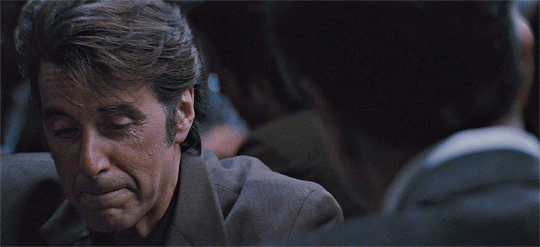
Heat (1995); dir. Michael Mann - 90%
Well, shit, Al Pacino and Robert De Niro in a crime movie? And Pacino's playing a cop? Hell yes. It's also Pacino's last movie before he goes into overacting hell, and even then, he has a lot of scenery in his teeth and he is loving it. But even despite that, solid performances from our two leads, one of whom is playing to type, and the other against it, but both very well. It manages to mix multiple compelling stories, while maintaining the tension of a cat-and-mouse game, during which you're somehow always rooting for both sides to win. Direction is great, production design is simple but good, and the music is...fine. I actually don't remember it much, to tell the truth. But either way, a must-watch for any crime film fan. It's fantastic.
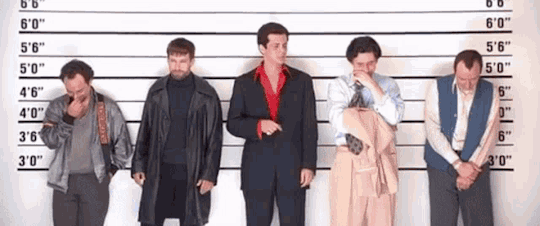
The Usual Suspects (1995); dir. Bryan Singer - 92%
As some of you may know by now, I'm a firm believer in divorcing the art from the artist. So, yes, even though this is a Kevin Spacey vehicle directed by Bryan Singer, I still really wanted to watch this one. And it's great. Absolutely fantastic, don't get me wrong...but I was kinda fucked from the start here. Without going into any details, this movie is about cops investigating a crime committed by the mysterious Keyser Soze, and uncovering who the culprits are. And that's it. That's all you're getting. Because there's a famous twist in this film, and I knew it from the jump, unfortunately for me. Definitely didn't ruin the movie, but not knowing the twist would've made it OH so much sweeter. So, that my word that it's a good movie, do not attempt to look it up anywhere for more info, and go check this one out.
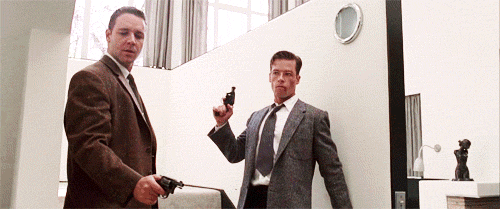
L.A. Confidential (1997) - dir. Curtis Hanson - 90%
Another Spacey vehicle! And hot damn, is it a great one. I like the previous movie more for the plot, but L.A. Confidential is certainly no slouch when it comes to twists. Not the least predictable twist in the world, but still a notable twist. Again, excellent cast here (Crow, Pearce, Spacey, Basinger, DeVito, Cameron, etc.), great plot and writing as well, great direction and good cinematography, excellent production design, and great music, and this is another must-watch action movie, on par with Chinatown in tone, and Heat in quality. Also, a seminal buddy-cop movie...kinda.

American Psycho (2000); dir. Mary Harron - 82%
Fun fact about me: I'm a serial killer true crime junkie. Which, yes, makes me either a typical millennial or a middle-aged white mom with nothing to do all day, but sue me, I think it's an interesting topic. Anyway, because of that, I've always been interested in watching this movie, which not only pictures a very '80s sense of psychopathy that's still identifiable today ("sigma males", anyone), but actually inspired a real-life serial killer duo, Paul Bernardo and Karla Homolka, AKA Canada's most notorious murderers. Their favorite book was the original American Psycho, which was later adapted into this film. But that said, outside of the true-crime connection, I also liked this film as a character dissection of a man quickly going insane, as well as the exploration of a business shark capitalist drive and misogynist culture surrounding it as major causes and drivers of that mindset. And I'd say that was reading too much into it, but...it really isn't.
But that said, this movie is interesting to watch, but definitely not perfect. Acting, with Bale as an exception, is good but not great throughout. Plot and writing are good, if ham-fisted at times, and with an unexpected ending (and not in a great way). Direction is great, cinematography is pretty good, too. Production and art design is extremely solid, and maybe the strongest part of the movie. Music gives that a run for its money, though, since it's also a narrative device to better understand our lead. This is a good movie, and weirdly relevant with certain elements of our internet culture, so check this one out if you have the time. And if you're in the mood for a film whose bread and butter is toxic masculinity, but was also directed and written by women. Which is hilarious.
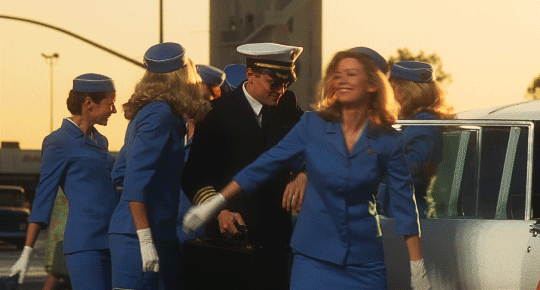
Catch Me if You Can (2002); dir. S. Spielberg - 88%
The concept of an auteur in terms of film directing is varied and storied, but is usually used to refer to an individual whose artistic vision is clear on the screen, making their films quite distinctive to the discerning viewer. And Jesus Christ, is this film an example of that for Stephen Spielberg, because I don't know if a crime film could Spielberg harder than this! What I mean by that is that Spielberg's style, while not often applied to the crime genre, is very apparent in his films. You usually know one when you see one, is what I'm saying.
That's to say nothing about quality, which is very good in the base of this film. The only real weak spot, for me, was the music of the film, which wasn't very distinctive outside of the opening credits theme. Everything else, though, is pretty great. DiCaprio and Hanks kill it, even though Hanks was admittedly still definitely Tom Hanks through the film. Plot and writing was a Spielberg plot, but a really good set of character dissections and interactions. Direction and cinematography are fantastic, Production and Art Design are TOP fucking notch, until we sort of fall off towards the end of the movie. And editing is great, even if music wasn't my favorite. Great movie, very much recommended if you want to see Spielberg do a crime film. And you should want that, ideally!
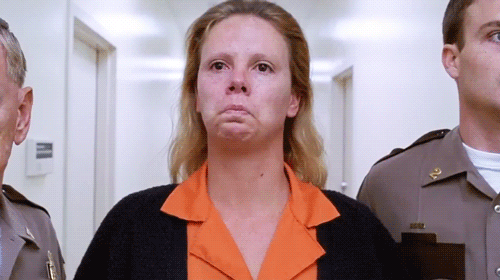
Monster (2003); dir. Patty Jenkins - 86%
Remember that thing I said earlier about being a fan of serial killers? Well, Monster and its focus on real-life murderer Aileen Wuornos was high on my list of must-sees at the very beginning of this project. Charlize Theron's performance as the character is pretty legendary, and for good reason, because she does an AMAZING job as Aileen. And Ricci's no slouch as her girlfriend Selby, either. Was it the most accurate movie in the world? No, but it was unexpectedly accurate in some ways as well. Wuornos is one of those figures who's kind of controversial, as some of her murders could have been self-defense, and the film's writer and director, Patty Jenkins (yes, that one) does realize that. And I started to be worried in the beginning of the film, but she turned me completely around by the end. It's great!
Direction, though, is...fine? It's not particularly distinctive, but it isn't bad. Same goes for the Cinematography. Production design is excellent, mostly because Charlize Theron BECOMES Aileen Wuornos, partially due to acting, but also absolutely due to appearance and wardrobe. It's genuinely very impressive the whole movie. And finally, music was there, and kinda weirdly clashing with tone in some instances, but it's not too bad. Check this one out if you're into serial killer stuff, too.
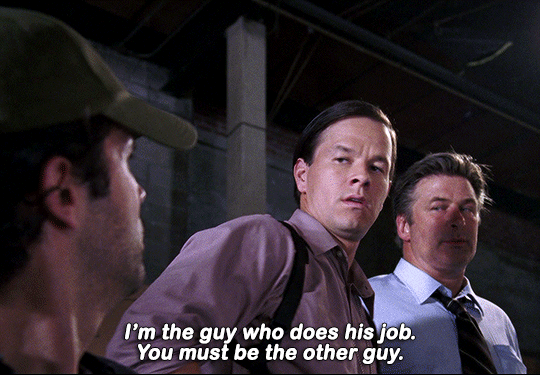
The Departed (2006); dir. Martin Scorsese - 94%
Another fun fact about me: I grew up in New England, as well as currently living there. And I live in an area of the region where Boston is a major feature, as is the culture that revolves around the city. And yes, this film is well-known for being a somewhat stereotyped view of Boston...but JESUS FUCKING CHRIST, is it wicked accurate, kid! It also helps that, as a Scorsese film, it's very well-made and absolutely star-studded. Some of those stars, namely Damon and Wahlberg, are actually from the area, and they flex some intense Boston accents throughout this movie. DiCaprio and Nicholson are also fantastic in this film, as are Sheen, Baldwin, Farmiga, Winstone, and Anderson, even though some of them don't quite pull off the accent as smoothly as others. Baldwin, in particular, is still Alec Baldwin, no matter how you try and change that voice.
Directing and cinematography is stellar, unsurprisingly, while production and art design is definitely very iconically mid-2000s Boston. The score of this film literally changed the musical tastes OF BOSTONIANS, according to my fiancée who's more from the area than I, and the editing is also top-goddamn notch. And the plot and writing? Holy SHIT, the plot and writing! Look, you need to now two things. One, this is a cop-mafia drama in a vein similar to Heat, and it is VERY good at that job. A little bloated, story-wise, but it doesn't show too much. And two, watch this movie, do not look up the plot or film beforehand. Suffice to say, this is an in-depth morality play all over the spectrum of morality, and the twists are EVERYWHERE. Please check this one out, it's fantastic. Go Sox.

Zodiac (2007); dir. David Fincher - 90%
And last but not least, another serial killer film with an unclear ending, and one that focuses on the investigation and the figures involved instead. Zodiac is a fantastic movie, based on a book about the case by Robert Graysmith, who's played in the movie by Jake Gyllenhaal. Graysmith is, in fact, arguably the main character of the film, with Robert Downey Jr. and Mark Ruffalo playing other key figures in the investigation from both a press and police side, respectively. You watch how this unnerving case affects these people's lives, while knowing that the case won't ever actually be solved. They present a case for the killer, but no actual answers. And in playing with that, Fincher is able to build some real goddamn tension in some moments.
Again, though, not perfect, but it's pretty damn close. Acting is stellar all over, even though some people don't quite disappear into the role. Ruffalo and Gyllenhaal are amazing on that particular front, but it's hard to see RDJ as anyone but RDJ, as an example. Plot and writing is great, directing and cinematography is great, production design is pretty good (I dunno, I wasn't as sold on that one, but that might be a me thing), and the music is great as well! Editing makes the film a little overlong in my opinion, but I don't think it affects the movie much. Check this one out, again, if you're in a serial killer movie mood.
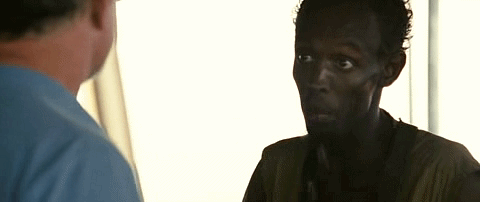
And that's it!
Next film I was set to watch was Captain Phillips, and I'll try and check that out this year regardless, but I only got that fair this year. That said, though, the next movie I'm set to watch in 2023 is technically a crime film, from what I understand. But I'm leaving the life of crime behind for a while otherwise. I've done my time, so it's time to say farewell to the old life for now. But that said...I do have plans. Oh, I always have plans.
In 2023, I'll be going off of a list of challenges, as curated by the book Everyone's a Critic: 52 Week Movie Challenge. These challenges each require I watch films of specific categories, like award-winners, animal films, etc. And the first one in the 52 Films challenge is Best Picture winner. And for the first of those...I gotta watch this movie. And I've been wanting to watch it since 2020. So, what better time like the present? Plus...been a while since I've watched a foreign language film, honestly. So, strap in for the next one! It's gonna be a ride in 2023.

Next: ...We'll see.
#user365#films i watched#365 days 365 movies#crime films#crime genre#31 to life#31 films to life#goncharov#once upon a time in america#thelma and louise#reservoir dogs#casino#heat#the usual suspects#L.A. confidential#american psycho#catch me if you can#monster#the departed#zodiac#parasite 2019#52 films
14 notes
·
View notes
Note
Hey! hope you're doing alright, I just read your Legend (1985) movie review and noticed that you have a lot of knowedge about fantasy movies from that period, so I wanted to ask if you know a movie that I loved when I was a kid and I have been looking for it for ages.
What I remember about the movie is that the protagonist is a girl with short black hair, who lives in our world but ends in a fantasy world, where she meets a werewolf (If I'm not wrong he tries to eat her but he can't do it, don't remember why he can't), some kind of witch is after this girl, I think she had something the witch wanted (I think the werewolf was the witch's minion). Then I remember the end, where the girl returns to her world and the werewolf follows her because he is in love with her.
I also remember at some point in the movie the girl eats an caramel apple and she wans't suppose to do that, don't remember why, also remember that the werewolf propose to her in the fantasy world.
That's all I remember, sorry if is so little but I hope you could help me, I loved that movie when I was a kid and I just were able to watch it when it was on TV, so I never learned the name of the movie.
Thanks for reading my ask and hope you have a great day!

Oooooh, great question! And thanks for the inquiry into my well-being! Doing good, just a little busier than I want to be these days; but I’ll be back shortly, I promise that!
In truth, I'm not entirely sure which movie you're referring to, as I may need more details on it. BUT, were I to venture a guess, it sounds a little bit like the 1984 werewolf film The Company of Wolves, a British fantasy film starring Angela Lansbury (R.I.P.), Sarah Patterson, and David Warner, as well as a take on the Red Riding Hood story. There are a couple of things that make me think it could be this movie, like the phrase about "never eating windfall apples", and the fusion of our world and a fantasy world, as well as a romanticized take on the original story.
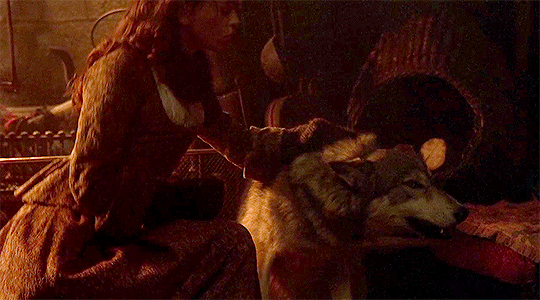
Buuuuuuuut, on the flip-side, its protagonist is a long-haired brunette, and I can't necessarily think of any witches in the story, so that's a little bit of a conflict. However, if you have any other details (live-action vs. animated, country of origin or present accents in the film, when you remember watching it in terms of time period), that might help! So, if this isn't it, I'll take some more details to try and help you out! If anybody else has any details, feel free to contribute!
#ask response#ask me anything#movies#ask me about movies#user365#365days365movies#the company of wolves#fantasy films#werewolf movies#werewolves
14 notes
·
View notes
Text
31 (Films) to Life: Dog Day Afternoon (1975) - Recap and Review
Based on a true story time!

Well, this review’s coming a little late for Pride Month, but who cares? Every month is Pride Month, or Black History Month, or International Women’s Month, etc. for me. SO, let’s talk a little bit about New York City in the 1970s. It...it was really, really bad for basically everybody. New York was a crime-ridden, X-rated, terrifying hellscape for a lot of people. Both of my parents grew up here during this time period, and they constantly told me how dangerous New York City was. If you’re going there or would like to go there today, don’t worry! NYC is one of the safest cities in the world nowadays. But back then? Well...
Sex workers were all over Times Square and Central Park, with the latter being one of the most frequent areas for muggings and sexual assault. And for the record, I’m not saying that sex workers were the problem themselves; they were instead indicative of a failing economy and people in desperation for some kind of income. Also indicative of that financial destitution is the record number of homeless and drug dealers (pre-crack epidemic) in the city at the time, combined with police corruption and thriving crime families.

So, why was money so hard to come by at this point? Simple: the city was too big. Well, OK, not simple, but I’m not an economist. NYC’s spending vastly outweighed its budget, and the city was going bankrupt as a whole. They couldn’t borrow more money from the government, and bad accounting meant that they vastly underestimated how much money they actually needed. And this may actually explain the attitude of some boomers today in terms of things like wide healthcare and free university education. Yeah, really. Higher education was free, and there were better medical benefits for residents of the city. And look where that got them, I guess? Again, though: bad accounting and other decisions caused those issues, but try telling that to some boomers.
Things changed fast, as the city attempted to bandage its hemorrhaging funds, but nothing they tried really worked. They shook down unions, instituted layoffs, turned sales tax into state tax...and then President Gerald Ford refused to give them a loan. Shit. SHIT! By this point, it’s 1975, and we have problems, especially considering what’s on its way.
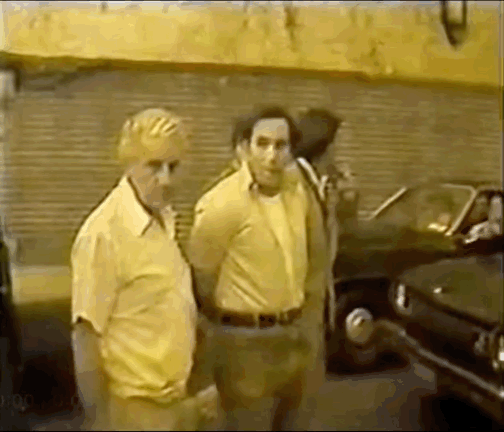
In the summer of 1976, the city is gripped by a whole new kind of terror: serial killers. David Berkowitz, also known as the “Son of Sam”, is rampaging around the city killing young white women with long dark hair, killing them in parked cars all throughout the summer, as well as the following year. At the same time, Richard “Times Square Killer” Cottingham has been killing people in the city since 1967. Not to mention gang violence, rape, muggings, and...

Before I get into this part, I need to remind you guys of something: none of this stuff I’ve been talking about, NONE of this, is even mentioning race and sexual orientation-based prejudice and disparities. And part of that is because so much crime in those sectors probably wasn’t reported, but it’s also because shit was bad for EVERYBODY at the time in NYC. But it’s important before we move on to talk about LGBT rights in the city in the 1970s. Oh, and I am a straight cissexual male, just to be clear.
While all civil rights in the city is a complex and intricate topic for another time, LGBT rights was especially present in 1970s New York City. One year before the decade began, in 1969, the police executed a routine raid on the Stonewall Inn. And I say routine because gay bars and LGBT-friendly institutions were targeted at the time purely out of institutionalized homophobia. I mean, that’s not even a conspiracy, it’s just true. Officials considered homosexuality a perversion that ruined the image of the city. ‘Cause, y’know, as I’ve been pointing out thus far, their image was sparkly clean at the time. This hypocrisy drove them to perform “sweeps” for gay people, mandating “gender-appropriate” clothing and enforcing the firing of people who were suspected as non-heterosexual. Horrid.

Back to Stonewall, 1969. On June 28, 1969, the cops raided the Stonewall Inn, which was indeed an LGBT club that served alcohol...without a liquor license. To be fair, that system was also rigged against gay clubs for the same reasons, and had previously paid off corrupt cops (with a payment called the gayola, which is admittedly a fun word to me). Their patrons were white, black, and Hispanic members of the LGBT community, and it was the most important gay bar in the city. So, when the cops raided it that morning...it didn’t go well for anyone.
I won’t go into all of the details of the raid, because some of them are...gross to read, but I’ll cut to the most important part. The time came for the police to arrest the patrons of Stonewall. They started by arresting members of the Mafia who were there (it’s just a normal thing for the time period), which was understandably received well. But once the LGBT crowd became the targets...well, all hell broke loose. Stuff starts getting thrown, the cops react violently (because some things never change), and the fight was on! As people started fighting for their rights and shouting “Gay power”, even the local women’s prison supported them from afar, shouting “Gay rights, gay rights!” out of the windows. And at this point, deep into the Stonewall Riot around 2 AM, is when Marsha P. Johnson shows up.
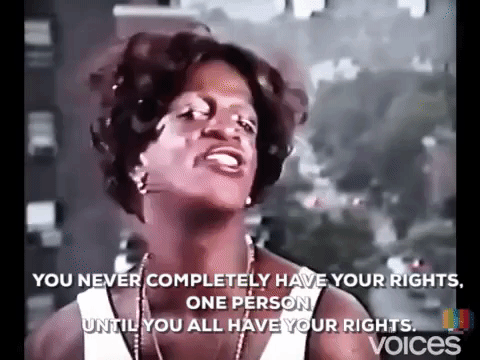
Yeah, despite what Big Mouth and a lot of people think, Marsha wasn’t there at the very beginning. That’s not to downplay her role, though. As a prominent black trans woman in the community (which barely existed at the time), Marsha soon became the figurehead of the movement. When she arrived at Stonewall, the place was on fire. Some say the cops started it, some say the protesters started it, some say the mob started it...it’s fuzzy. But one she got there, the riots raged through Christopher Street, and the cops were getting chased off the site.
By the morning, the street was wrecked and the club was history...literally. Property was destroyed, people were injured...and the Riots weren’t over yet. Night two, and thousands of people show up on Christopher Street. This time, Marsha P. Johnson was front and center, climbing a lamppost and throwing a bag through a police car windshield. More fires, more fighting, more fury. The protesters formed kick lines (yes, kick lines) against the police lines, and there was a massive standoff between the groups. By the end of it, gay rights was here, and was here PERMANENTLY. Which, y’know, is extremely good, obviously. Please look up Marsha P. Johnson for more info, because her story (and the story of her tragic and mystery-shrouded death) are extremely important to LGBT history. She really was Martin Luther Queen.
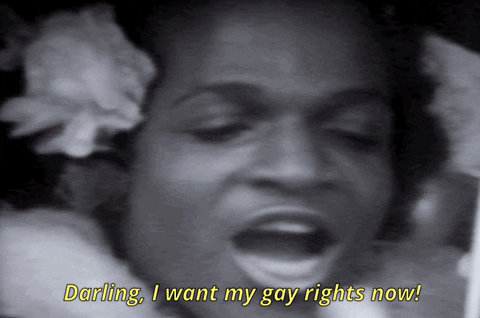
So, once we hit 1972, trans people are a known quantity in and outside of the LGBT community of NYC. And with that, FINALLY...we can talk about John Stanley Joseph Wotjowicz. And, since I’m actually about to tell you the plot of the film, for the most part...
SPOILERS AHEAD!!!
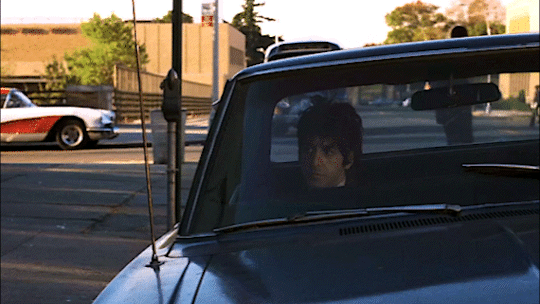
John Wotjowicz (named Sonny Wortzik and played by Al Pacino) was a Vietnam veteran who was married with kids in 1969. But that year, the same year as the Stonewall riots, the two separated. Two years later, John met and married Elizabeth Eden (named Leon Shermer and played by Chris Sarandon in the movie), a trans woman. Now, granted, it’s 1971, so gay marriage wasn’t legalized, but they still had a public ceremony. The balls, seriously! They even got news coverage over it, and didn’t receive any major repercussions.
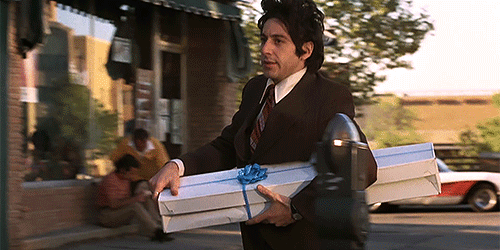
However, Elizabeth had a nasty case of gender dysphoria, which is obviously not surprising given that she was a trans woman. In her case, though, she attempted suicide multiple times because she couldn’t afford gender reassignment surgery. And yes, this is a GREAT example of how that kind of healthcare saves the lives of countless trans youth and adults every year, but that’s a different topic for a different day...kind of. It’s actually very relevant, because Elizabeth needed the surgery, and John needed the money. And money’s tight in the 1970s for previously stated reasons, sooooooo...
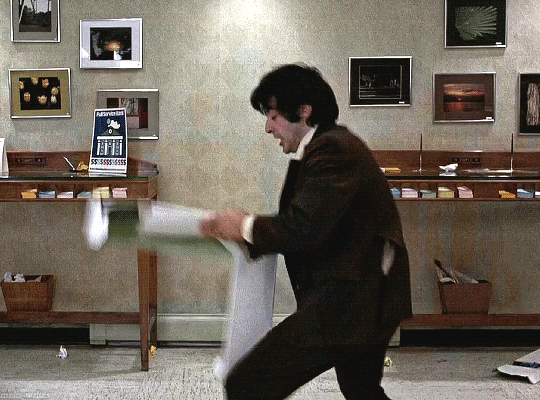
In 1972, Wotjowicz enacts his plan to rob a bank, which is the point where the film begins. After a few botched attempts, he eventually chooses a Chase Manhattan in Brooklyn. Now, common rhetoric then and now says that John did this to get the money for Eden’s surgery. However, to be completely and comprehensively accurate, he may also have committed the robbery on behalf of the Mafia to pay off a debt he owed them. Wotjowicz never confirmed which motive was more important to him, so let’s assume it may have been a combination of the two.
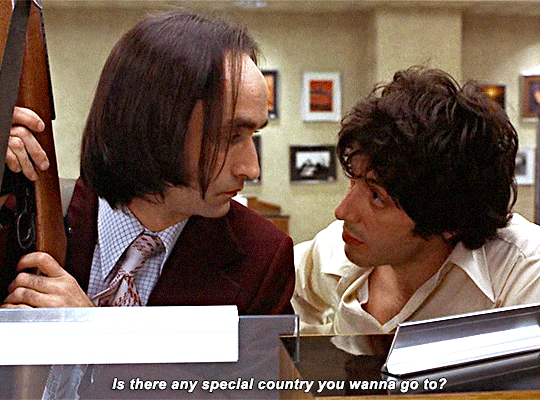
Along with partners Sal Naturile (John Cazale) and Rob Westenberg (named Stevie and played by Gary Springer in the movie), John entered the bank on August 22, 1972, and it immediately went badly for him when the cops got wind very quickly. He held seven bank employees hostage for fourteen hours, and was quickly abandoned by Westenberg, who saw the cops as they were entering the bank. Over the course of the siege, John was in correspondence with the police, and got pizza for himself and the hostages. They negotiated for a car to take them and the hostages to the airport, only for Sal to be shot while in the driver’s seat of the car at the airport. John surrendered, and was taken to jail, where he served 5 years.
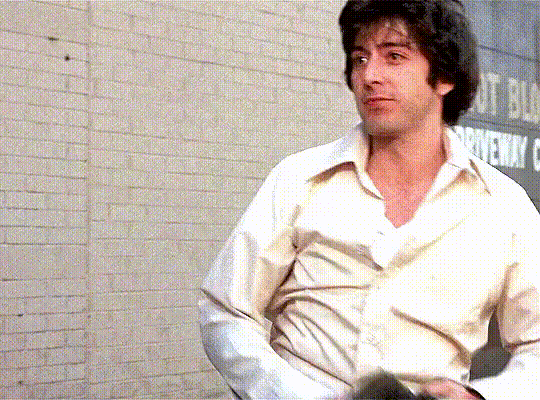
And...yeah, that’s the plot of the movie in a nutshell. Yeah, there’s some stuff about an early raid, talks with cop Eugene Moretti (Charles Durning) and FBI Agents Sheldon (James Broderick) and Murphy (Lance Henriksen), as well as a call with wife Angie (Carmen in real life, played by Susan Peretz). But in terms of the broad strokes, that’s basically it. Well, except for one famous scene, but I’ll get there in a minute.

So, John’s been arrested. While John was in prison, Eden got the surgery...then divorced him and found another guy. They stayed friends and Eden got the surgery, though, so still worth it? ALSO while he was in prison, director Sidney Lumet, who had previously directed 12 Angry Men, and would later direct Network, decided to put his considerable talent into making a movie about the event. And he INTENSELY dramatized the events. John, understand, was happy about Al Pacino’s performance as himself...and was upset with basically everything else.
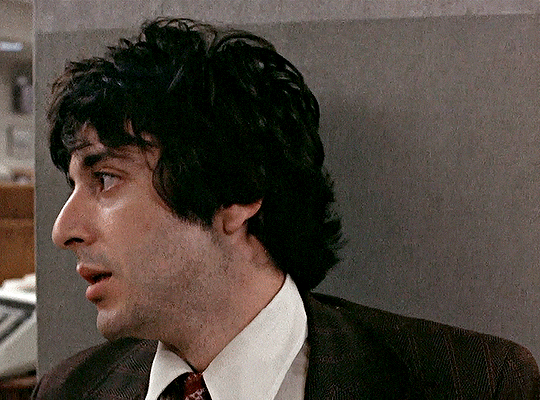
See, he rightly felt that he was undercut for selling his story for the screenplay. Which, given how successful the movie was, is totally fair. He was also upset at the portrayal of his ex-wife in the movie, which portrayed her as an annoying overweight woman whom he kinda hated. And she wasn’t that at all, and John was an honorable guy, it turns out. Still, despite John’s grievances, the movie is an American classic, as well as one of the first movies to prominently feature an LGBT person as the main character. It’s important in multiple ways, is what I’m saying.

John Wotjowicz died in 2006 at the age of 60, while Elizabeth sadly died of AIDS-related pneumonia in 1987, after getting the virus from a blood transfusion. Which, damn, that’s horrible. It’s honestly a fascinating story, and I get why it was made into Dog Day Afternoon. That said, though, there is an elephant in the room that needs to be addressed here. And that elephant’s name is:

See, this scene is loosely based on famous photos taken of the robbery. This actually was a huge deal at the time, and scenes of John outside wearing this exact shirt-pants combo were famous. Crowds gathered to watch, just like in the movie, and it was a huge deal. But, uh...the Attica thing? Never happened. See, in the movie, Sonny riles up the crowd by shouting “ATTICA! ATTICA! ATTICA!” Getting the crowd to join in. This was a reference to the Attica Prison Riots, which took place a year before. 43 men died in the riots, making it the deadly riot in US prison history, and it was a step in the prisoner’s rights movement of the day. So, invoking this is kind of a big deal. And Pacino improvised the whole thing.
Yeah, this didn’t actually happen! Pacino made this up himself, stoking the crowd’s memory of injustice enough to rile them up and make this scene memorable. And yeah, the crowd was improvising, too! They weren’t even extras, they were just people who wandered in off the street to watch the movie shoot! And they were also really good at being a crowd. They cheered on cue, they booed on cue, they moved on cue, they were...frankly, they were incredible. But yeah, this is technically not true.

That said, there was a crowd there at the time, and they really did cheer and jeer throughout the day. An addition that the movie makes, though, is the addition of LGBT crowd members that protested for gay rights. And while I can’t find a lot of proof of this happening (there is some proof, just not much), it wouldn’t be a big surprise, given what I talked about earlier. Three years after Stonewall, the topic was still on everybody’s consciousness, so having crowd members there does make sense.
Sidney actually called members of the Gay Liberation Movement and Gay Activist Alliance, organizations that were born directly as a result of Stonewall, so that they would be members of the crowd. And one of those members that showed up?
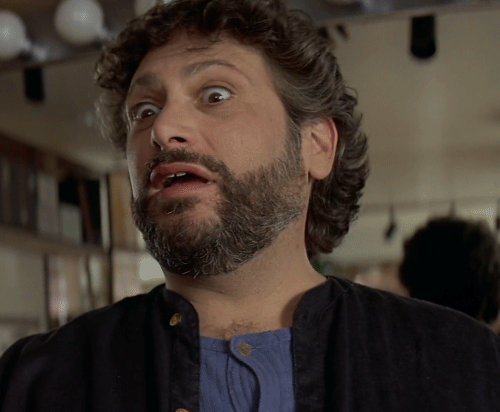
Yeah. A teenaged Harvey fuckin’ Fierstein. Awesome.
So, yeah, this movie was a big deal for LGBT rights and representation, because the event itself is an interesting footnote in LGBT history. So with all of that said...how was the movie itself? Well...
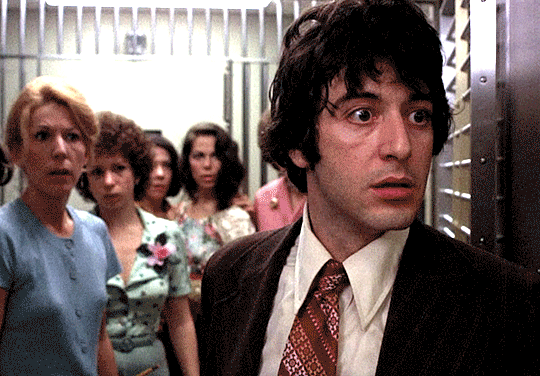
Review: 90%
Um, it’s a really fucking good movie. Is that a surprise, though? I know I normally talk through the movie more, but I don’t think I really needed to this time around. The original story and its background is fascinating. But yeah, the movie absolutely rules, don’t get me wrong. Let’s break it down a bit!
Cast and Acting - 9/10: Unsurprisingly, Al Pacino is stellar. But in truth, everybody’s pulling their weight here. Outside of a few bit parts that don’t work perfectly (mostly in the hostages, sorry Carol Kane), this story is wonderfully portrayed. Also, fun fact, one of the main hostages was played by Penelope Allen, who was actually sort of Pacino’s surrogate mom early in his career. And then they got to act together, which is super sweet! I loved the acting in this one.
Plot and Writing - 9/10: Even though it’s not perfectly accurate in a lot of ways, the movie is damned engrossing in terms of story. Written by Frank Pierson, it’s a story about a sad sack bank robber and his paranoid friend who commit a pretty brave robbery for the time period. It’s a movie where the audience and the characters actually sympathize with the robbers, and it successfully puts them in a sympathetic light. And this is a man in love with a trans woman in 1972. How on Earth did Lumet get this to work as well as he did? Seriously, this is a great story, and very well-written besides.
Direction and Cinematography - 9/10: And yet one more for the 9/10 column with direction by Sidney Lumet and cinematography by Victor J. Kemper. This movie feels like you’re there, like it’s happening right in front of you. And you’re thrust into this impossibly stupid plan, that you can’t help but hope succeeds somewhere deep down in your soul. The immersion that this movie possesses is genuinely impressive, and Lumet is very good at his job. There’s a reason the Attica scene is one of the most famous in cinema.
Production and Art Design - 10/10:Look...I really like this movie. And that immersion I mentioned in the last category is only partially direction. The rest of it? Pure and unadulterated design. Pacino IS Wotjowicz, and that’s down to appearance as much as it is acting. This movie looks great and puts you square in 1972 New York. Which, sure, it was only filmed 3 years later in NYC, so that makes sense, but still; it really felt like I was there.
Music and Editing - 8/10: And finally...wait, this movie had music? It...doesn’t. Oh. OH! That’s why I don't remember any music here. And that was...noticeable, in both a good and a bad way. In a bad way because some scenes got a little draining without it. But in a good way because...to be honest, music was entirely unnecessary. The diegetic sound was the only source of sound in the movie, and it...worked. It really made the whole thing more real and immersive. But that said...sound editing was a little dodgy sometimes. Sure, it’s the ‘70s, with ‘70s film sound quality, but it was still noticeable when Sonny went from inside to outside, just saying. It’s really the only criticism I’ve got, so I’m sticking with it.
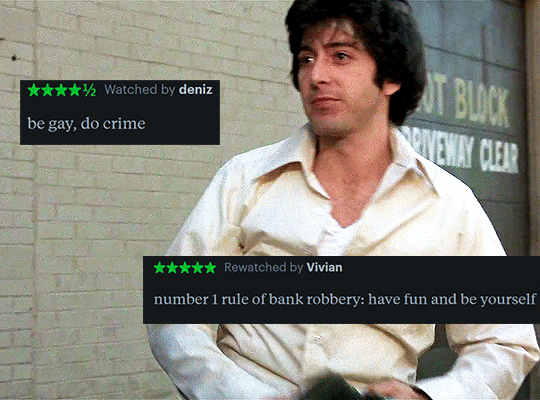
So, there you have it: a fantastic movie, and an opportunity to talk about NYC and LGBT history! Neat, huh? If you read this whole thing, then...wow geez, thank you for that. For the next one...let’s hang out in NYC for a while. I’m watching crime movies, and something tells me that this place is lousy with the stuff. We’ll be here for a little while.
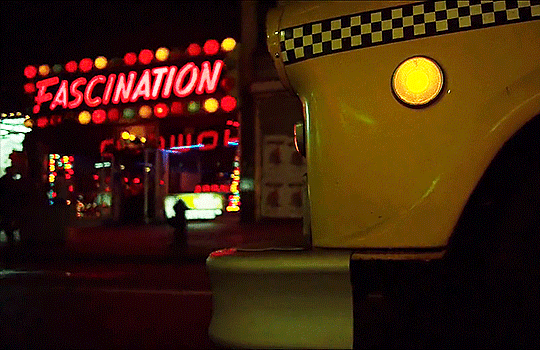
Next: Taxi Driver (1976); dir. Martin Scorcese
#dog day afternoon#f:dog day afternoon#film:dog day afternoon#roman polanski#al pacino#john cazale#james broderick#charles durning#chris sarandon#penelope allen#sully boyar#user365#365 days 365 movies#31 to life#31 films to life#crime film#crime movie#lgbt film#userkeanu#userstream#filmedit#adaptationsdaily#melisgifs
7 notes
·
View notes
Text
31 (Films) to Life: Thelma and Louise (1991) - Recap: Part One
Hey, Ridley. How’re things?
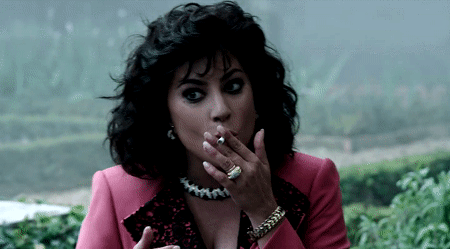
A bit mixed it seems. So, same old same old, huh? See, Ridley and I have had some run-ins before on this hellsite (see my Reviews of The Martian and Legend for more of that), but I’ve also seen quite a bit of his filmography, it turns out. Here’s a quick sum-up.
Alien (1979): A horror and science-fiction essential. If you haven’t seen Alien, you gotta get on that come October! It’s a classic! 92%.
Blade Runner (1982): Another science-fiction essential that you need to watch if you haven’t! Honestly, just watch that one right now if you want to. 94%.
Legend (1985): Check out my thoughts on this one, it’s...it’s a weirdy.
1492: Conquest of Paradise (1992): FUCK this movie. Listen to me, OK, LISTEN TO ME. Absolutely fuck this movie. It’s meant to be a celebration of Christopher Columbus, so it’s already a piece of shit premise, but then...the movie itself is a historically inaccurate, badly acted, poorly shot piece of absolute garbage. It’s so bad that I was going to write a review on it for this site, but never actually finished it. FUCK this movie, OK? 28%.
Gladiator (2000): Classic film that maybe didn’t deserve the Oscar it got for Best Film, but still an excellent movie regardless. One of Russell Crowe’s strongest. 86%.
Kingdom of Heaven (2005): Another dogshit film with historical inaccuracy out the goddamn wazoo, don’t even get me STARTED. Not as bad (I guess) as 1492, but still a really bad film. 34%.
Prometheus (2012): ...Meh. It’s a movie. 66%.
The Martian (2015): Check out my thoughts on this one, too. Great movie, though, seriously.

Combine that with the well-received The Last Duel and the not-as-well received House of Gucci, and you can probably see Scott’s weird record. He’s a very off-and-on director, and the quality of one of his films is kind of unpredictable. Also, he might be semi-racist, but that’s neither here nor there, to be honest with you. Some quick backstory, then!
Ridley Scott is an English director who grew up during World War II. Yeah, he is surprisingly old, having been born two years before the war even started. He grew up watching newsreels of the War, and reading science-fiction books. Yes, the young Scott was a tiny little wartime nerd, he was. Both he and his younger brother Tony became enamored with the world of cinema, and their journeys began. Enter Kubrick.

Like I said, kid was a nerd, and Kubrick’s opus 2001 cemented that in him and his brother. However, their cinematic journeys went in slightly different paths. They both started working for the BBC, then began their own company in 1968, which they and multiple members of their families have since directed and worked for to this day.
Soon after, Ridley began a love affair with historical drama with his directorial debut, The Duellists. He’d return to the genre year after year, decade after decade, but this was his first jump into it. It’s kind of forgotten nowadays, but it’s pretty critically acclaimed, apparently. Might check it out, one of these days. Would his next film garner a bit more attention?

...Yes. Yes, it would.
Ridley’s in the money, now. Alien is a MASSIVE success, and he follows that up with fucking Blade Runner? Yeah, Ridley’s doing pretty good for himself at this point. And his brother? Well...
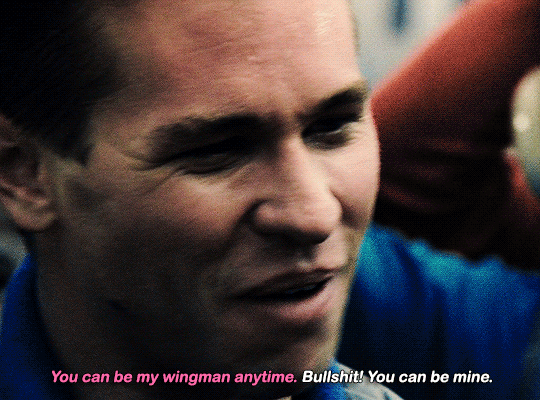
Fuck Maverick, that’s all I have to say about that.
But yeah, the Scotts are doing pretty good, come the 1980s! Ridley even gets in on the Tom Cruise action with Legend, funnily enough. The brothers are in the money, and they’ll stay that way for a while. But then...Ridley still has his missteps. There’s Legend, first of all, but then 1492 comes along in the ‘90s, and that’s...a fucking horrible movie. But again, Scott loves his historical epics, as we know. Speaking of historical epics...

Aaaaaand, he’s back on top. Gladiator is another smash hit, and nets Scott his first Oscar win for Best Director. He’d been nominated before for Thelma and Louise, but hadn’t won yet. He also, uh...wouldn’t win again, as of yet. But more on that later, because Gladiator is doing awesome! Five Academy Awards, everybody’s entertained, Joaquin Phoenix dies. And then...

And we’re back down again. Hannibal...isn’t great. A sub-par sequel to Silence of the Lambs, the film does well commercially, but pretty poor critically. But hey, it’s Ridley Scott, he’ll recover with his next film, right?
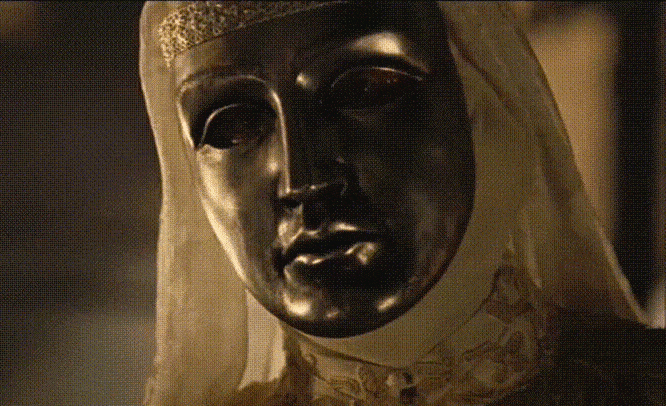
Oooooooooh, damn, that’s a bad misstep. Even for Ridley.
Yeah, Kingdom of Heaven is bad, Like, BAD bad. Riding off of the historical epic craze at the time, AND Orlando Bloom’s insane popularity at the time, this film severely faltered during a high point in Sir Ridley’s career. Oh, yeah, before this film? Dude was knighted for his service to the British Film Industry. Yeah, he was a HUGE deal. So, I’ll be referring to him as Sir Ridley Scott from now on.
Ridley starts to pick up the pieces again. He makes a biopic based on American history with the Frank Lucas biopic American Gangster, and that goes very well for him. Russell Crowe is in that one, alongside Denzel Washington as Lucas. Then, he takes a slight misstep with the spy thriller Body of Lies, starring Leo DiCaprio and Russell Crowe. And then, he makes a new and moderately received version of Robin Hood, starring...
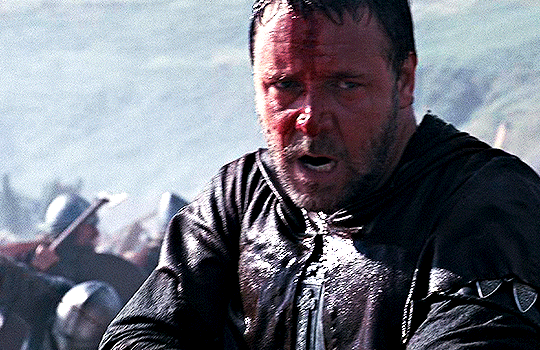
Some directors have their favorite actors, right? Scott’s favorite actor is Crowe. Anyway, he returns to the Alien franchise with Prometheus, which is...OK. Then, his brother Tony passes away, sadly, just as the two had started executively producing...The Good Wife? Huh. Go figure, but OK. And then...well, he makes a misstep of a different sort.
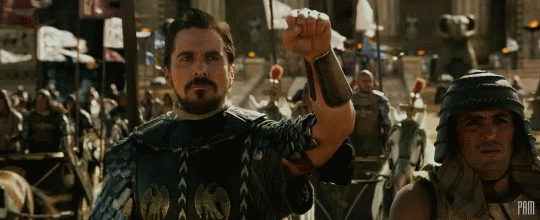
Now, at this point, I will understandably lose some of you. Because Scott directs Exodus: Gods and Kings, a story set in the time of Moses...in Egypt...and starring an almost entirely white cast. In Egypt. Including Moses, played by Christian Bale. And why, you ask? Because Scott said, and I quote:
I can't mount a film of this budget...and say that my lead actor is Mohammad so-and-so from such-and-such...I'm just not going to get financed.
Yikes. In case you didn’t catch that, he decided not to cast non-white actors for a movie starring Egyptian people...because it wouldn’t make any money for him. And it’s there that Ridley Scott might be a little racist. Because, yeah, it’s not necessarily an unreasonable comment in some ways, but...I dunno, take risks? You’re a goddamn filmmaker, that’s what you’re supposed to do? Yeah, not good. And neither was the movie, incidentally!

At this point, though, Sir Ridley Scott was moving on to The Martian, and that film was obviously excellent. But now, in the year 2022, his legacy is that of ups and downs, and he’s still going at the tender young age of 83. So, props there, I guess? Anyway, let’s look at one of the ups, huh?
Thelma and Louise is considered one of the greatest feminist films of the modern age by some, and is essentially...well, from the little I know about it, I know two things. One, “Sappho and her friend” energy is high with this one. And two, the ending is somewhat legendary, so...well, yeah, that’s sort of ruined for me...but when has that ever stopped me, right?
SPOILERS AHEAD!!!
Plot (by Callie Khouri)

Thelma (Geena Davis) is a housewife married to carpet salesman Darryl Dickinson (Christopher McDonald) who is ABSOLUTELY cheating on her. Like...it’s not even a little subtle. Dude is a verbally abusive dickhead to his sweet wife, and he tends to stay out late on Friday nights. Come on, Thelma, he’s cheating on you. Also, he’s played by Christopher McDonald, who I don’t think I’ve ever seen play a character who isn’t a dick.
Her best friend, Louise (Susan Sarandon) is a waitress at a local bumping diner. Together, the two are going on a fishing trip that weekend, while Darryl is away. And look, they’re best friends, and at least one of them is in an abusive relationship with her husband. There’s some energy there, I’m just saying. Oh, and before I forget to mention it, Thelma brings a gun along for protection. Which is fair, since this is the early ‘90s, and there are some unsafe people on the highways, men and...women...hmm. This reminds me of...something...

Well, anyway, the two gal-pals head off across the Arkansas countryside to this fishing cabin. They stop at a roadside trucker bar that evening, where Thelma immediately lets go of the housewife attitude and “lets her hair down”. This, of course, attracts the attention of Harlan (Timothy Carhart), a flirty stranger whose attention Thelma reciprocates and Louise spurns.
The party in the bar goes on, and Thelma gets a touch too drunk in the process. Harlan takes her outside for fresh air while Louise is in the bathroom. And yeah...the exact thing you expect to happen happens. Harlan makes the moves on her without her consent, and is about to rape her when Louise shows up, brandishing Thelma’s gun in the process. At gunpoint, Louise forces him to release Thelma, and Harlan takes that opportunity to talk back. Leading to...

Chekhov’s gun always fires.
This is a crime film, after all. Thelma and Louise are officially on the run, with Thelma wanting to go to the police, and Louise rightfully insisting that the odds of anyone believing them are low. And it’s also at this point that I realize what this movie is reminding me of...something. Man, this is gonna bug me.
While Thelma and Louise hang out in a diner, the cops arrive at the trucker bar to investigate Harlan’s murder. Head detective Hal Sloucomb (Harvey Keitel) interviews the waitress Lena (Lucinda Jenney), who served them both and points him away from the two women, insisting that they were not the type that would do this. Still, they decide to sic the FBI on the two missing women.

Thelma’s spiraling in panic, understandably, while Louise is...mostly calm and collected about this whole thing. The two have a mild argument, leading to Louise calling boyfriend Jimmy Lennox (Michael Madsen) to wire money to her in Oklahoma City. Her plan? Jet to Mexico, before the cops get on her tail. Thelma also calls Darryl, first at night when he isn’t home (and definitely cheating on her), and then the next day, when he doesn’t seem to care. He demands that she comes home, leading to her telling him to go fuck himself. Excellent.
As she comes out of the phone booth, she stumbles into...Brad Pitt? Huh. Apparently, this is J.D. (Brad Pitt), a handsome young man in cowboy attire, which just makes this seem more like Brokeback Mountain by the second. J.D. is attempting to get back to school, and asks the two girls for a lift. While Thelma seems open to the idea, Louise unsurprisingly refuses, and the two take off to Mexico, with Thelma officially along for the ride now. But they have to do so with the explicit goal out not going through Texas, Louise’s home state. Wonder why.

Hal continues his investigation of the two by talking to Darryl. On the road, as if guided by serendipity, the two encounter J.D. again, and agree to give him a ride to Oklahoma City, where Louise picks up they money order sent by Jimmy. And surprisingly enough...Jimmy himself is there to greet her. Louise turns him away, not wanting to drag him into this, and also displaying a continued disdain for the men that surround her. I mean, given this movie, that’s super understandable, but...you have to wonder, right? What happened in Texas?
Still, she does seem to genuinely care for Jimmy, and an angry and confused Jimmy seems to care for her...in a violent and mildly abusive way. By which I mean he throws a chair across the room, stops her from leaving, then gives her an engagement ring. Which, uh...mixed messages, bud, mixed messages. Meanwhile, J.D. returns to Thelma’s room for...well, come on, it’s Brad Pitt, and Thelma’s in a loveless abusive marriage. You know what’s about to happen.

Yup! He reveals to her that he’s a convicted thief on the run!
If you guessed, you get the prize of the encroaching dread at what’s probably gonna happen. J.D.’s an armed robber of many gas stations and convenience stores, currently skipping parole for his crimes. He and Thelma immediately have sex after this revelation, while Louise and Jimmy reminisce about their relationship. Louise does seem to love Jimmy, but refuses the proposal due to her present predicament.
Morning comes, and Louise and Jimmy part ways, with a hope to meet again one day soon. Thelma comes down post-coitus, and they realize that J.D.’s alone in the room...with the money. And he’s a thief. So, uh...yeah, it’s gone. And they’re officially fucked now. Now it’s Louise’s turn to break down while Thelma has the level head, apparently having an idea of what to do. In the meantime, Hal bugs Darryl’s phone with the help of Agent Max (Stephen Tobolowsky), hoping to get her location when she calls him. Also, I haven’t really said it yet, but...Darryl’s a piece of shit. I just had to put that on the record, because he is.

It is now at this point that we find out why Thelma was so calm about the lost money: she robbed a goddamn store. See, J.D. gave her some pretty clear instructions the night before, and Thelma remembered it all. Which means that, at this point, in the eyes of the law, they are both OFFICIALLY fucked. But hey...at least they have money now, amirite? And it’s here that their crime spree begins in earnest. And...OH WAIT! THAT’S what this reminds me of!

I’ll elaborate more...in Part Two! See you there.
#thelma and louise#f:thelma and louise#film:thelma and louise#1991#ridley scott#geena davis#susan sarandon#brad pitt#michael madsen#harvey keitel#christopher mcdonald#crime film#crime movie#31 to life#31 films to life#user365#365 days 365 movies#userzonez#onlyperioddramas#filmgifs#henricavyll
5 notes
·
View notes
Text
Fantasy March: Omnibus

As I prepare for the future of this blog (and there is a future, if anybody's wondering), I find myself looking back at the good times, when I had the time to watch a movie a day and write a blog about it, which...yeah, wasn't even sustainable for me in 2021, so make of that what you will. ANYWAY, I decided that I would bring all of these posts together in an omnibus of sorts, so anybody that wanted to read these posts could find them all easily in one place. This, alongside other archives, are going to be pinned to the top of my page, and will serve as a long index of the films in the appropriate genres. The goal? To extend these archives as I go along, and have this running index for my blog. And again...there will be additions...
SO! With that, feel free to check out these films in the fantasy genre, which is another one of those overlap-prone genres, but with a very distinct vibe to them. The definition of the fantasy genre, for the sake of this blog, is any film where the plot is forwarded or the universe is built upon supernatural phenomena that cannot be explained by scientific means. That includes science fiction means, so no Star Wars, and no superhero films, but possibly some science fantasy. Any films you'd like to see in this list? Comment, reblog, message me, whatever! I'm always open to suggestions to add to my ever-building master list of fantasy films. And check out the other indices to come!
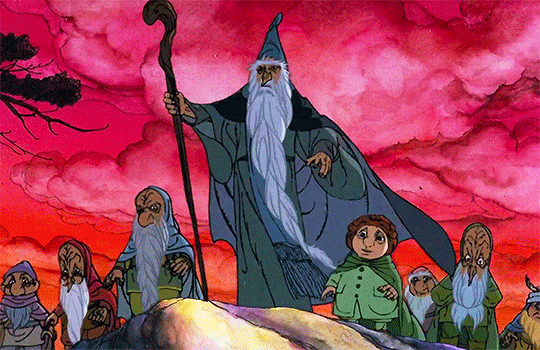
The Hobbit (1977; dir. Arthur Rankin Jr. and Jules Bass)
(Part One | Part Two | Part Three | Review)
The Last Unicorn (1982; dir. Arthur Rankin Jr. and Jules Bass)
(Part One | Part Two | Review)
Kiki's Delivery Service (1989; dir. Hayao Miyazaki)
(Part One | Part Two | Review)

Spirited Away (2001; dir. Hayao Miyazaki)
(Part One | Part Two | Review)
The Tale of the Princess Kaguya (2013; dir. Isao Takahata )
(Part One | Part Two | Part Three | Review)
Wolfwalkers (2020; dir. Tomm Moore and Ross Stewart)
(Part One | Part Two | Review)

Onward (2020; dir. Dan Scanlon) (Part One | Part Two | Review)
The Thief of Bagdad (1940; dir. Michael Powell, Ludwig Berger, and Tim Whelan) (Part One | Part Two | Review)
Orpheus (1950; dir. Jean Cocteau ) (Part One | Part Two | Review)
Ugetsu Monogatari (1953; dir. Kenji Mizoguchi and Kazuo Miyagawa) (Part One | Part Two | Review)

The Seventh Seal (1957; dir. Ingmar Bergman)
(Part One | Part Two | Review)
Jason and the Argonauts (1963; dir. Don Chaffey)
(Part One | Part Two | Review)
Kwaidan (1963; dir. Masaki Kobayashi)
(Short One | Short Two | Short Three | Short Four | Review)
The Holy Mountain (1973; dir. Alejandro Jodorowski )
(Part One | Part Two | Review)

Clash of the Titans (1981; dir. Desmond Davis)
(Part One | Part Two | Part Three | Review)
Legend (1985; dir. Ridley Scott ) (Part One | Part Two | Review)
Darby O'Gill and the Little People (1959; dir. Robert Stevenson)
(Part One | Part Two | Review)
The Purple Rose of Cairo (1985; dir. Woody Allen)
(Part One | Part Two | Review)

Wings of Desire (1987; dir. Wim Wenders) (Part One | Part Two)
Death Becomes Her (1992; dir. Robert Zemeckis)
(Part One | Part Two)
Orlando (1992; dir. Sally Potter) (Recap)
The Secret Garden (1993; dir. Agnieszka Holland) (Recap)

Omnibus: Film Reviews
#user365#365 movies 365 days#365 movies a year#365 movie challenge#365 days 365 movies#fantasy#fantasy march#fantasy genre#fantasy movies#fantasy film#movies#movie review#movie recap#movie rec list#movie recommendation#film tag#filmblr#film tumblr
2 notes
·
View notes
Text
Musical December I: Singin’ in the Rain (1952) - Review
Well...this movie is perfect.

I know, I KNOW, this is the lazy answer, it would seem. But I mean it...this is an amazing film, and I genuinely can’t find any flaws with it. Like, seriously. I’m making this post as a formality, but there’s very little for me to say here. It’s an excellent musical, it’s an excellent film, it’s just excellent.
But OK, I’ll do a breakdown, I promise. It’s a good opportunity to test something out. See, given the fact that I’m covering musicals at the moment, it’s a good chance to change up the review scheme just a little bit. Here’re the changes:
Cast and Acting: Still basically the same, but singing talent and ability will now be included in the criteria for judgement.
Plot and Writing: This is in reference to the overarching plot, the use of music within the plot, and the writing during the spoken portions. Songwriting will be covered elsewhere.
Directing, Cinematography, and Choreography: Just what it looks like; we’re adding choreography to this category.
Production Design and Editing: We’re folding these together this time around. Why? Well...
The Songbook: Yeah, this has to be its own category, since we’re talking about musicals. Obviously, a proper songbook is also a part of writing and choreography, but this category is focused upon the quality of the songs in and of themselves. So, the songbook gets its own category.
And with that...

Check out Parts One and Two for the Recap!
Review
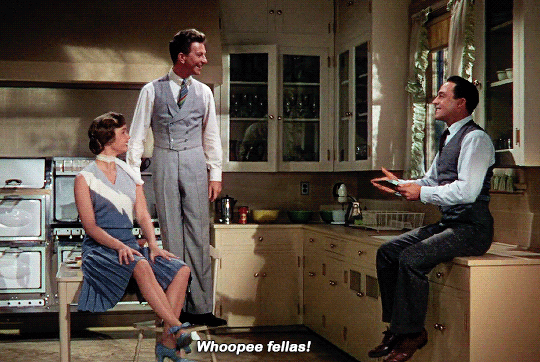
Cast and Acting: 10/10
God, I love these guys. Gene Kelly, Donald O’Connor, and Debbie Reynolds are, individually and together, some of the most enjoyable and charming protagonists I’ve ever seen in a musical. I genuinely love seeing them interact whenever on screen, and in any combination of the three characters. They’re genuinely perfect in terms of their interpersonal chemistry, and just a genuine delight.
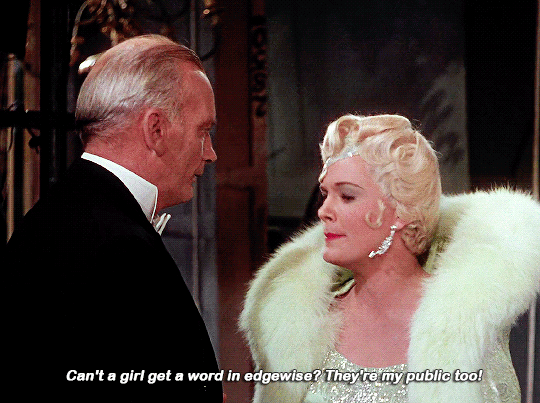
And obviously, they’re not the only notable actors in the film. Millard Mitchell shines in the latter half of the film, Cyd Charisse ekes mystique in the “Broadway Montage” sequence, and Jean Hagen...holy shit, Jean Hagen. Jean Hagen is a funny and despicable villain in this movie, and I grew to love her squeaky-ass voice (which is not her real voice, of course). She’s a horrible and petty person, but I had a lot of fun watching her. I had no problems with anyone at any point, seriously.
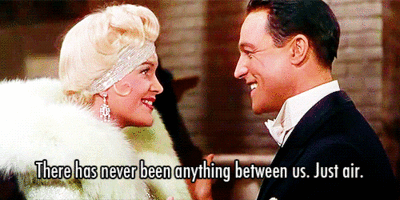
Plot and Writing: 10/10
The plot is fantastic, and well-done. But the writing! OH, THE WRITING! For a musical film, for a member of a genre with no obligation to use spoken words to get plot and story across, the writing in this movie has no business being as funny as it is! Not only do actors like O’Connor, Kelly, and Hagen say them with such perfect timing and grace, but writers Adolph Green and Betty Comden just genuinely wrote a funny-ass movie! God, some of the lines in this movie are amazing. Any interaction between Hagen and Kelly is bound to be funny in it pure acridity. And O’Connor is just constantly funny. Just...fuck, I love this movie.
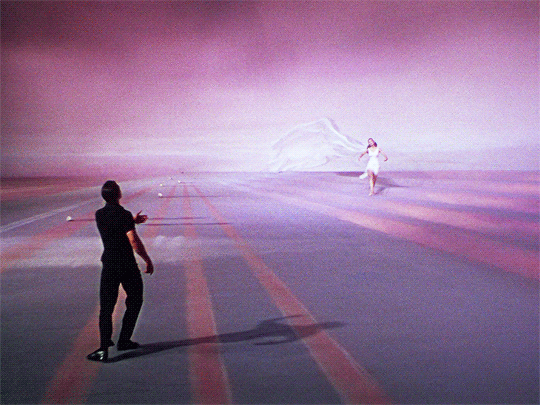
Directing, Cinematography, and Choreography: 10/10
THIS MOVIE HAS NO BUSINESS LOOKING THIS GOOD. From Gene Kelly and Stanley Donen’s amazing direction and choreography, all the way to Harold Rosson and his cinematography, the look of this movie is stellar from bottom to top. And I do mean how the film is shot and composed, to be clear. Not only are there some downright gorgeous shots, but the way that the musical numbers and dances are filmed is masterful. That is, of course, on top of the already masterful dance numbers. I will gush about Kelly and O’Connor until the day I die, and about the Cocteau-esque ballet sequence far after that point. It’s stellar. And that still isn’t including the next category!

Production Design and Editing: 10/10
Y;know, I considered giving this one a 9/10, purely on Adrienne Fazan and her editing. That’s because of the Broadway sequence, because I’d roginally thought that it was too long. But honestly, real fucking talk? It’s still a beautiful and flawless sequence! It drags a little, but I wouldn’t skip it at all! And if I were showing this film to anybody for the first time, I’d laud this entire sequence! The production design is stellar throughout the movie, but this sequence is particularly spectacular on that front. So, yeah, even the thing I like the least about the film is STILL too good for me to take a point off. Production and art design are fucking flawless.
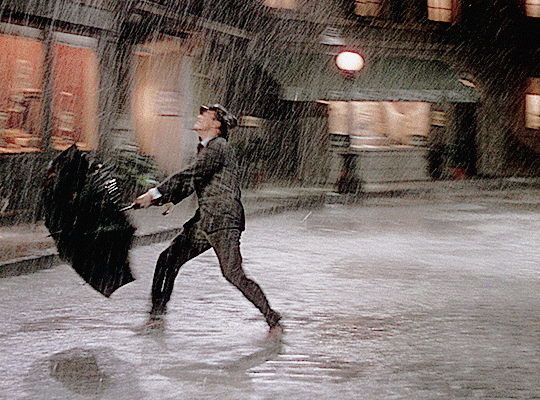
The Songbook: 10/10
...WELL? WHAT THE FUCK DO YOU WANT FROM ME, IT’S SINGIN’ IN THE RAIN, FOR CHRISSAKES
Yeah, it’s perfect! The songbook, for literally being cobbled together from older songs and movies, is executed absolutely perfectly. It’s so utterly flawless, that the songs aren’t associated with any other musical but this one! It’s a jukebox musical that broke the fucking jukebox! And during these sections, by the way, I’ll be going into my favorite song of the musical. And for this one, that’s a nearly impossible question. “Singin’ in the Rain” is obviously a timeless classic. I’m a huge sucker for “Good Mornin'” as well, and both “Fit as a Fiddle (And Ready for Love)” and “Moses Supposes” are fun as hell. But I said this was a nearly impossible question.
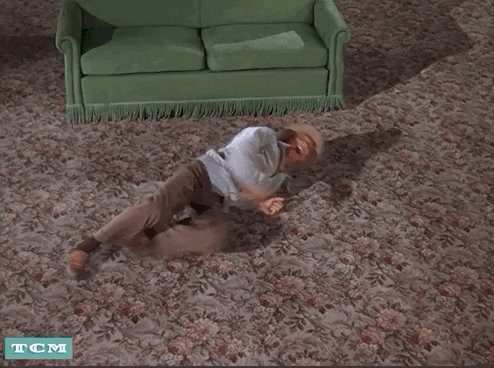
Holy shit, do I love this song, and this scene.
This is, without a doubt, my favorite song in the film. Not only is the song memorable and a lot of fun, but Donald O’Connor’s vocal and physical performance will never leave me. It’s genuinely one of my favorite sequences in any film, and I love it more than I could possibly express. God...God, I love this movie.

Yeah. 100%. Genuinely one of my top favorites.
Which, yeah, is crazy for the first musical of the month. How in the hell am I gonna top this? Understand, this movie is amazing. If you haven’t seen it, I highly recommend watching it at least once. I’m gonna watch it far more than that. This is one of those movies that, if it’s on, I’m watching it. It’s just unabashedly joyous and happy, and I can’t resist movies like that. Has no business being this good, but it is.
It’s moments like this that I wonder if I’m exaggerating. Maybe the emotions from the film are still lingering, and maybe time will temper my judgement. But I genuinely don’t think so. Just in case, I’ll go into the next one. Gonna be another film from the ‘50s, another film from the long list of musicals I should’ve seen by now, and another musical prominently starring a ghost singer. And finally...it’s a film that I am a little scared to watch.

Next: The King and I (1956), dir. Walter Lang
#singin' in the rain#singing in the rain#singin' in the rain 1952#film:singin' in the rain#singin in the rain#gene kelly#stanley donen#arthur freed#donald o'connor#debbie reynolds#jean hagen#millard mitchell#cyd charisse#movie musical#musical film#musical genre#musical december#musicember#user365#365days365movies#365 movie challenge#useralex#musicalsgifs#usercarol
69 notes
·
View notes
Text
31 (Films) to Life: Rashomon (1950) - Recap and Review
Akira Kurosawa. FINALLY I get to Akira Kurosawa!
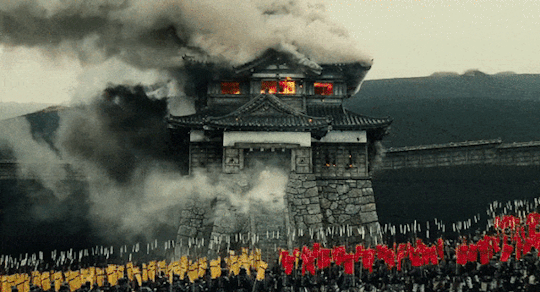
You guys have no idea how much I’ve wanted to get to a movie of his, oh my God! Dude is one of the most legendary film directors of all time, and this is the first movie of his I’ve ever seen? This is why I do this project! I know a lot about movies, but damn me if I’ve seen ‘em. So, OK, who is the legendary Japanese director? Biography time!
Kurosawa was born in 1910, in Tokyo, Japan. His father was a descendant of samurai, while his mother was from a commoner family. Basically, he had a quintessential Japanese background. But even then, he was exposed from an early age to the Western world via the majesty of film, while also growing up in the seat of modern Japanese history. He witnessed the aftermath of the 1923 Kanto earthquake and subsequent massacre, he studied calligraphy and Kendo, and all the while grew his interest in foreign literature and film. The guy was becoming a very interesting man. After a couple of family tragedies (the deaths of his two brothers), the 23-year-old Kurosawa pursued his interest in film.
After joining the studio that would eventually make Godzilla, Akira graduated from assistant director to fully-fledged director by 1941, when

D’ohhhhhh, fuck. Right. World War II.
So, Japan gets involved in some major global conflict, and Kurosawa’s Western-influenced filmmaking becomes a little less favorable, for obvious reasons. He winds up making a number of propaganda films, which actually prompts him to develop a method-acting/filmmaking style that he would use for the rest of his career. He was also introduced to an actress named Yoko Yaguchi during this time, and the two didn’t get along very well.
So, after Akira and Yoko got married and had kids, he made a sequel to his first Western-influenced film, which was a lot more propaganda than film. It bombed critically, and Kurosawa changed tactics. He went less Western and more censor-friendly...in 1945. Wait, whahappun in 1945 Japa

D’ohhhhhh, fuck. Right. World War II.
So, Japan loses some major global conflict, and Kurosawa’s less Western-influenced filmmaking becomes a little less favorable. The USA is now occupying Japan, and they ban one of Kurosawa’s films for being to Japanese, even though it was already banned for not being Japanese enough. Dude can’t catch a break.
Instead of focusing on societal values, Kurosawa’s new films reflected inwards...and also criticized elements of society for good measure. In a post-war Japan, these films became successful, and Kurosawa brought back his Western influences to great acclaim. During this time, he also met Toshiro Mifune and Takashi Shimura, both of whom would become Kurosawa staples for the rest of their careers.
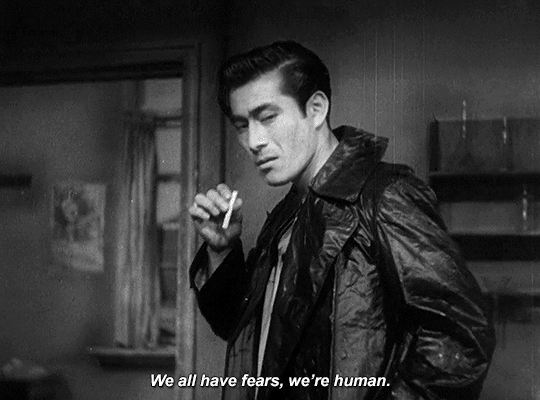
1948′s Drunken Angel launched Kurosawa into fame, even overcoming American cencorship to exert his own directorial vision. Mifune and Shimura were also launched into fame, and Japan loved all of them. Now it’s on. Film after film after film! Kurosawa starts his own production company, and teams up with people he would work with for the rest of his career. He made some of the first buddy cop movies (anywhere, not just in Japan), and also used his films to make more social commentary...in Japan. But he wouldn’t break out until...

Well, hey, it’s today’s film, the groundbreaking Rashomon!
Yeah, this movie, which I am very excited to see, officially launched Kurosawa to international fame. Ironically, though, it wasn’t super well-received in Japan at the time. It was still a success commercially, though, and Kurosawa began other projects. He adapted a Dostoyevsky novel (The Idiot), released Rashomon in the USA (to roaring acclaim), and almost single-handedly launched enthusiasm for Japanese film overseas. If it weren’t for him, films like the previously discussed Ugetsu might not have made it overseas.
And THEN, if that weren’t enough, he made and released Seven Samurai, which everybody loved. Considered one of the best films ever made, from Japan or anywhere, it inspired countless remakes and tropes...and I STILL HAVEN’T SEEN IT. One day soon, I goddamn promise. He then did another film I’m dying to watch, a Japanese-style adaptation of Shakespeare’s Macbeth, called Throne of Blood. It’s Macbeth...with samurai.
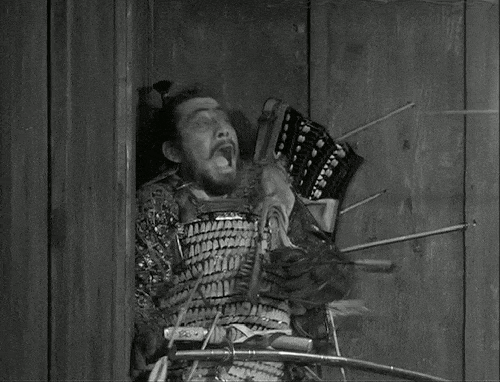
Is that not fucking BADASS?
But at this point, his works were a bit more pessimistic, and had lost the favor of Japanese audiences a bit. In response, he made an action-adventure comedy called The Hidden Fortress. It was so popular in Japan and elsewhere, that it eventually inspired a small indie film in America.

DO YOU UNDERSTAND HOW INFLUENTIAL THIS MAN IS?
At this point, it’s pointless to keep recounting Kurosawa’s career, outside of saying that the man was a brilliant filmmaker until the very end. His two children also became involved in the film industry, and Kurosawa became more involved in films abroad. He helped make a film about Pearl Harbor (Tora! Tora! Tora!), which went...badly, unfortunately. It actually resulted in a professional disaster, and the reveal of corruption within his production company. It almost ended his career.
Almost. He persisted for a number of years, but didn’t make it very big for a while. That’s when new director and massive fan George Lucas took notice of Kurosawa’s faltering career, and funded his latest film, Kagemusha. And it was a MASSIVE success worldwide. Kurosawa’s back, baby! But now what? Easy: his masterpiece. Another Shakespeare adaptation translated into Japanese culture and history. An epic film based on the epic play King Lear. And this...this? This would be glorious.
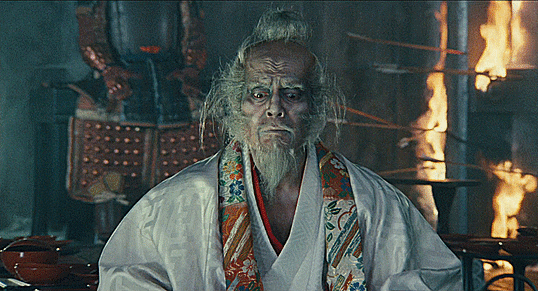
Look at that shot. LOOK AT THAT FUCKING SHOT
This was Kurosawa’s favorite film, and the one he considered his best. And while it was a success everywhere, it wasn’t as appreciated as his previous films. Great film, maybe, but a little past its time, unfortunately. Still, he planned his next film. But there were some issues, personal and professional. In terms of the latter, Japanese studios still didn’t want to finance his films. But hey, look, it’s recent successful director Stephen Spielberg, here to save the day! Awesome! Less awesome was the personal changes in his life. In 1985, the year Ran was released, Kurosawa’s wife Yoko died at the age of 64.
Still, things were going well. He made more films in the USA and Japan, including the well-received Dreams and the less well-received Rhapsody in August. But then, while writing film After the Rain, the 85-year old Kurosawa took a fall down the stairs and broke his lower spinal column. Wheelchair-bound, his directing career was over. His ideal way to die was on set, while filming a movie. Instead, Kurosawa lingered until 1998, when he died of a stroke at the age of 88. His last two screenplays, After the Rain and The Sea of Watching, were made by his children.

Akira Kurosawa is, and always will be, one of the greatest auteur directors the world has ever seen. A brilliant man, he pioneered the filming of movement, the usage of screen space and framing, and the depictions of complex morality in cinema. I am overly excited to watch this, the first of his major masterpieces, so let’s stop talking and get right-the-hell into it! Plot first, review afterwards!
SPOILERS AHEAD!!!
Plot (by Akira Kurosawa and Shinobu Hashimoto)
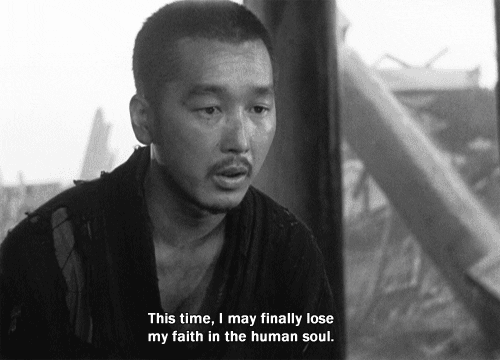
It’s a rainy day in medieval Japan. Woodcutter Kikori (Takashi Shimura), priest Tabi (Minoru Chiaki), and a commoner (Kichijiro Ueda) are staying dry under the Rashomon gate. The commoner is newly arrived, and sees the bereft woodcutter and priest. See, the two have just come from a trial for a murder and rape, and are extremely confused. With a bunch of disasters n the past few years, something about this trial has pushed the two over an existential breaking point. So...what the hell happened? Well, it all started in a grove.

Earlier that day, Tabi saw a Samurai (Mayasuki Mori) and his Wife (Machiko Kyo) walking through the forest. A bit later than that, Kikiro was walking through the same forest, and he comes along the woman’s abandoned hat, and the husband’s abandoned cap. He also finds a cut rope, an amulet, and then oh, look, a body!
Three days pass, and the trial happens. The woodcutter and the priest are called as witness to the body of the samurai. Also called is a man who caught the suspected suspect, Tajomaru (Toshiro Mifune). Tajomaru is an erratic and chaotic bandit, who had stolen a horse and collapsed due to a “venomous snake in the river”, which is absolutely a reference to a parable of some kind, I’m sure. Anyway, Tajomaru decides to confess to his crime. And now begins the real claim-to-fame of the movie: the Rashomon effect. In other words, let’s hear the bandit’s story.

The Bandit’s Tale
Tajomaru was resting peacefully in the woods, when the Samurai came along with his wife. And at first, he doesn’t care. But then, he sees the Samurai’s Wife, and it’s love at first sight. Dude is absolutely smitten with her, so he comes up with a plan. He tells the Samurai that he’s found a bunch of swords and mirrors in some forest ruins, and offers them for sale. He lures him away, ties him up to a tree, then goes to take his wife.
He brings her to see how pathetic her tied-up husband is. Initially, she fights him with a dagger of her own, but over the course of the fight becomes enamored with him. And yeah, they have sex. Remember, though: this story is being accounted by the bandit. Anyway, he did what he wanted, and took her without killing the samurai. But as he’s about to leave, she tells him that either he or the samurai now had to die, as her honor had been taken from her by the whole affair. They two battle fiercely, with Tajomaru managing to match the samurai’s skill. It’s a genuinely impressive fight (they crossed swords 23 times, according to Tajomaru). However, in the end, the samurai falls to Tajomaru’s sword, and the wife runs away. Her dagger is, notably, unaccounted for.
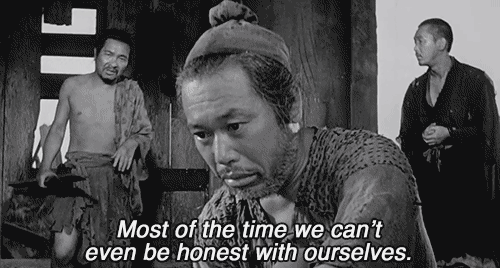
Back in the present, Kikori claims that this story was a lie, as was the story from the upcoming witness: the Samurai’s Wife. The commoner isn’t surprised, and says that it’s human nature to lie. This still shakes Tabi the priest, who recounts the next testimony.
Next witness!

The Wife’s Tale
While Tajomaru painted her as strong and a fighter, the Wife is absolutely not that at court. Weeping and pathetic, she recounts her version of events to the unseen judges. We skip over the beginning with the trick, and go right to the samurai being tied up to the tree. Tajomaru leaves her there after...well, raping her. He’s a rapist. Disgusting. He unties the samurai, then runs off laughing, leaving the wife sobbing and shattered. She looks up to her husband for forgiveness and pity. He gives her only scorn, as he blames her, like a victim-blaming piece of shit.
Seeing the pure cold hatred he regards her with now (again, like an asshole), she pleads with him to stop his wordless cruelty. But still, he stares. She cuts his remaining ropes with her dagger, and tells him to kill her to spare her of the shame. But still, the asshole just stares at her in scorn, not wanting to give her the satisfaction. God, this dude’s a dick. It’s a time period thing, I know, but still fuck this dude. The wife agrees, and with dagger in hand...she faints. And when she awakens, her pearl dagger in plunged into the samurai’s chest. She tried to follow him into death via suicide, but failed, and recounts this as she collapses on the ground, weeping once again.
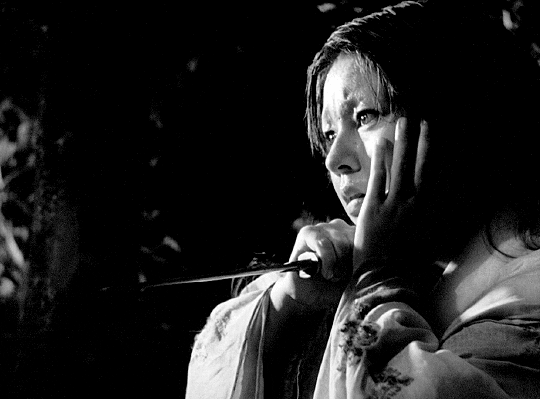
Even the commoner’s not sure what the right story is, although he’s inherently distrustful of the Wife due to her womanly wiles. But she wasn’t the last of the witnesses. There was yet one more to step up to the stand: the samurai himself, through a medium that channeled his ghost. And the woodcutter also insists that the ghost was lying as well. Why? Who knows? Time for another story.

The Samurai’s Tale
Speaking through the medium (in a way that is GENUINELY UNNERVING, i AIN’T GONNA LIE TO YOU, the Samurai claims to be speaking from a dark abyssal hell. As a sudden and ominous wind whips around her, we join the samurai tied to the tree. He claims that Tajomaru did not leave after violating his wife, and instead proposed that she join him on his travels. She accepts the proposal, right in front of the samurai, much to his dismay. But before they leave together, she insists that Tajomaru kill the Samurai in order to free her from their bond.
But instead of that, Tajomaru gives the Samurai the choice of killing his wife or letting her go. The Samurai notes that he was willing to forgive the bandit of, y’know, raping his wife. Yeah, still fuck the samurai, by the goddamn way. The Wife escapes, and Tajomaru chases her, only to lost her in the forest. He comes back and frees the samurai from his bonds, before escaping himself. And the emotionally broken Samurai, seeing his wife’s pearl dagger lying on the forest floor, does that thing samurai do when they’ve lost their honor, and commits seppuku with it amongst his own stifled sobs. And yet...the dagger is gone when the samurai’s body is discovered. And the wind stops. Everything is silent.
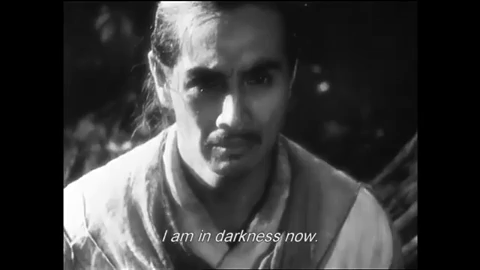
But here’s the thing. Here is the goddamn thing. They were all lying. The man was killed by a sword, not the dagger, casting at least tow of their stories into serious question. And who produces this revelation? Kikori, the woodcutter. And how does he know this? Easy.
He actually saw what happened. Yup! The whole time, Kikori was lying to the court, in the ultimate display of hypocrisy. He came across the scene, post-rape, and the story he tells is a mixture of the stories, with some pathetic realism ladled in for good measure.

The Woodcutter’s Tale
Tajomaru did indeed propose to the Wife, as the Samurai said. However, she was extremely bereft...until she suddenly snaps out of it and cuts her husband’s bonds loose. She leaves the two men to battle over her, only for the Samurai to disown her, refusing to fight for her. He literally tells her to kill herself for being with two men (again, fuck the Samurai), and slut-shames her for BEING RAPED. Jesus Christ, seriously, fuck this guy.
Here’s the thing, though: nobody is good here. The Samurai’s a piece of shit, Tajomaru is, well, a thief and a rapist, and the Wife? Well, when Tajomaru also begins to leave, she pretends to break down and cry to gain their pity. She then breaks out into riotous laughter, calling both men cowards and weaklings who refuse to kill each other for her. Yeah, uh, it turns out that she’s actually a fucking sociopath who hates her husband and kinda seduced Tajomaru in order to get him to kill her husband. Everybody’s a piece of shit here.
youtube
But then, when the men actually DO plan on fighting over her, she realizes what she’s done, and draws back in fear of them both. Neither man wants to fight, and instead of the majestic and honorable fight Tajomaru had painted, what ensues is actually a really shitty sword fight. It’s clumsy, it’s kinda pathetic, it’s dirty, and it’s just a bad fight. Tajomaru said they crossed swords, 23 times? I don’t think they crossed swords once. Seriously, it’s a really shitty fight (on purpose, obviously).
In the end, Tajomaru does indeed kill the samurai with his sword, and really pathetically at that. While the Samurai got in one good slash to Tajomaru’s leg, the bandit is mostly unscathed. But when he tries to get the Wife as promised, she instead runs away from him, as he trips because of his injury. And all this s watched by the woodcutter from within the forest.
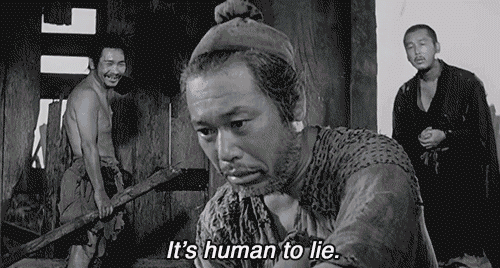
But why lie? The woodcutter is conflicted, the priest is bereft at the realities of morality, and the commoner is amused. As they share their views, they hear a baby crying from within the gate. Abandoned by its parents alongside a kimono and an amulet, the three men rush to them. The commoner steals the kimono and amulet, to the chastisement of Kikori. But the commoner’s figured it out: it’s all about the dagger. The woodcutter lied because he stole and sold the missing pearl dagger. He is “a bandit calling another a bandit”. All men are selfish.
The commoner, laughing, leaves, and Tabi the priest has lost his faith in humanity. He holds the child, and he and Kikori stand there in silence, reflectig for a long while on themselves and the nature of humanity. Tabi attempts to care for the crying baby, and Kikori offers to help. Tabi recoils, afraid that Kikori is planning on staling something from the baby. However, he reveals that he wishes to take the baby, in order to care for it alongside his six other children. Tabi apologizes for his words and feelings, and Kikori admits that he doesn’t blame him because of what he did. But Tabi thanks him. His selfless act of caring for the child has restored what remains of his faith in humanity. The clouds part. And the sky is clear and bright again.

...Well, shit. It’s a 100%.
I literally can find no faults with this movie. Going through my categories, this is a perfect film. Here, here, I’ll prove it, OK?
Cast and Acting - 10/10: Look, this contains a lot of Japanese film heavy-hitters. Takashi Shimura (we saw him in Kwaidan), Machiko Kyo, Mayasuki Mori, (saw both of them in Ugetsu), Minoru Chiaki, and...holy shit, Toshiro Mifune BABY! Not only is Mifune a Kurosawa staple, but the man is goddamn FANTASTIC in this movie. Over-the-top, but in the absolute best ways. God, I love this dude. Anyway, everybody was awesome.
Plot and Writing - 10/10: The construction of the plot is so legendary that it created an entire storytelling convention that exists TO THIS DAY. If ever Batman: The Animated Series uses this format, you’ve done something right. Simple story, but the way it’s told alongside using it to reflect upon human nature and self-preservation...chef’s kiss, baby.
Direction and Cinematography - 10/10: It’s Akira Kurosawa. The fuck do you want from me? Kazio Miyagawa also deserves credit for cinematography!
Production and Art Design - 10/10: How do you make a bamboo grove iconic? Hell, how do you make rain iconic? Watch this movie.
Music and Editing - 10/10: Atmospheric score by Fumio Hayasaka is fantastic, but the editing by Kurosawa himself enhances it and everything else in this movie. I...fucking love this movie.
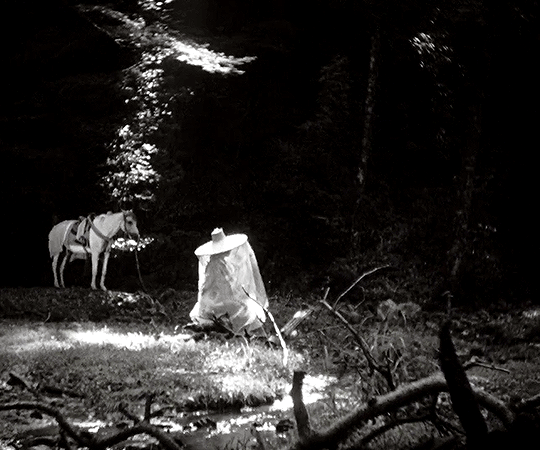
Damn. Off to a great start here. OK, next on my list iiiiiiis...OOH Rififi! One of the greatest heist films of all time! It is on HBO Max, like Rashomon? Hmmmmm, nope. OK, what about...how about...OK, but...
...It’s nowhere? I have to buy the DVD? Well...shit. I’m not gonna do that! Dammit. Another time, Rififi. So, yeah, what’s next? Oh...it’s an American heist movie. Well, OK. Let’s see how this one goes.

Next: The Killing (1956); dir. Stanley Kubrick
#rashomon#film:rashomon#rashomon 1950#akira kurosawa#toshiro mifune#machiko kyo#masayuki mori#Takashi Shimura#minoru chiaki#user365#crime film#Jidaigeki#31 to life#31 films to life#userdeforest#userdiana#classicfilmblr#f:rashomon
29 notes
·
View notes
Text
Musical December I: Singin’ in the Rain (1952) - Recap: Part Two
Since this is a movie about ghost singers...
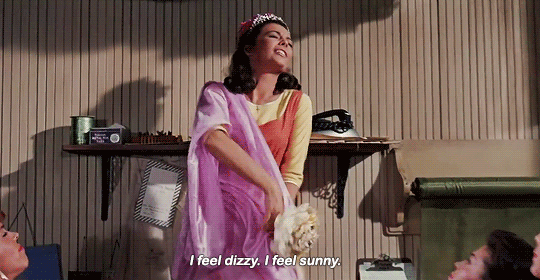
Ghost singers dub the singing voices of the stars of musical films. Essentially, if the actor or actress has a poor voice, or a voice that isn’t quite up-to-par, the ghost singer is hired to dub over their voice with their own rendition of the song. Now, there have been a lot of famous ghost singers, but you may not actually know their names. Historically, they tend to be uncredited in film. Which, yeah, is REAL SHITTY. Thankfully, however, we do know a few of them today.
Arguably one of the most famous is Marni Nixon, the ghost singer for Natalie Wood in West Side Story. Yeah, Wood’s performance wasn’t stellar, apparently, and the film producers didn’t even TELL her that she was going to be dubbed by Nixon. And as a result she recieved...no direct royalties! Instead, she got (and I am not kidding) 0.25% of Leonard Bernstein’s royalties! Fuck off! She literally had to go to court for this, and got royalties from the soundtrack.
And here’s the crazy thing: you’ve also heard her in these roles:
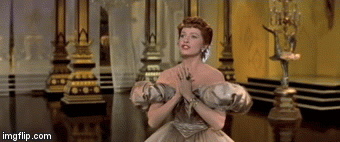
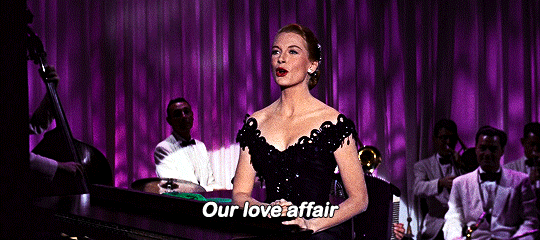
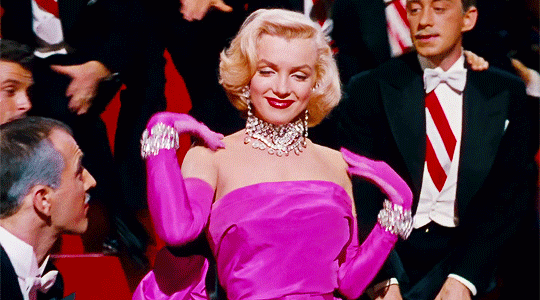
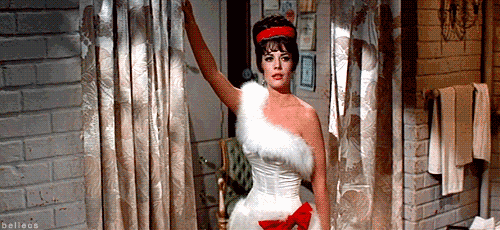
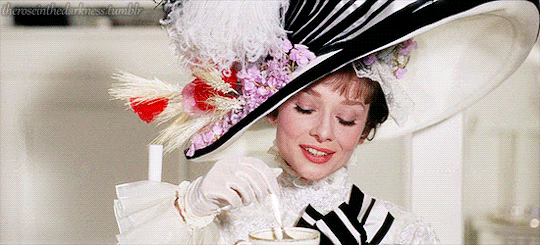

Yeah, uh...holy shit.
And while we’re at it, let’s talk about Betty Noyes. We at least know the roles that Marni Nixon took, but Betty Noyes was so prolific, we actually don’t have a confirmed list off all of her credits! Just fuckin’ suspicions! Now, granted, there are a few roles we know she did dub for. One was in Seven Brides for Seven Brothers, which I might watch this month. Another is...well, we’ll get to that one later. And the other major role?
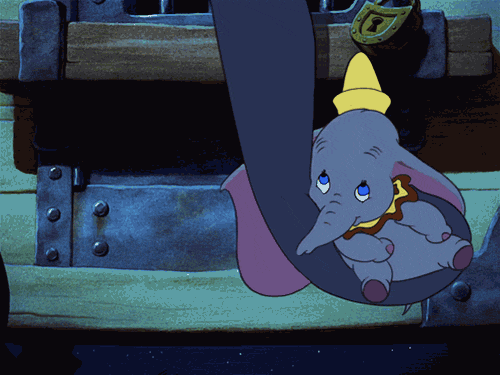
Yeah, she was Dumbo’s mom!
Noyes was actually nominated for an Oscar for that song, indirectly! Because none of the voice actors in the film were actually credited, Noyes went unknown as the voice actor for this film for far too long. And again, that’s not including the films she dubbed in that we just don’t know about! Man, Hollywood.
These two, of course, are some of many ghost singers in cinema. Betty Wand, Bill Shirley, Bill Lee, Thurl Ravenscroft, and Drew Seeley come to mind. And that last one? Oh, you’re gonna love this.
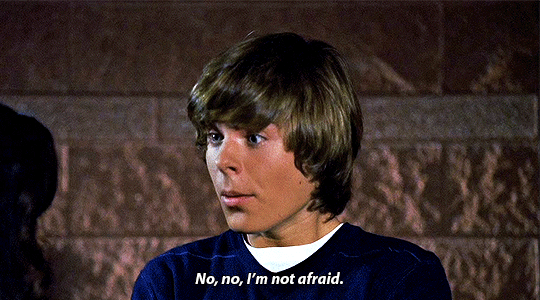
In the first High School Musical, most of Zac Efron’s lines were ghosted by Drew Seeley. This shit is still happening! Although, to be fair, Efron sung a few lines, and then sang all of his songs for the second and third films. But still, this practice is still in existence!
And so, with that said, a movie about ghost singers in genuinely an interesting choice for a musical. And that is especially because...well, we’ll get there. We’ll get there. For now, back to the show!
Check out Part One here!
Recap: Part Two
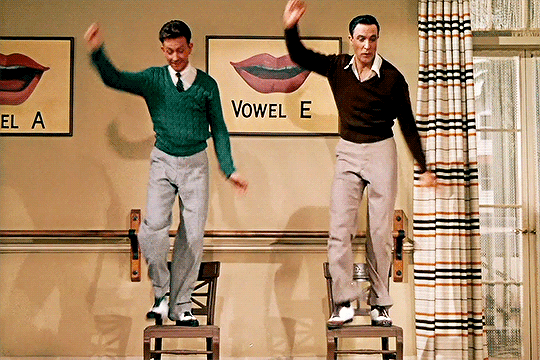
In order to prepare for being talkie stars, both Lina and Don go to diction coaches. Lina’s lessons go horribly, but Don’s literally ends in another musical number (”Moses Supposes”) with Cosmo. It’s a fun number, but they also ruin this man’s entire office. Jesus, guys, a little respect for the man’s working space.
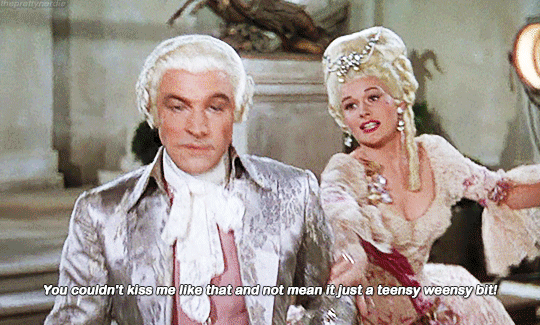
Filming begins once again, and the director, Roscoe Dexter (Douglas Fowler) has an actual mental breakdown with the difficult sound setup, and Lina’s complete idiotic inability to adapt. The film comes out, to the great nervousness of all the filmmakers. And unfortunately, Lina’s horrible voice, and the equally terrible sound recording quality makes the audience (and me) crack up with laughter. There’s a lot that happens, but it’s pretty clearly going to be a horrible movie.
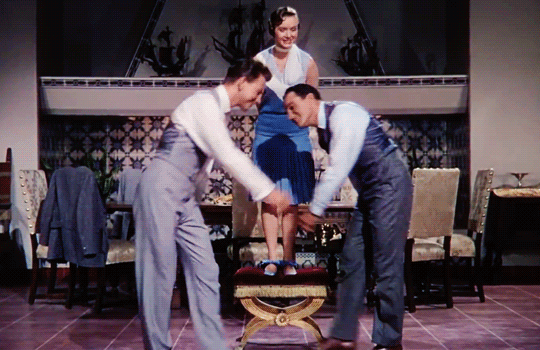
As the audience leaves, laughing and mocking the film, the stars (save Lina) realize that they’re completely fucked. In a dinner with Cosmo and Cathy, Lockwood laments his position. He also realizes that he’s not a good talkie actor, as he’s used to acting without sound. But the two friends pick him up and joke about going back into vaudeville.
But that gives Cathy an idea: why not turn the film (called The Dueling Cavalier) into a musical film! They have six weeks, making it a possibility. Excited, they talk into the morning, then sing a song about it (“Good Morning”, from Babes in Arms). And I love this song, but the entire time…all I could think about was the fact that Debbie Reynolds’ dress is the same as Quicksilver’s Silver Age costume. Seriously.
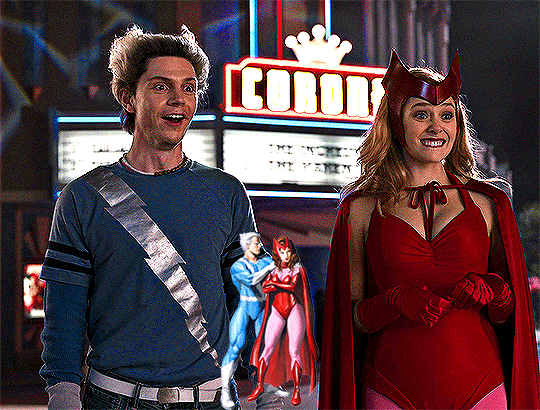
New head canon: Quicksilver is a BIG musical guy.
Anyway, after the song is concluded, the group realize that the issue with their plan is Lina’s voice. Cosmo has the brilliant idea to have Cathy dub over Lina’s voice in the final cut. Which is ironic because…well, more on that later. Anyway, it’s late. The party disbands, and Don brings Cathy home under the pouring rain. And well…you know.
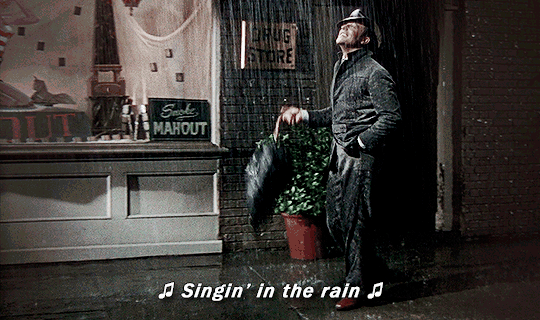
Yeah, this number (“Singin’ in the Rain”, from The Hollywood Revue of 1929), is arguably...what, did I just type “from The Hollywood Revue of 1929″? IT’S NOT AN ORIGINAL NUMBER?!? Wait, the namesake of this movie, the headliner song, the MOST FAMOUS NUMBER IN FILM HISTORY...is from a different musical? I...actually, you know what? Who cares?
Because this number is still arguably the most famous in musical cinema, as well as being beautifully done. Gene Kelly is the master of his craft, and he’s showing off in this number for sure. It’s just a happy and joyous number. And, again, if you’ve seen this movie and never done any of this dance in the rain, I feel sorry for you. You need to inject more joy into your life! Dance in a puddle, swing on a lamppost, trail and umbrella, confuse a policeman patrolling the street in the middle of the night! SOMETHING! It’s pure unadulterated joy in the form of song-and-dance, and I love it.
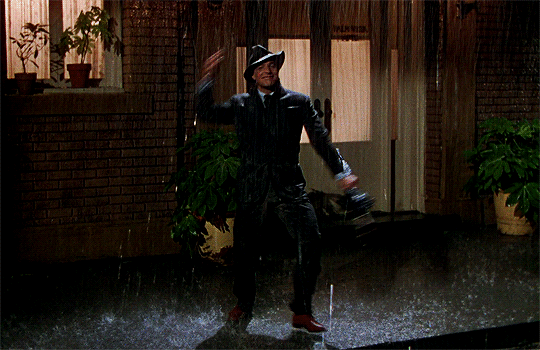
The next morning, the boys present the idea to Simpson, and he loves it. They rename the film The Dancing Cavalier, and Cosmo’s genuinely great film instincts allow the flawless reworking of the entire picture. Songs are written, Cathy gets to dubbing it, and Lena sings the original song. Horribly. And this is where the ironic part comes in.
See, the song being sung, “Would You”, features Cathy singing over Lina’s track. Thing is, though (and many of you reading probably knew this), Debbie Reynolds is NOT singing this song. Yeah, it’s actually Betty Noyes, a very famous dubbing voice actor for musicals from this time period. Meaning, yes, Betty Noyes is dubbing Debbie Reynolds, whose character is dubbing another character. Ironic.
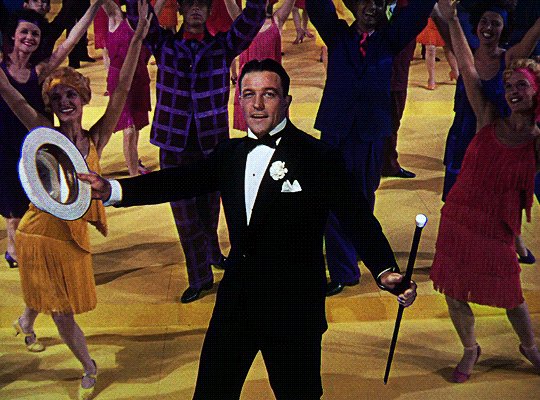
The plan goes off without a hitch, and Simpson is pleased. One more sequence is plotted out for the film. It’s a song called “Broadway Melody” (from various films), and takes place in the beginning of the hypothetical film. And it’s a ridiculously bombastic number. I love it. Holy shit, I love this movie. Seriously, there is nothing about this movie I dislike so far. This is absolutely lovely.
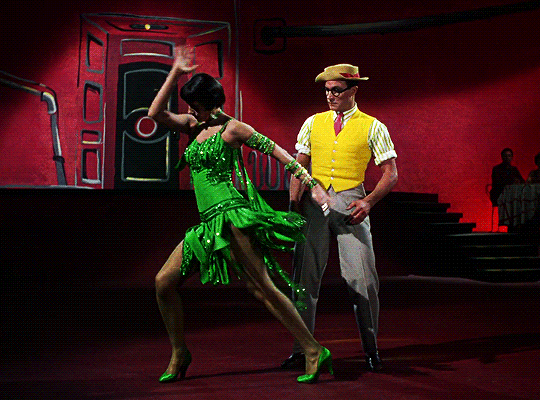
Those feelings are exemplified by this number, which serves as an interlude of sorts. It is LONG, and it concludes with a beautiful dance. The dress worn by the female dancer contains a flowing train, and off-screen fans make it seem ethereal. It’s genuinely a spectacular piece of art, and it's all about our musical’s main character falling in love with a woman (Cyd Charisse) at a casino, only to find that she’s taken. Instead, a coat and hat girl brings him his things, and he leaves the casino distraught. And this, remember, is meant to be the opening to the musical-in-a-musical. It’s a bit long and confusing…but it’s also spectacular. Like a little splash of Jean Cocteau’s Orpheus. Stellar.
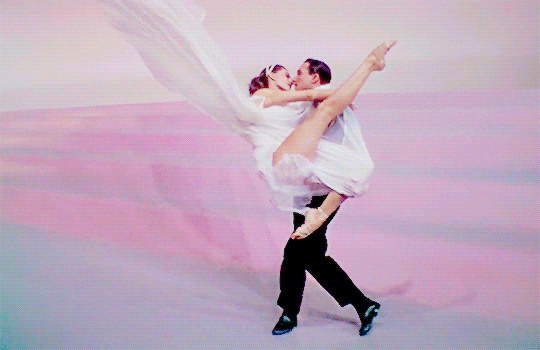
But the whole thing is quickly ruined by, who else, Lina. After finding out that Cathy’s acting as her voice, she flies into a rage, and plots to get Cathy’s name besmirched. She goes around the studio entirely, and sends out an exclusive story to every paper in town. The stories claim that she’s a big musical star, making it a massive problem for the studio to give the credit to Cathy, as planned. Due to her contract, she is in control of her publicity, not the studio. She also makes it so that Cathy’s only future job is as a dubbing artist for Lina.
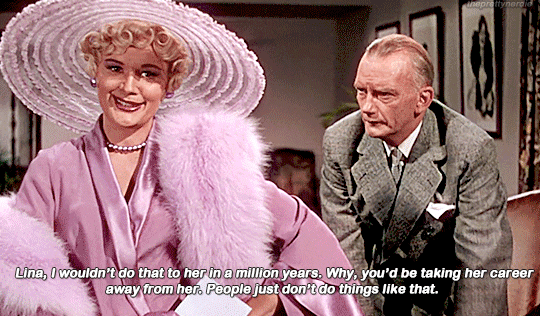
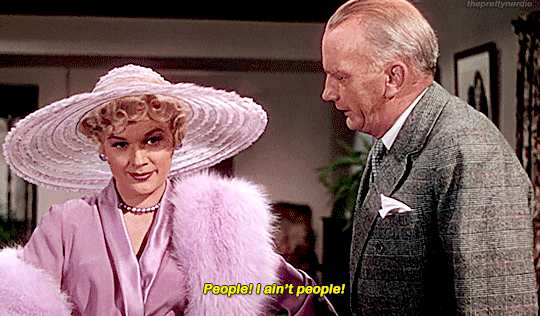
Fuck Lina, by the way; she’s a piece of shit.
The premiere happens, and the plan goes off without a hitch. The sound is fixed, the songs are great, and Cathy’s voice is beautiful. However, her credits are taken off of the film entirely, leaving her completely screwed. Because, again, fuck Lina. Said asshole gloats backstage as the crowd cheers. As the rest of them battle with the prima donna, she decides to go out and give a speech. Knowing that the situation will backfire on her, they let her do it.
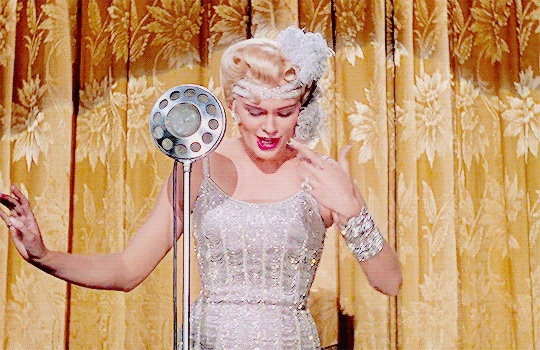
And IMMEDIATELY, upon hearing her real voice, the audience assumes that she’s doing a voice and asks her to sing for them. Seeing an opportunity, Don, Cosmo and Simpson plot as Lina panics. They tell her to go and sing, while Cathy dubs for her backstage. Don insists on it, enraging Cathy. She agrees to do it, though, and has Lina sing “Singin’ in the Rain” while she sings behind the curtains. And then…
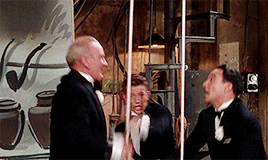
Sweet, hilarious karma.
The gambit’s up, especially when Cosmo steps in for Cathy. Lina runs off stage as the crowd laughs uproariously, while a shocked Cathy runs off stage. Don shouts into the audience, telling them to stop her! He gives her due credit as the voice they heard singing in the film, and she looks back at him with tears in her eyes. He serenades her, and they join in a duet on stage (“You Are My Lucky Star”, from The Broadway Melody).
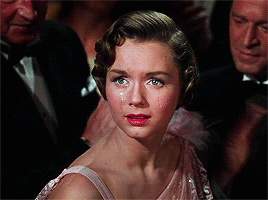
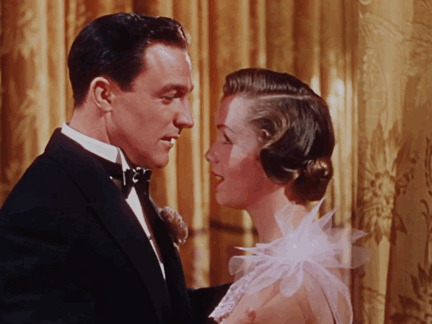
...100%. Not kidding. See you in the Review.
#singin' in the rain#singing in the rain#singin' in the rain 1952#film:singin' in the rain#singin in the rain#gene kelly#stanley donen#arthur freed#donald o'connor#debbie reynolds#jean hagen#Millard Mitchell#cyd charisse#movie musical#musical film#musical genre#musical december#musicember#user365#365days365movies#365 movie challenge#musicalsgifs#filmgifs#usergina#classicfilmsource
40 notes
·
View notes
Text
Musical December II: The King and I (1956) - Review
Talked about Anna; now let’s talk about the King.
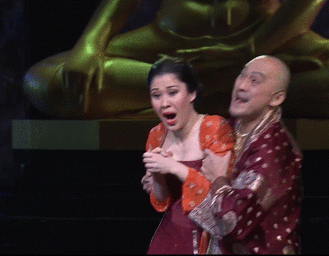
Born on October 18, 1804, Mongkut, or Phra Bat Somdet Phra Menthora Ramathibodi Sri Sinthara Mahamakut Phra Mongkut Phra Siam Deva Mahamakut Wittaya Maharaj (yes, really) was the legitimate son of a prince and princess, and became a Buddhist monk at the age of 20. Rather than immediately ascend to the role of king, he stayed a monk once his father died, and the throne went to an older half-brother of his, who was essentially voted into the position. Mongkut didn’t make any waves because he was cool like that.

When I saw Mongkut became a monk, he went all in on the monastic lifestyle. Traveled the country, strictly followed all of the monk rules, started a religious reform movement that eventually took over the religion for the entire country, yaddayaddayadda. Monk shit. After acting as a monk for 27 years (!), he was granted his rightful place on the throne after his half-brother died. And with that, his grand vision began.
See, YEARS before, Mongkut became the abbot of a Buddhist temple in Bangkok, and pledged himself in a modern education from the Western world. He studied astronomy, English and Latin, theology, the works. Mongkut really was a very educated man, and motivated to be further educated. He actually invited the preaching of Christian sermons IN A BUDDHIST TEMPLE. Dude was cool, is what I’m saying.

In fact, his coolness with the Western world is part of the reason for his succession of the throne. Mongkut beat out 72 other kids for power, and was supported by many members of the government and nobility. At 47, Mongkut becomes king of Siam. He was famous for his pro-British stance, which was notable due to Britain’s influence in the region. Siam’s neighbor, Burma, had been losing territory to the British Empire. Because, y’know, Britain be Britain. But Siam, amongst all of the kingdoms of Southeast Asia, would be the only one to stay independent.
Now king, Mongkut got busy with modernization...and also with not being a celibate monk anymore. Yeah, uh, he immediately gathered a fuckton of wives. And I mean a fuckton. In the end, Mongkut would have 32 wives and 82 children. And this was within only a 17-year reign, meaning he had a child every 3 months! Jesus, man!

Between fucking and...well, more fucking, Mongkut sought to appear as a modern Western nation. This was more political than anything else, as he’d wanted to prevent the nations of Europe from looking down on Siam, therefore preventing it from being colonized. Which, to be fair, definitely worked. This included a few ideological changes in the knowledge of Siam.
Firstly, the world was now officially round, which was squarely against Buddhist teachings. Understand how big a deal this is at the time. This is exactly the same as the evolution vs. intelligent design debate that still rages on in middle America and fundamental Christianity. Or the same as...people who believe that the Earth is flat today. FUCK, I forgot what timeline I lived in for a second, because this one is fucking ridiculous most of the time, Christ.

He continued this trend by having foreign missionaries from the USA and UK teach his family geography, astronomy, and English. He even was...relatively feminist. He released some of his concubines, ended forced marriage practices, and also ended the practice of using women as literal currency. Which, yes, was an actual thing at the time. So...kudos for that? Yeah, it’s below the very the bare minimum, but it’s at least an improvement.
But in the process, he still embraced Siamese culture through wardrobe and practices. He was still mostly faithful to his country and its beliefs, and he made that known to foreign emissaries. This culminated in the Bowring Treaty, which saw British emissaries from Hong Kong visit for economic trade reasons. See, traditionally, any member of the Siamese state would be threatened with torture for trading with foreigners. Which is, yeah, a LOT. But with an increasingly globalized world, that practice wouldn’t be sustainable for long. The Bowring treaty began trade agreements with Siam and Britain, and this began some revolutionary changes for the southeast Asian country over the next decade.
And now...enter Anna Leonowens.

Anna Leonowens came to Siam in 1862, and was hired as an instructor for the royal family. Which, again, was a super common practice at the time. Anna would end up making a lot of claims about her time there, most of which were heavily influenced or generally incorrect. For example, the Uncle Tom’s Cabin thing? Nope. Slavery was more like indentured servitude in Siam, for starters. And secondly, that practice would be ended 40 years after her visit there. So, yeah, Anna’s influence wasn’t really a part of that.
Secondly, the war elephants thing, much to my eternal regret, never happened. He never offered elephants to Lincoln to fight the Civil War. The letter was actually sent to James Buchanan, and just detailed a gift of normal elephants, for the purposes of breeding. I mean, if Jefferson can get a huge block of cheese, then Buchanan could get elephants. And it might’ve broken the ecosystem...but in an alternate universe, the USA is just a little bit crazier.

Lastly, Mongkut obviously didn’t die of a broken heart, for God sakes. Dude died of malaria after going on an expedition to watch a solar eclipse which he accurately predicted. Because Mongkut was an intelligent boss of a human being, and an absolutely brilliant man. And he wasn’t a vicious and violent barbarian trying to play at being a sophisticated Westerner. He didn’t need to be a Westerner, obviously. Dude was just a fascinating individual.
Which is probably why Thailand HATES Anna Leonowens.

To be fair, a lot of this has to do with the concept of lèse-majesté, which is the crime of saying that royalty or leadership sucks. We may shit all over America, but at least I have the ability to say Donald Trump was an absolute utter piece of shit without dealing with repercussions from the government. Freedom of speech and all that. To this day, in Thailand, any defamation against the royal family is straight-up illegal. Thailand is the only country with a constitutional monarchy to be heavily enforcing this law to this day. You can get three to fifteen years for speaking against royalty, with the most recent sentence from this year being a woman serving 43 years in prison! Christ, Thailand, what the hell!
Today, every single iteration of Anna Leonowens’ story is banned in Thailand, from the books to the play to the movies. This is, obviously, because of offense taken on behalf of Mongkut, and I don’t know if they’re wrong about that. Fact of the matter is, this franchise does represent a Eurocentric depiction of a foreign culture, and to problematic degrees as seen from a modern context.
But, uh...it’s still a great musical.

Yeah, the funny thing about problematic material is, while it deserves to be lambasted for its retrospectively negative qualities, it doesn’t mean that it doesn’t have good qualities! And maybe that’s a controversial viewpoint, but it’s how I feel. For example (and PLEASE hear me out, I beg of you), I still think Bill Cosby’s standup is genuinely funny (especially Bill Cosby: Himself), and The Cosby Show is a classic American sitcom that changed the way Black Americans were viewed, and how they viewed themselves. As a Black American, that show meant something to me and to my family. However, Bill Cosby? Still a rapist and a monster who hid behind that folksy image for decades. Yeah, he’s still absolutely a hypocritical piece of shit, but the man made good comedy, is all I’m saying. This is not an excuse for the man’s actions, just an acknowledgement of the quality of his work.
And hell, we accept a lot of problematic material in some of the greatest films ever made, because we recognize the quality of the film itself. Leon the Professional, as I discussed earlier this year, has some REALLY uncomfortable shit revolving around Natalie Portman and Jen Reno’s relationship, but it’s a good action film regardless. West Side Story is considered one of the greatest musicals ever made (and for good reason), but heavily features white actors dressing up as Hispanic characters, including the main Hispanic character. And Gone with the Wind is considered one of the greatest films ever made, despite having some of the most offensive stereotypes I’ve EVER fucking seen. Also, real talk, that movie pisses me off.
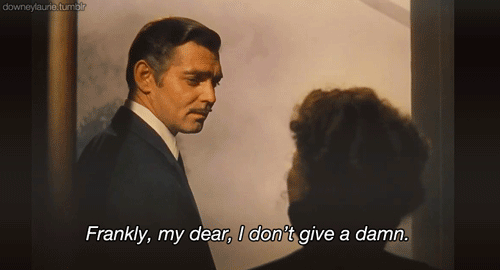
Recognize the problems, and try and see beyond them.
Yeah, this movie is historically inaccurate, technically features yellow face (yeah, uh, didn’t even talk about THAT bullshit, but Yul Brynner’s obviously not Thai), and is understandably banned in Thailand...but shit, it’s still a good movie. Perfect? Well...no. Definitely not perfect.
But let’s get into it, huh? Part One and Part Two of the Recap are right here!
Review

Cast and Acting: 8/10
Let’s talk Deborah Kerr first, because she is great as Anna Leonowens. Calm but strong, she gives the character the energy she needs, and is convincing as a caring teacher, single mother, and strong woman of the world that values herself and her beliefs. Seriously, Anna’s great, and Kerr does an excellent job playing her...during the speaking scenes. The singing belongs not to her, but to Marni Nixon, famous ghost singer and an excellent one at that. Check out my Recap of Singin’ in the Rain for more details about her and ghost singers. The supporting characters are also of note, even though I wouldn’t say they’re...great? Rita Moreno is playing Tuptim, and she’s not too bad. Same with Terry Saunders, Patrick Adiarte, and Martin Benson, who might actually be my favorite of the supporting cast. Didn’t talk about the Kralahome much, but he’s an interesting character who could’ve been used a bit more. But, uh...let’s get to the main event.
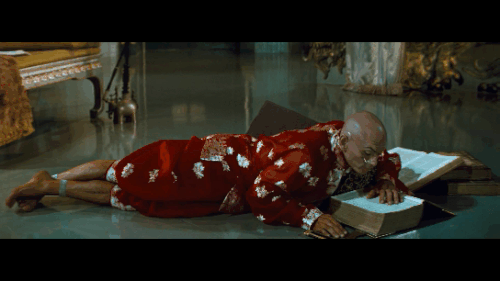
Yul Brynner is both amazing and...not amazing.
Genuinely, Brynner makes Mongkut the best character in the film, and absolutely the most entertaining when he comes on screen. And yeah, I mean that. Mongkut, inaccurate though he may be, is a fun character to watch, if not also somewhat frustrating. Which is likely the point. And Brynner tows the balance extremely well most of the time. His singing is...not great. It’s not great. And most importantly...he’s not Thai. Yeah, like I said above, I may not have mentioned it in the Recap, but it’s REALLY obvious. It was the times, I get that, and diversity in Hollywood was low, so I can somewhat forgive the movie for that. But it does get awkward, is all I’m saying. Brynner won Best Actor for this and...yeah, I didn’t get it at first, but with some time since watching the movie, I can acknowledge that he did an excellent job. So, yeah, he’s A Puzzlement, for lack of a better word.

Plot and Writing: 8/10
Honestly, this is a good story. Simple, but a good one that you don’t see too much. It should be an overwrought plot, but this film somehow makes it seem fresh? Obviously based off the semi-fictional books by Anna Leonowens and Margaret Landon, then adapted to film by Ernest Lehman, this is a well-written story and script...that’s clearly a stage musical. Yeah, uh, this is pretty obviously a Broadway musical adapted to film, in a way that Singin’ in the Rain and West Side Story aren’t. That, to be fair, may be due to the acting and direction, but the screenplay definitely doesn’t mess with the play’s script much. Or at all. And with that said...

Directing, Cinematography, and Production Design: 10/10
Oh, yeah, I changed this category then I realized that Production Design should just go here. Anyway, that point I made about the adaptation from stage to film? Yeah, Walter Lang did film this as a play, but added film flourish to it throughout. And it really works. Like, it REALLY works. Lang does a great job, as did cinematographer Leon Shamroy, because some of the shots are framed beautifully. Finally, the production design is absolutely gorgeous. It’s beautiful and well done, from costumes to sets. Absolutely no complaints, and there’s a reason this film won Oscars for Best Art Direction and Best Costume Design (for Hollywood legend Irene Sharaff)!
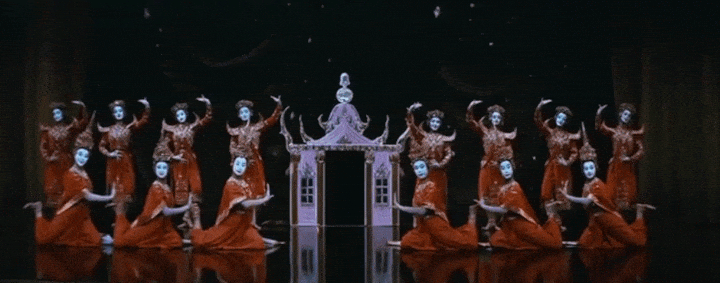
Editing: 9/10
It’s very well done and well-paced! No complaints, and few comments for this particular category. Credit to Robert Simpson, and to Carlton Falkner for sound recording (which is very well done, especially for the 1950s)!

The Songbook: 9/10
And here we are again, because this songbook is wonderful...for the most part. Where Singin’ in the Rain has a 100% iconic songbook, this one is...less so. It’s like 90% iconic. The instrumental scores are great, and the memorable songs are memorable. I’ve had “Shall We Dance” stuck in my brain for DAYS since I’ve seen this film, and “Getting to Know You”, “Whistle a Happy Tune”, and “A Puzzlement” are all very memorable parts of the score as well.
And the rest...eh? I feel like I should like both “Something Wonderful" and “Hello, Young Lovers" a lot more than I do, and while they’re good songs, I don’t remember them. Like, AT ALL. Completely wiped from my memory. And I literally forgot about “We Kiss in a Shadow” until typing this! Honestly, this might just be a me thing, but...eh?

88%, et cetera, et cetera, et cetera.
I do think this is a good movie, and I’m glad that I’ve seen it! However...it’s not in my top 5 live-action musicals. Yeah, sorry. It is good, and I’d be more than happy to watch it again, but it’s not my favorite. Who knows, though? Maybe I’ll watch it down the line and gain some new appreciation for it. I could see that happening with this one.
OK, what’s next on the list of musicals I should’ve seen by now? Let’s do another movie with Marni Nixon ghost-singing, because I can’t think of a better excuse to talk about another musical I should’ve seen by now.
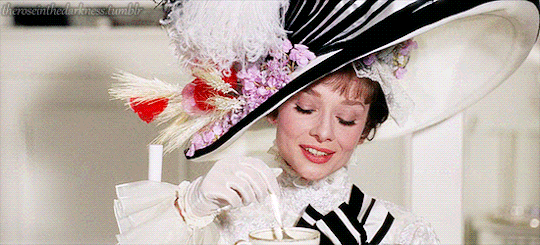
Next: My Fair Lady (1964); dir. George Cukor
#the king and i#the king and i 1952#film:the king and i#walter lang#rodgers and hammerstein#deborah kerr#yul brynner#rita moreno#martin benson#user365#365days365movies#365 movie challenge#movie musical#musical film#musical december#musicember
30 notes
·
View notes